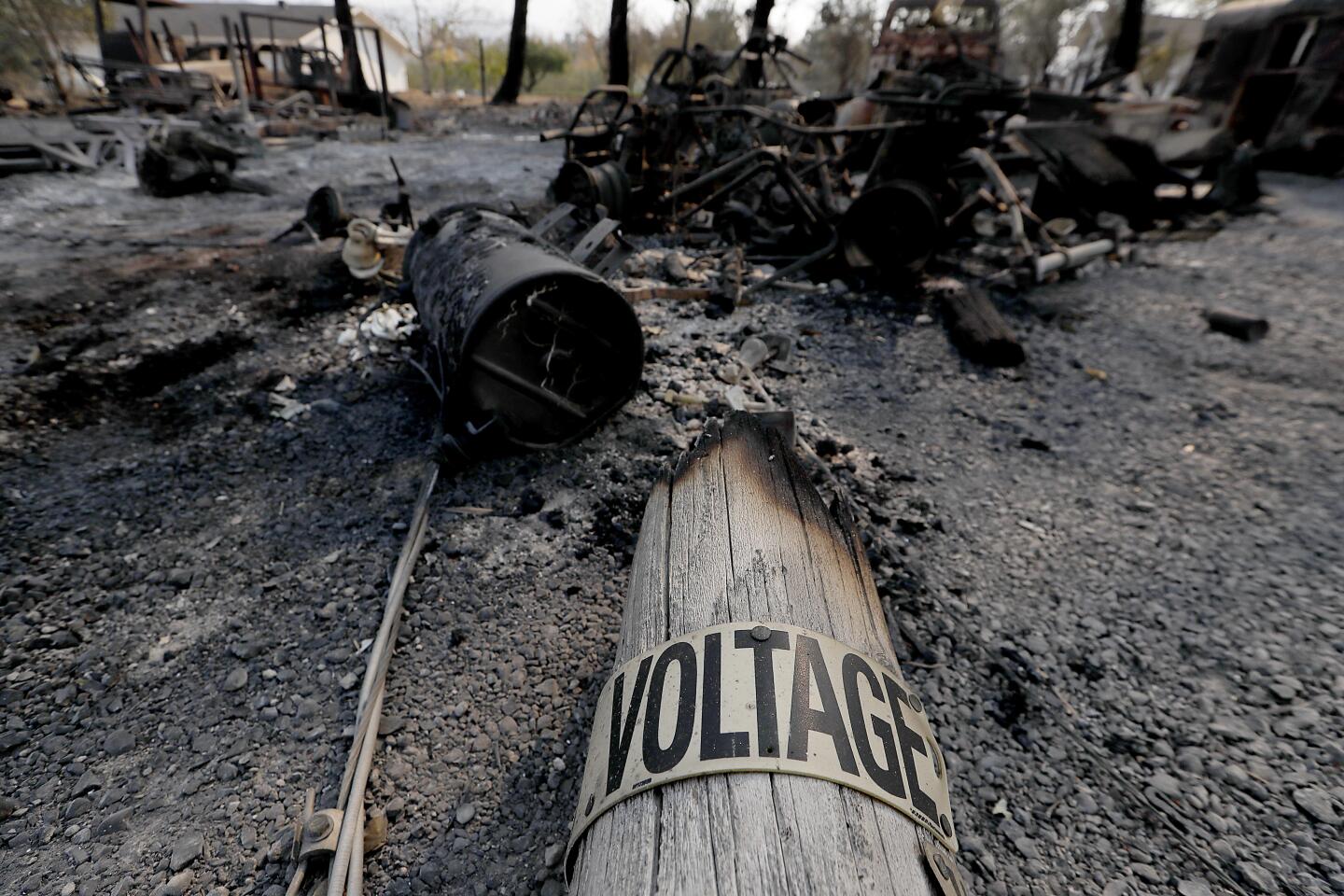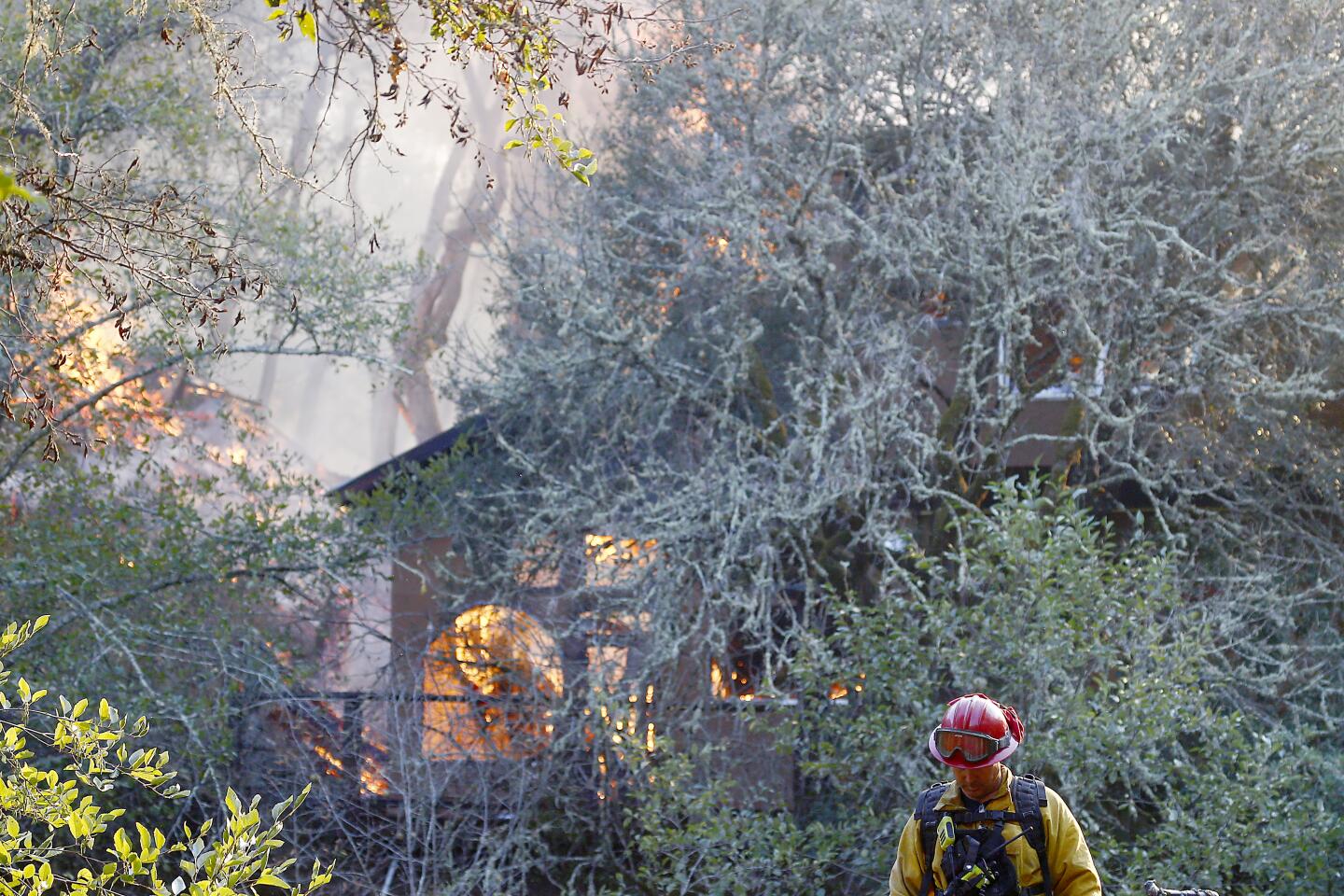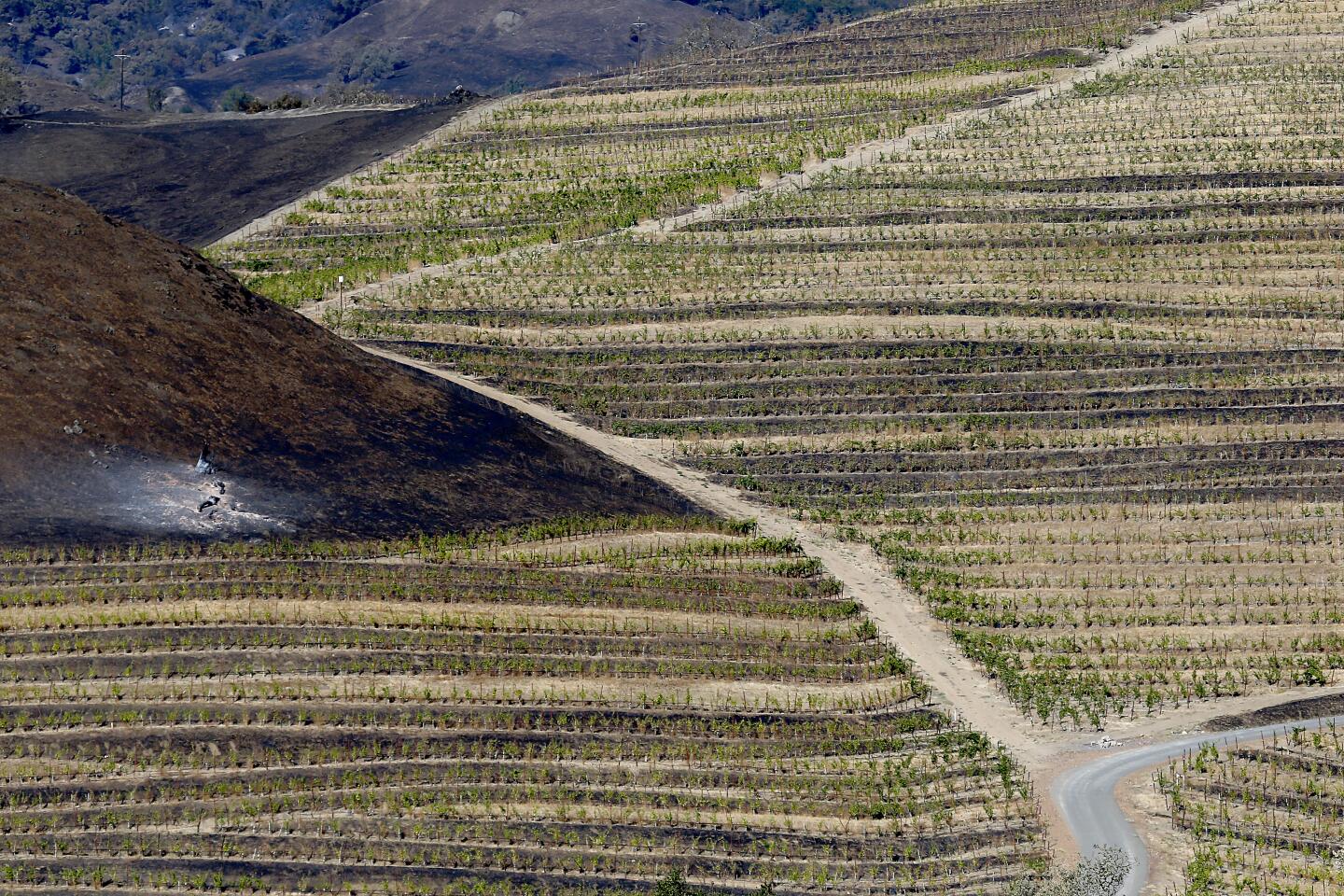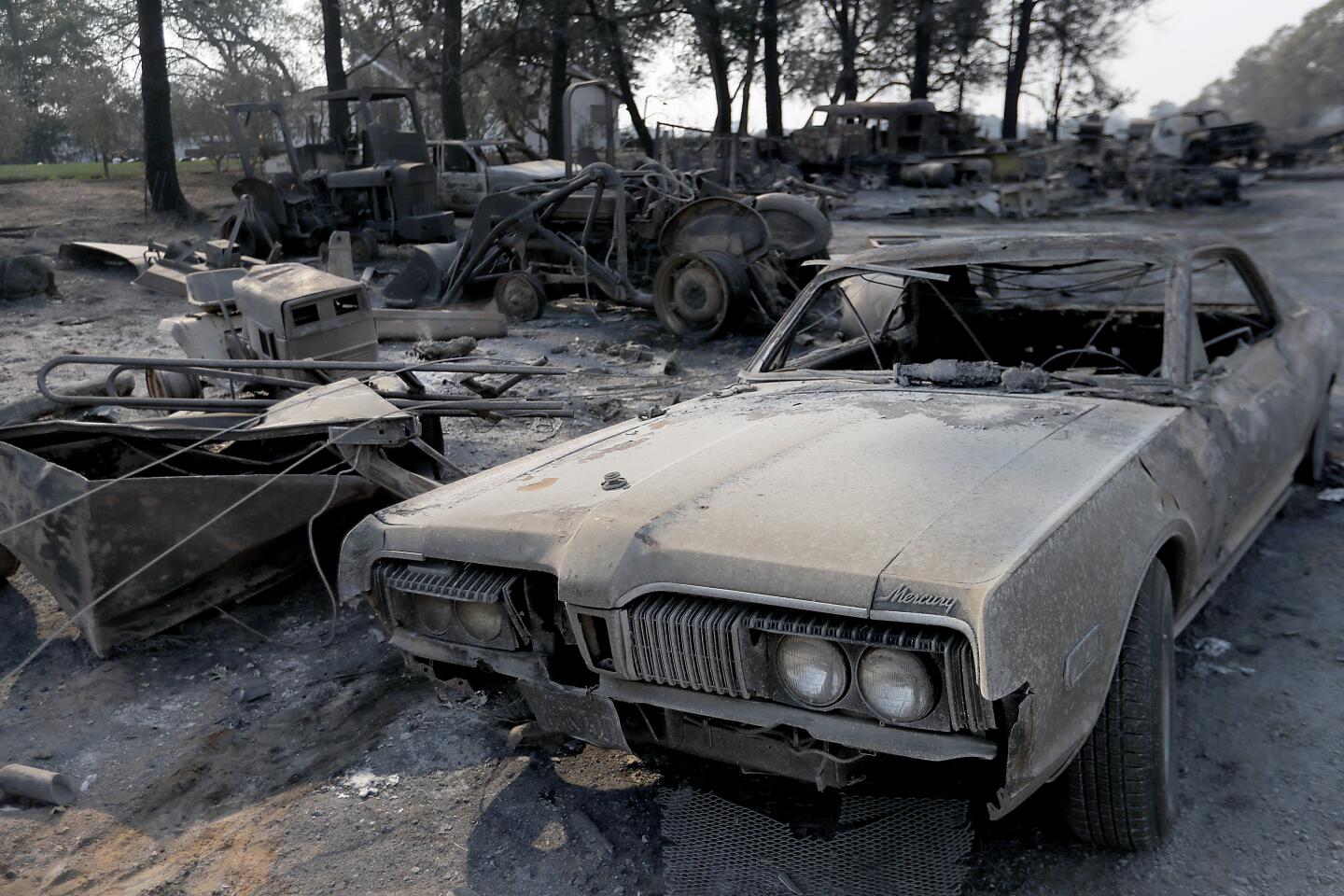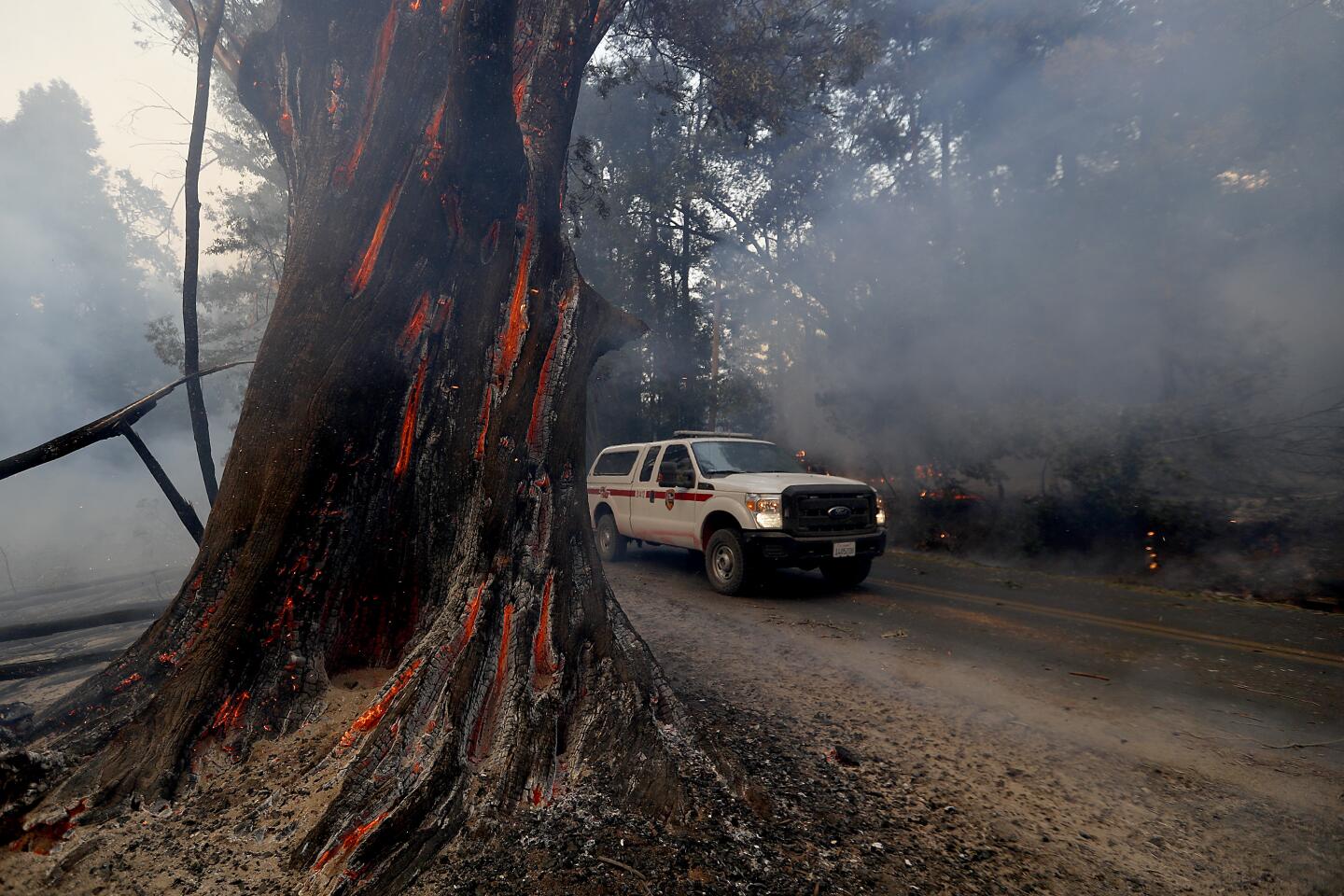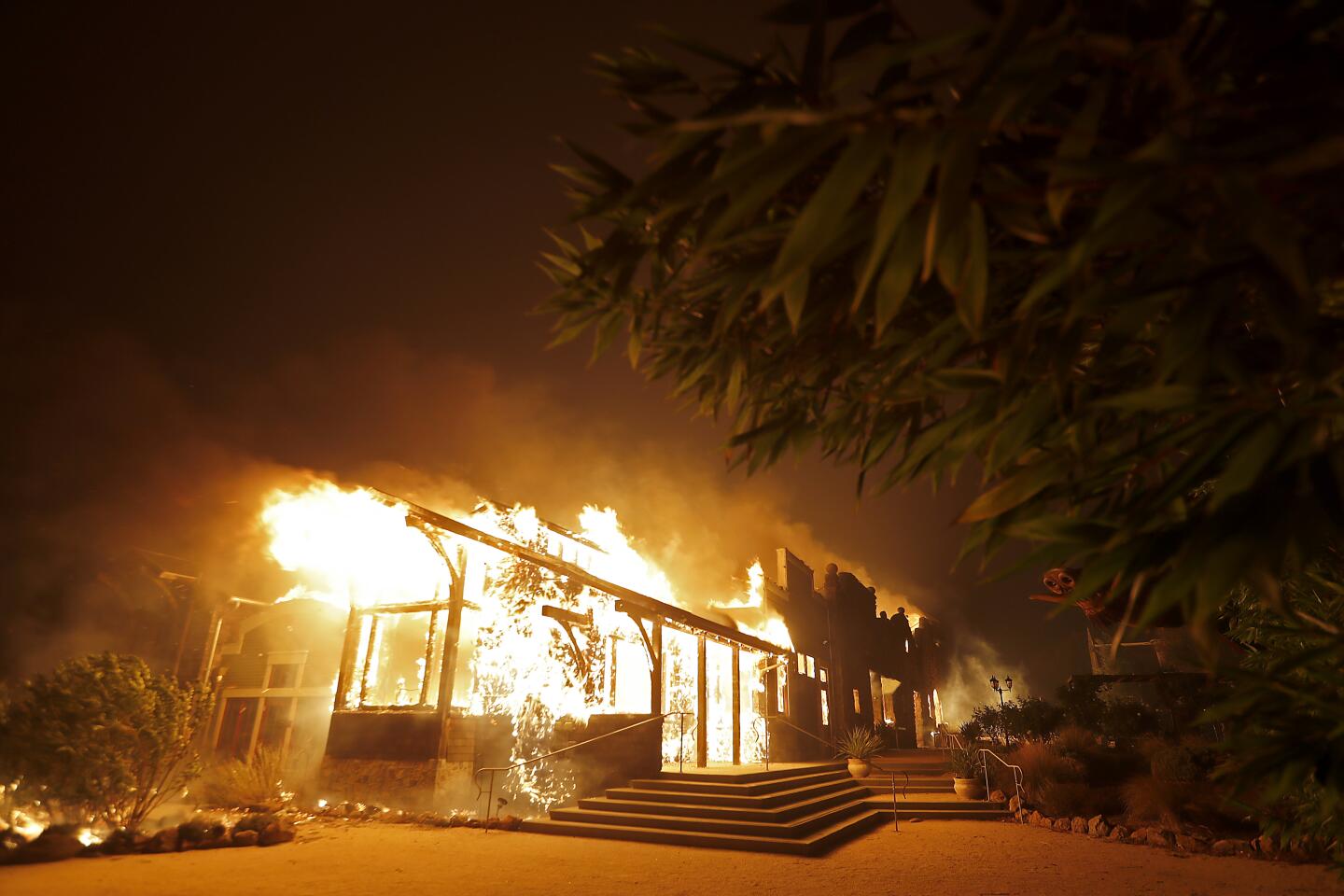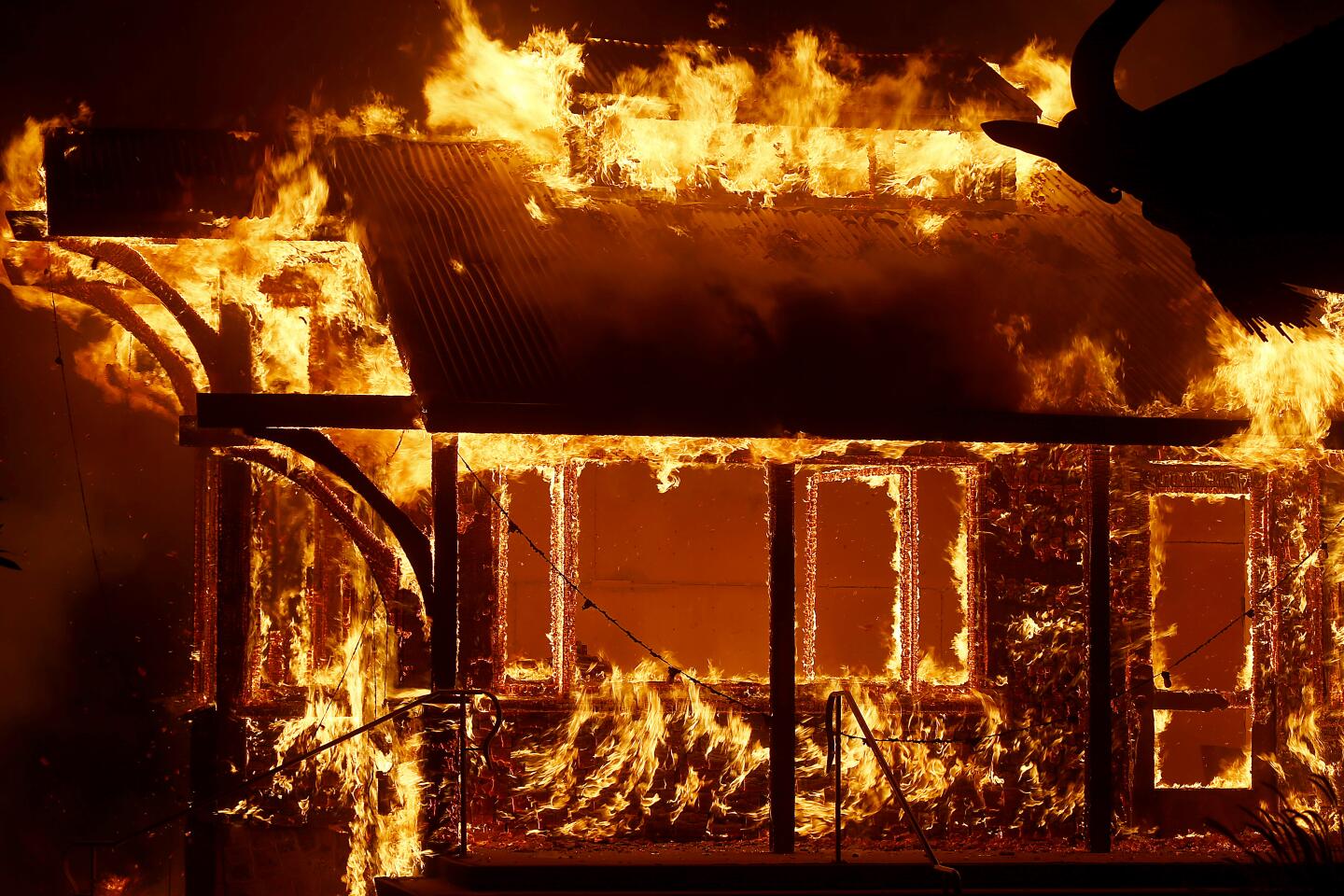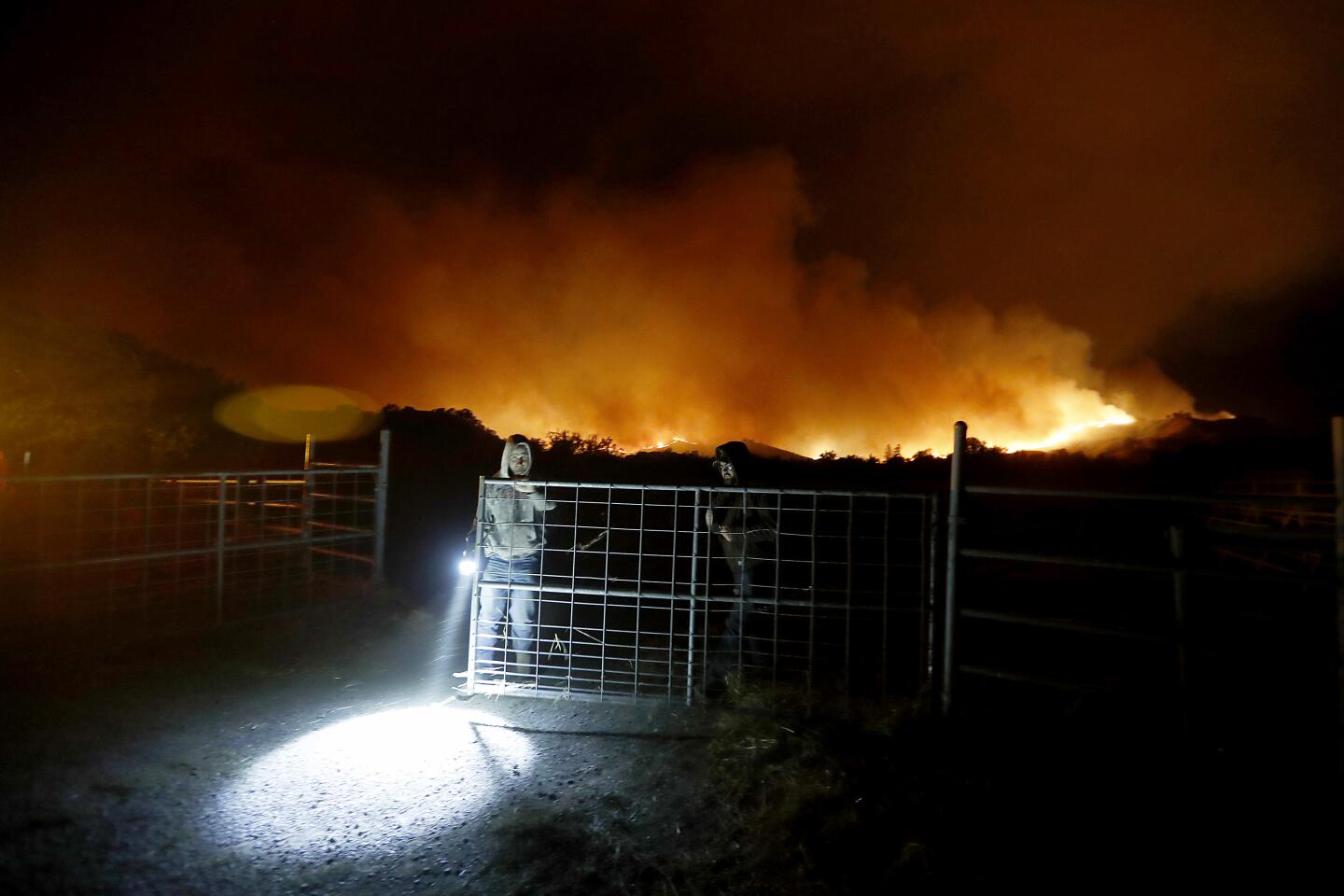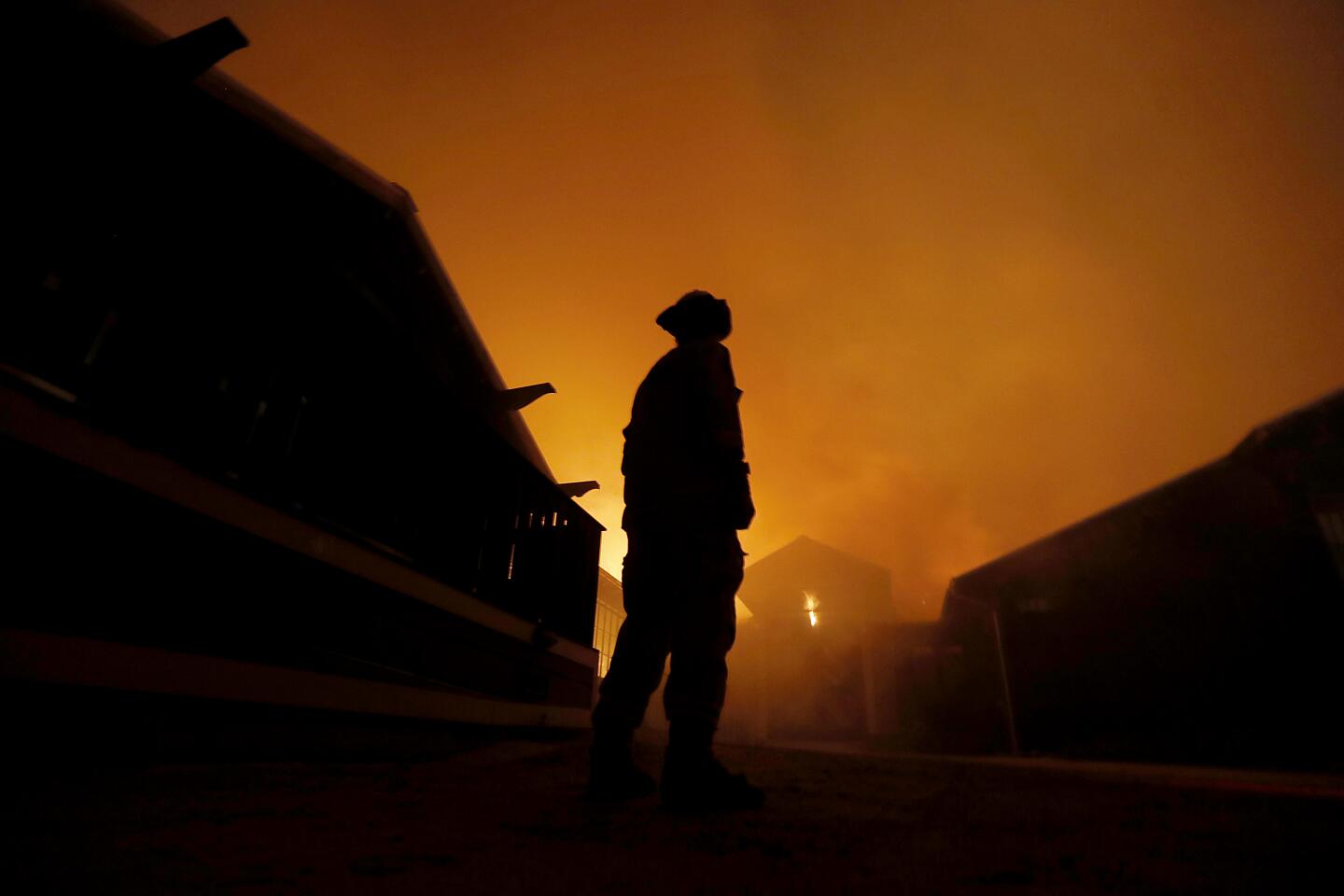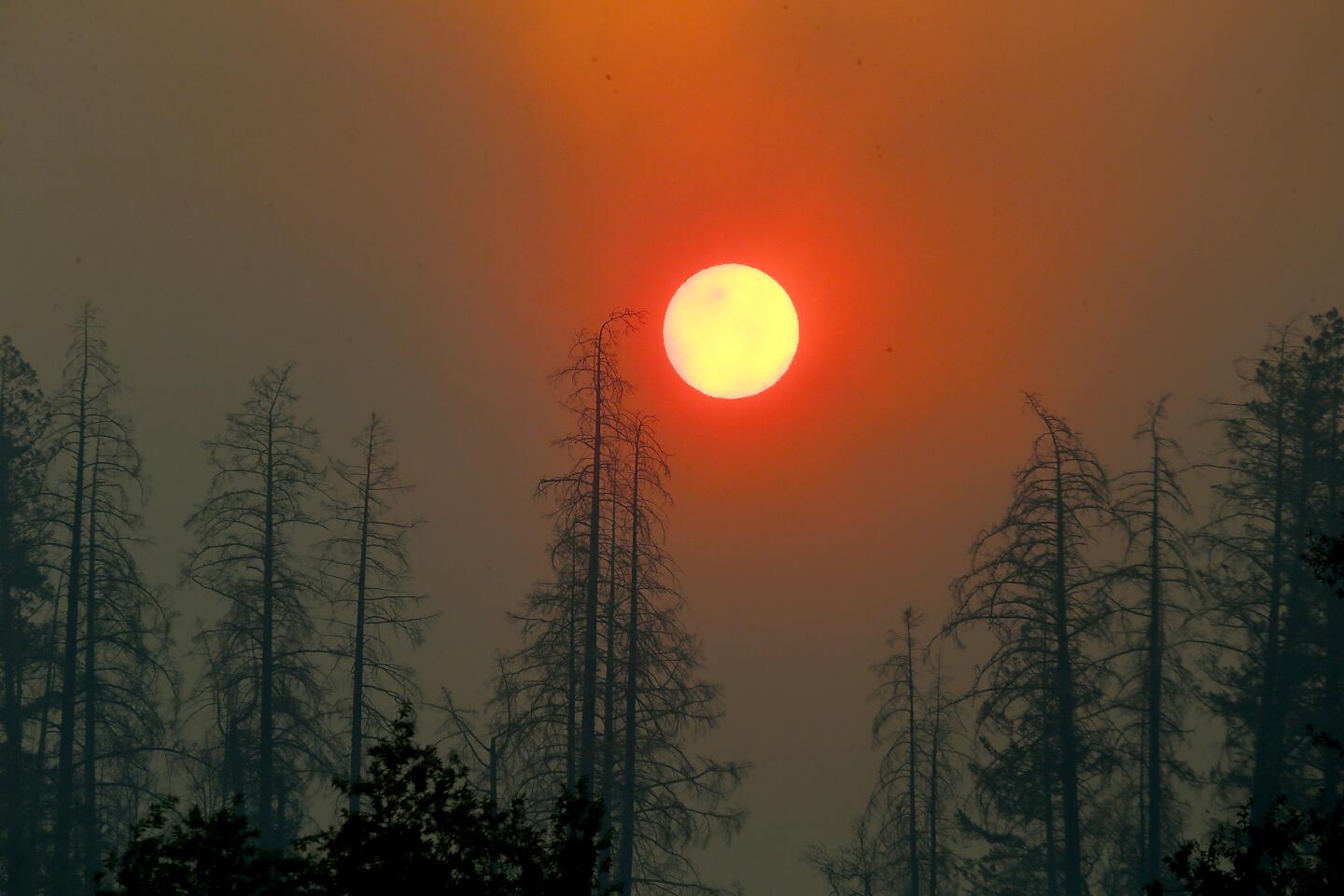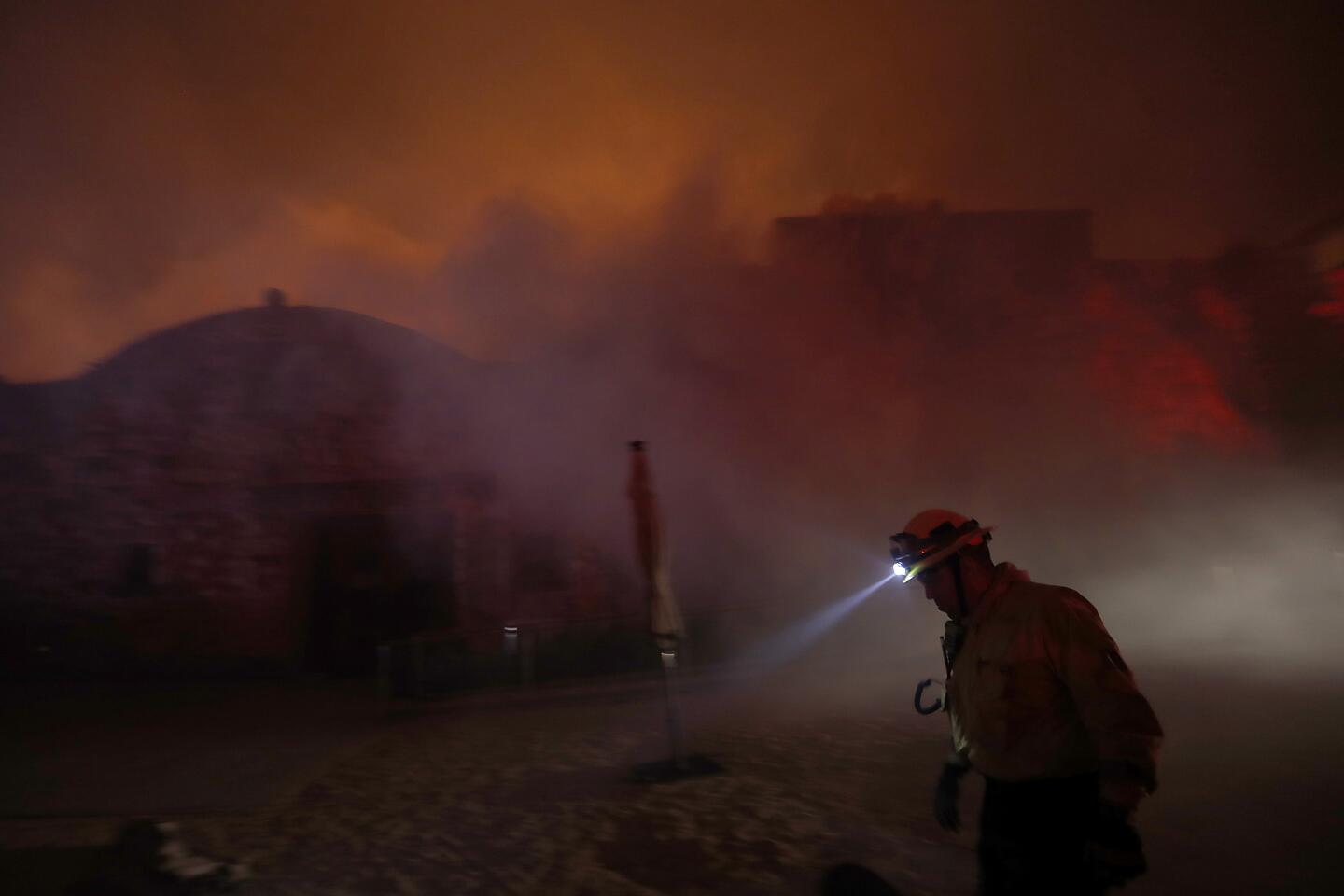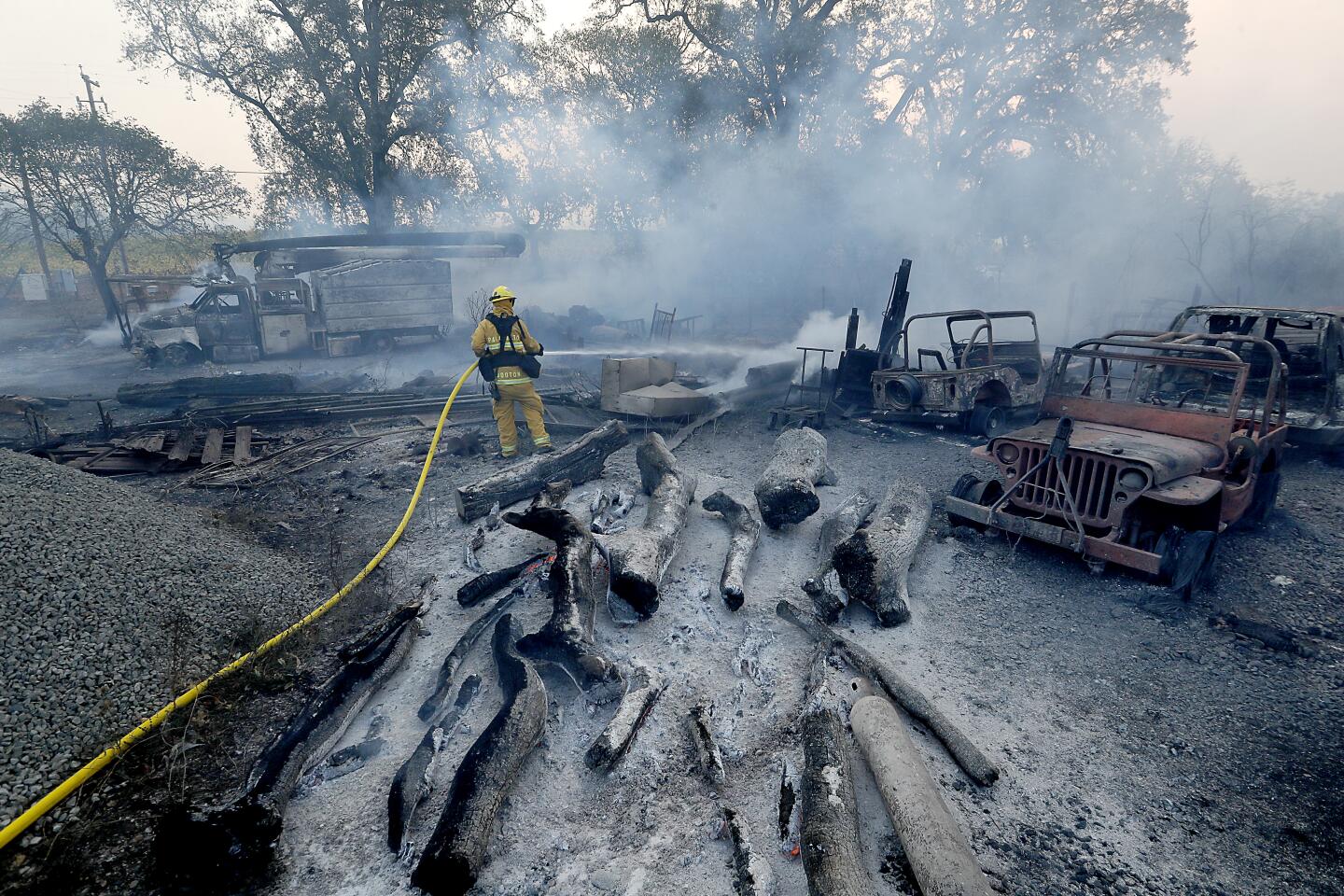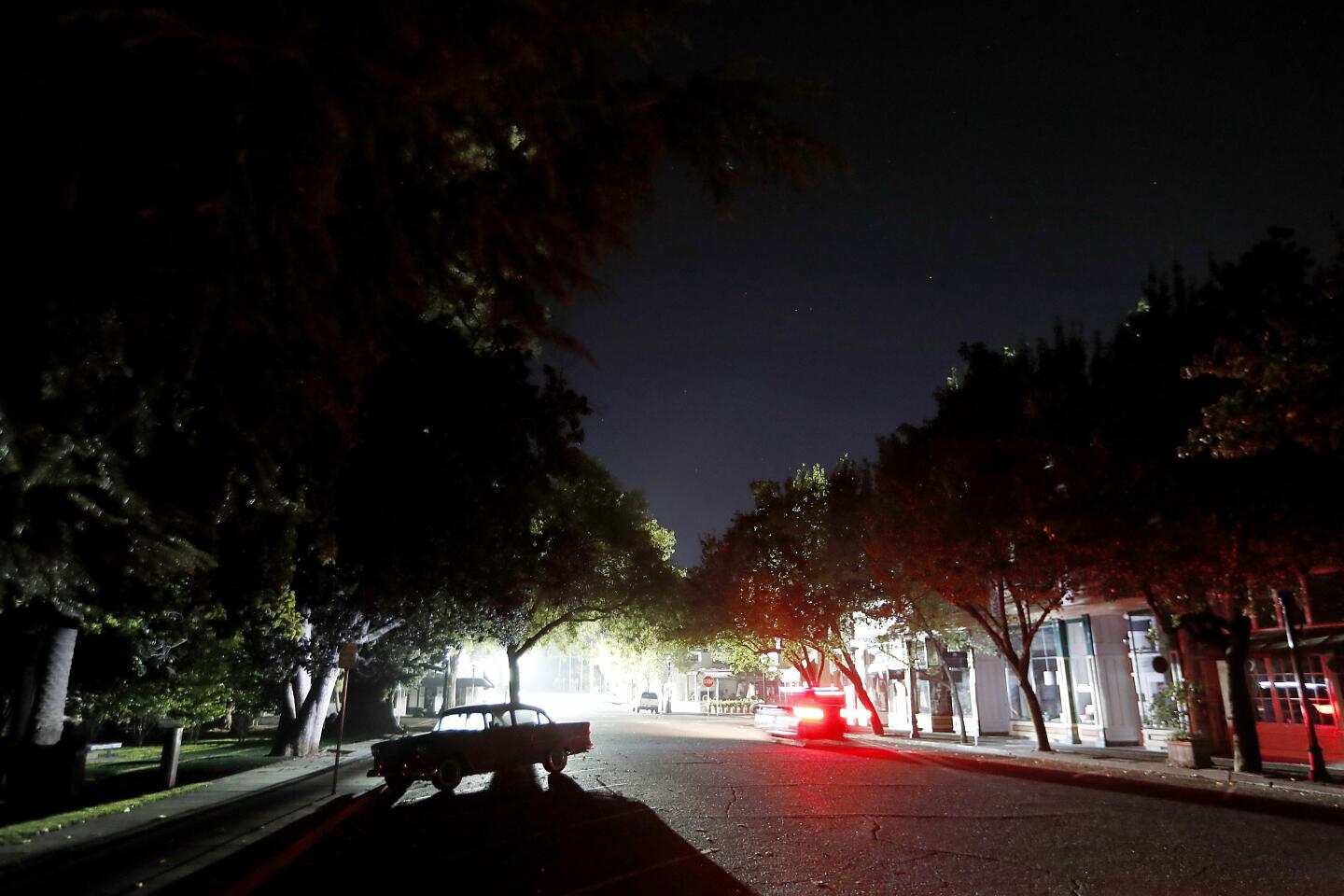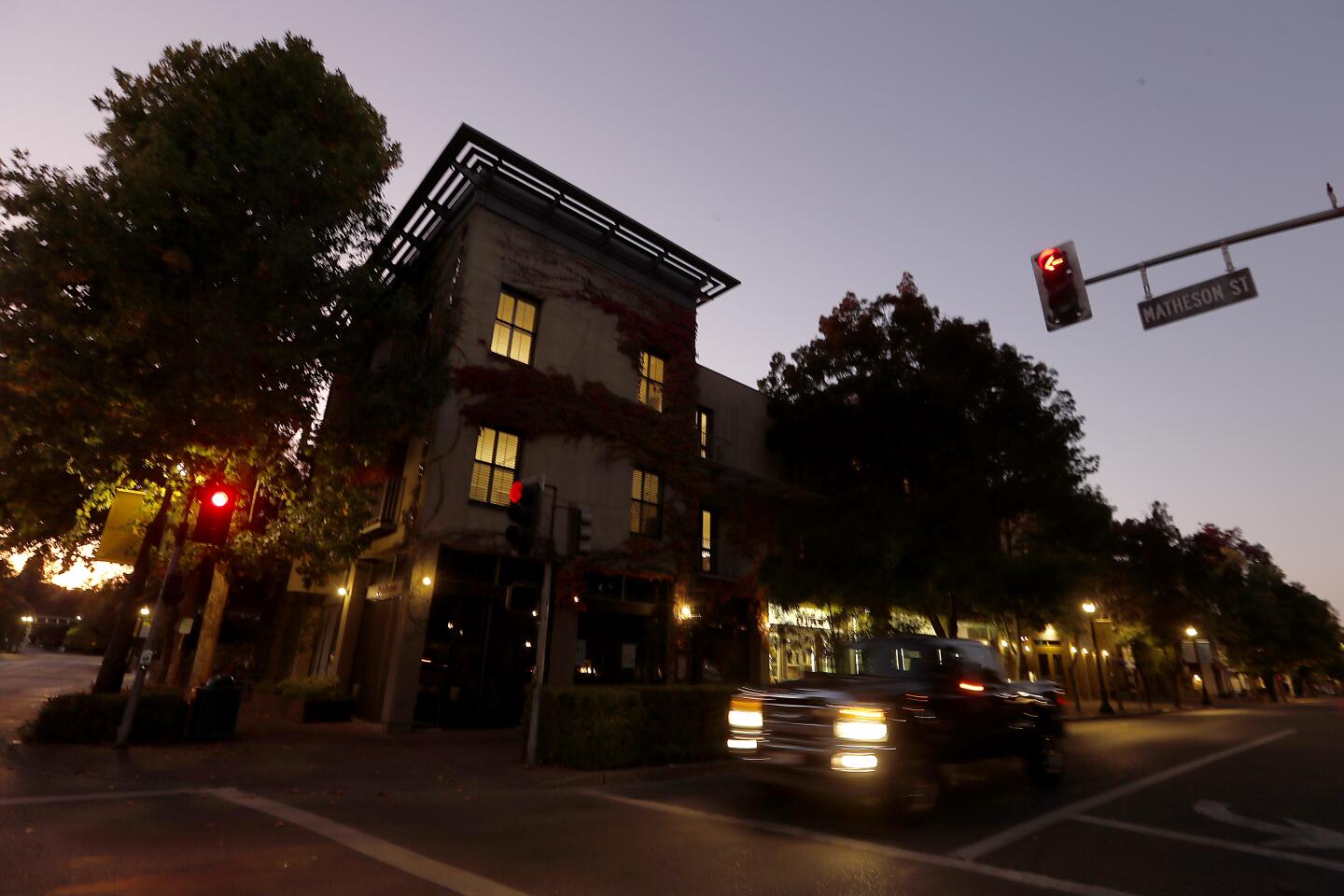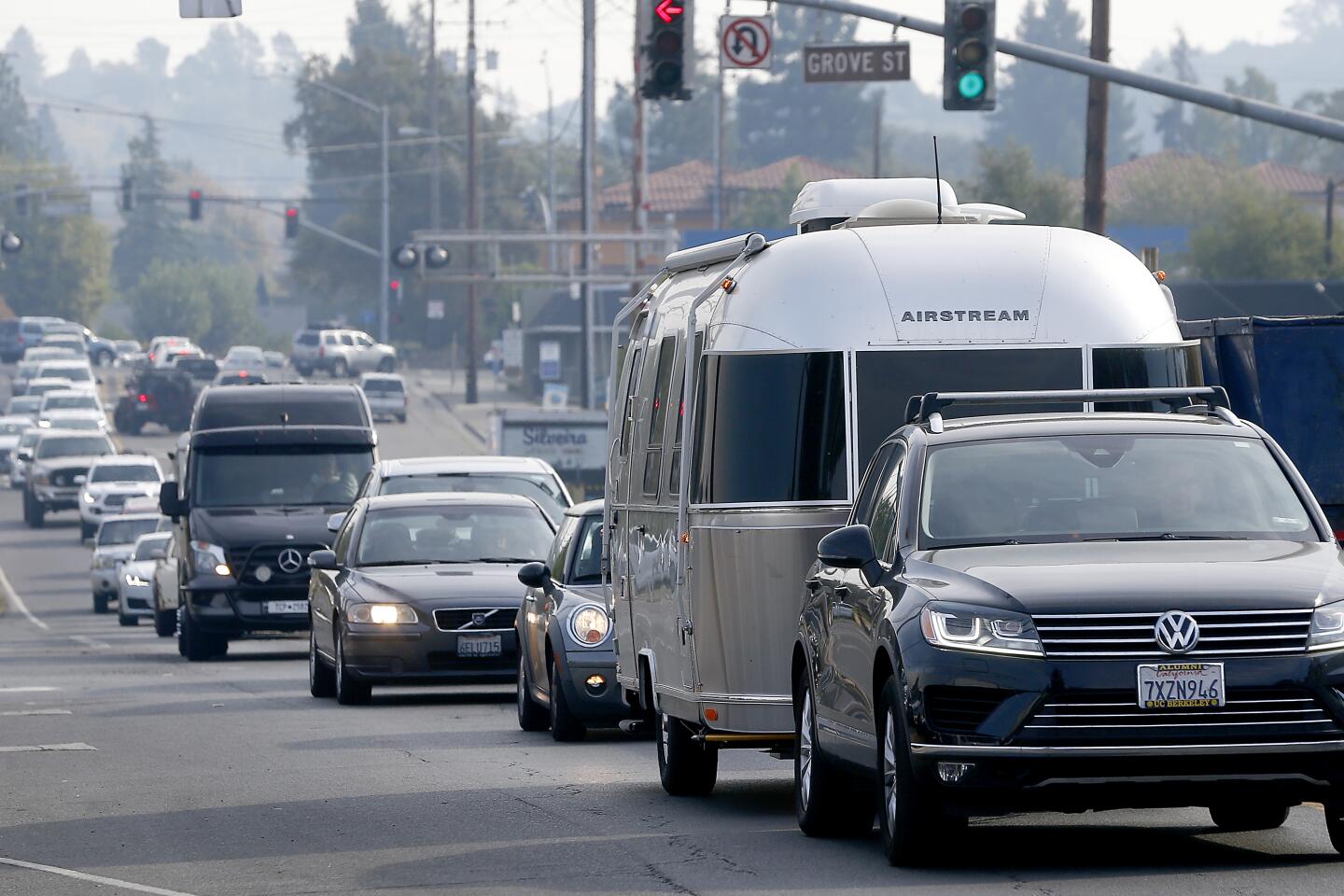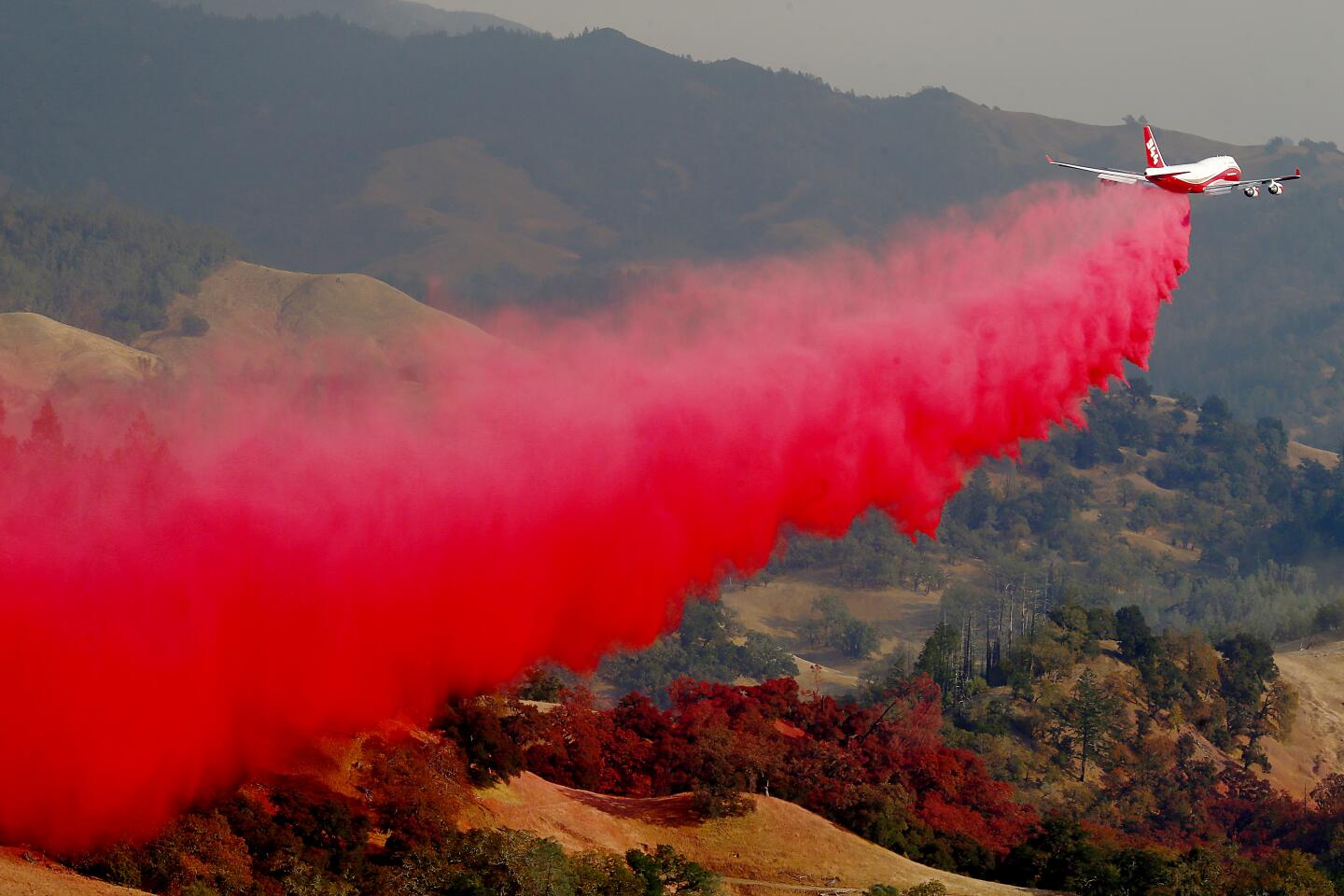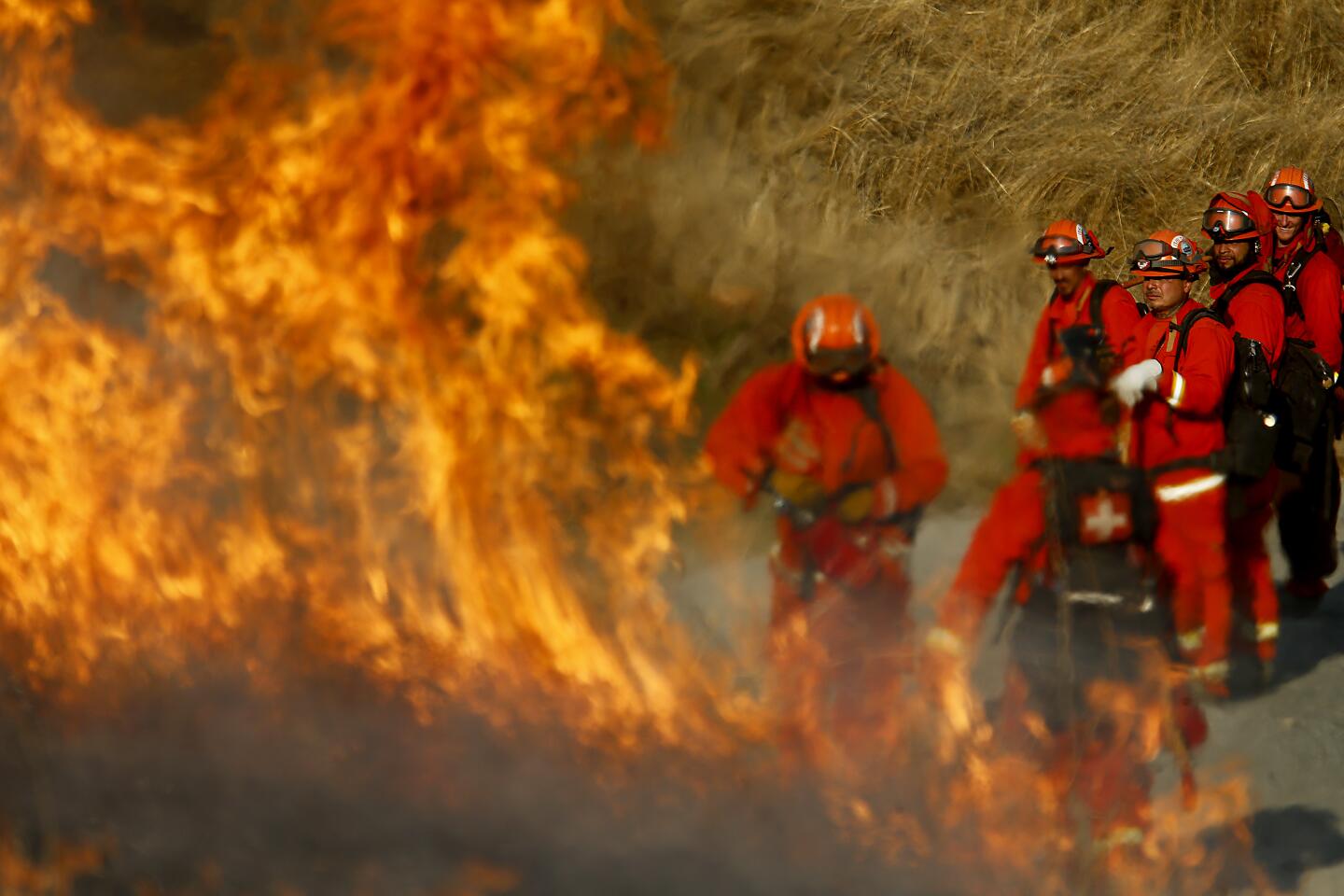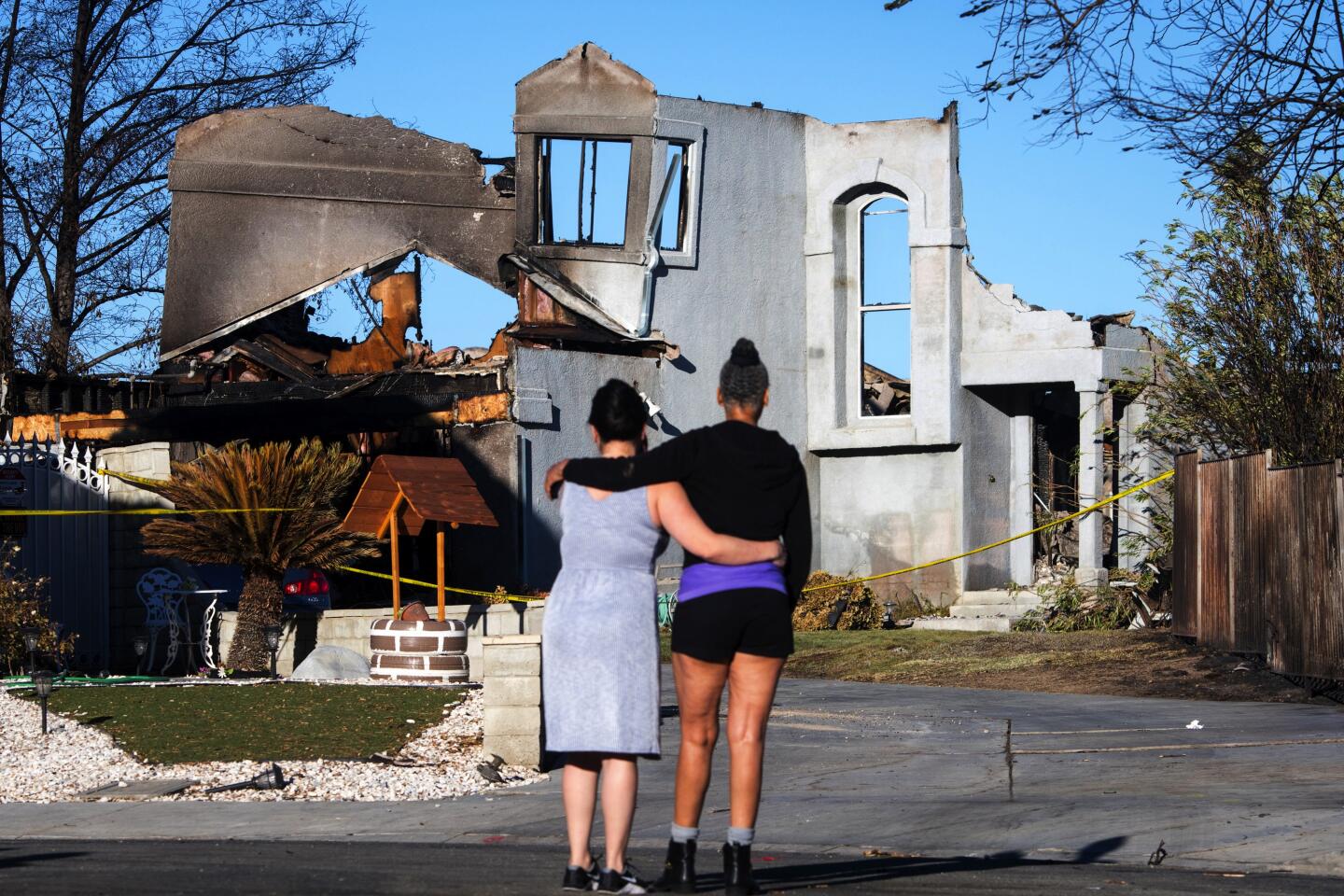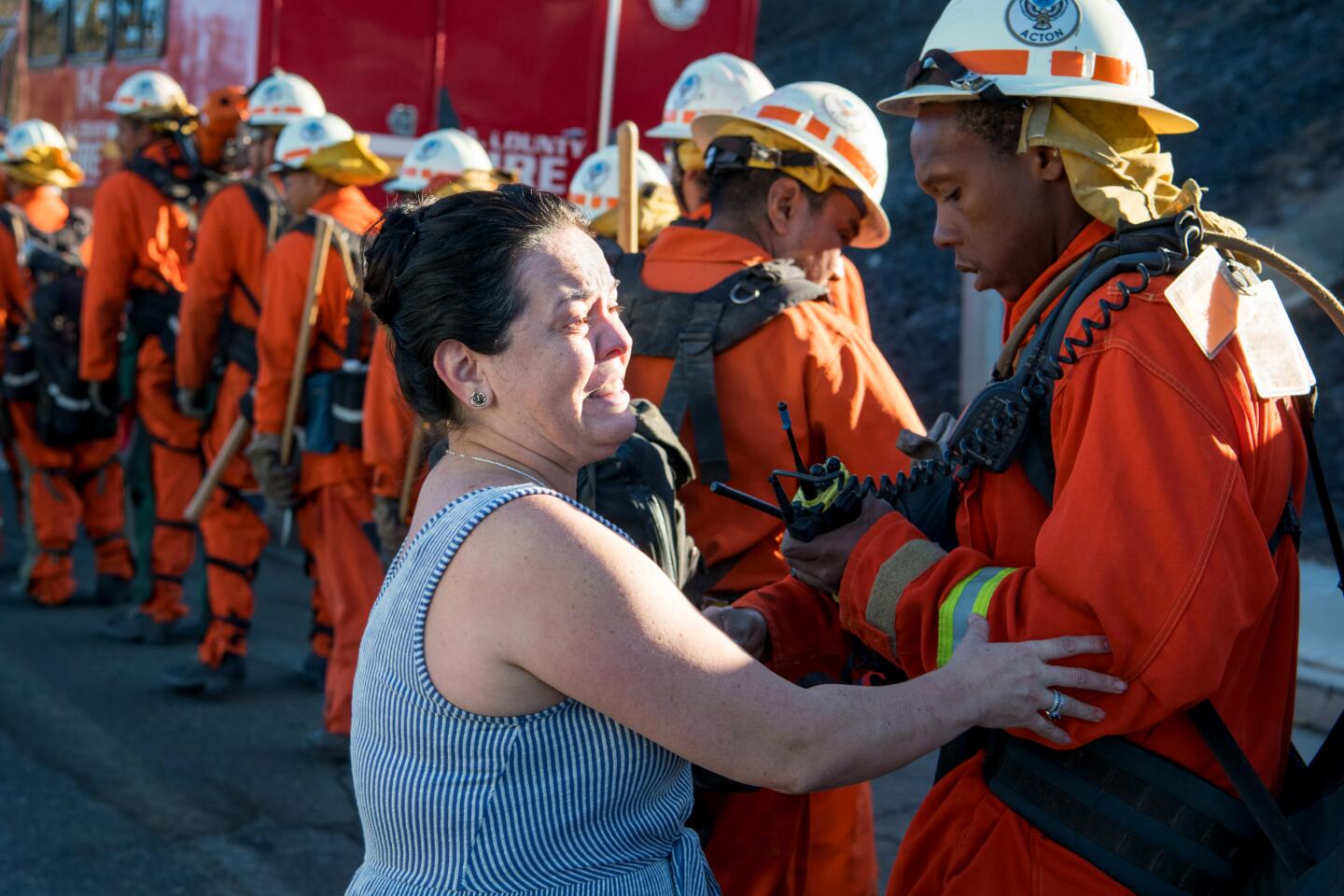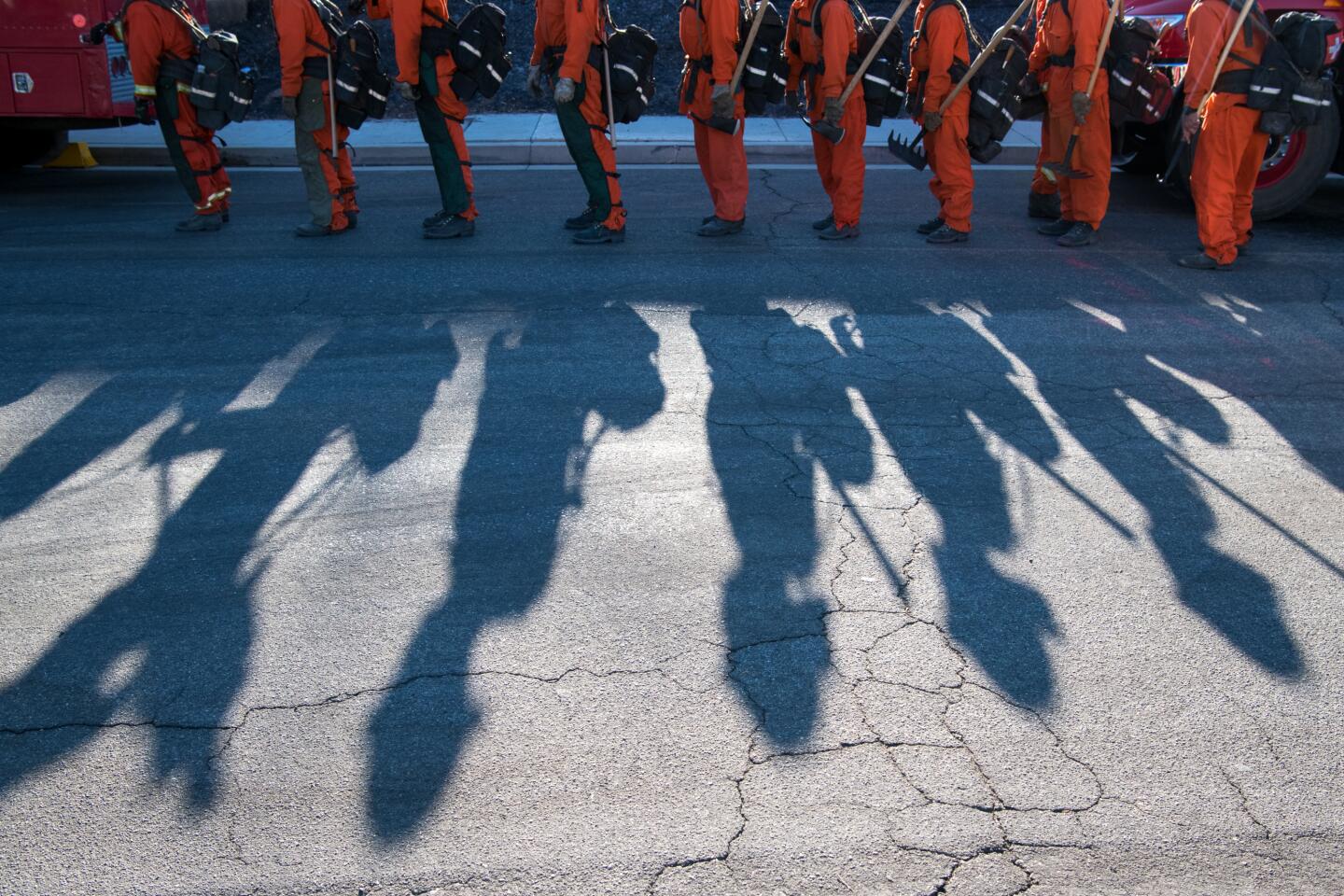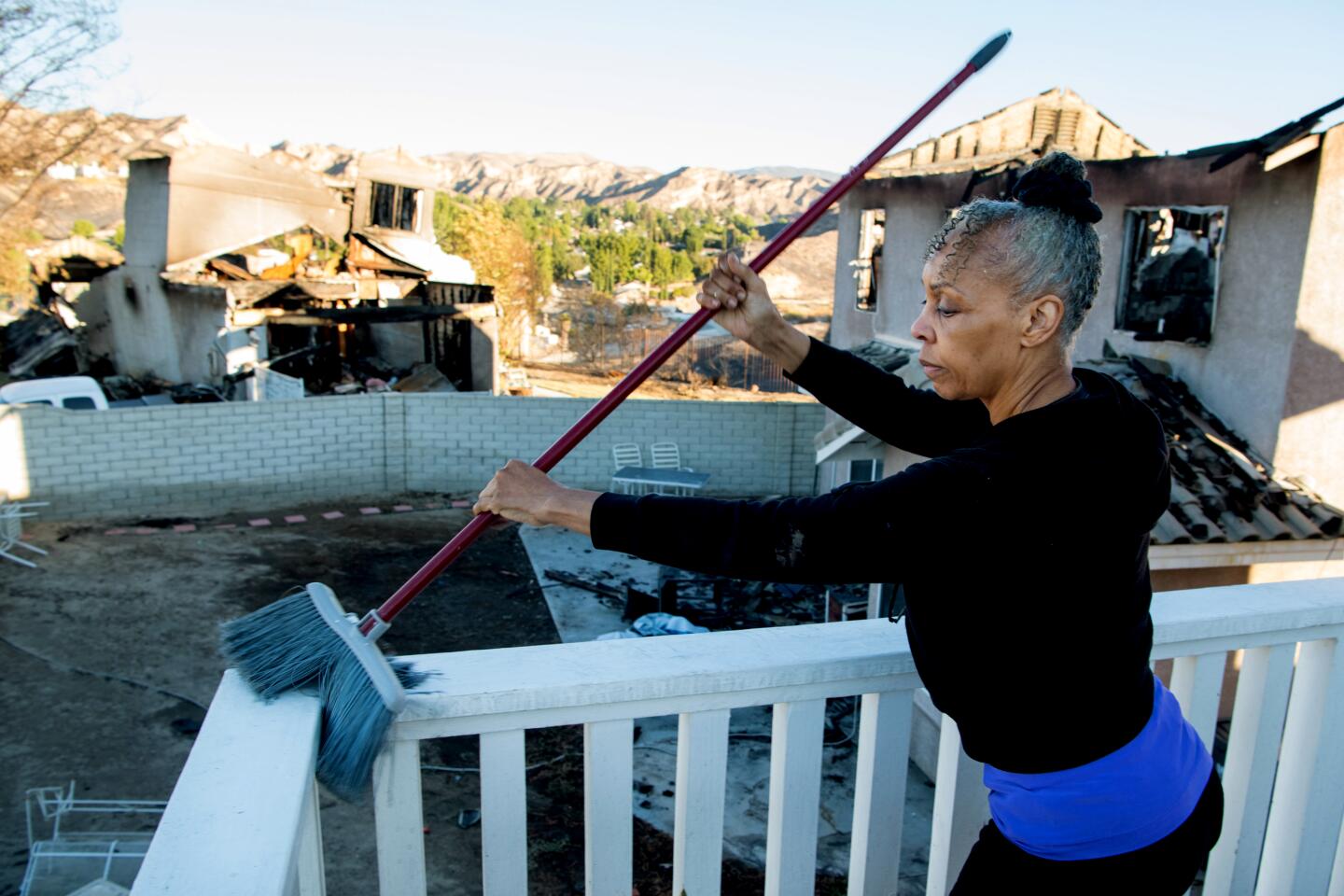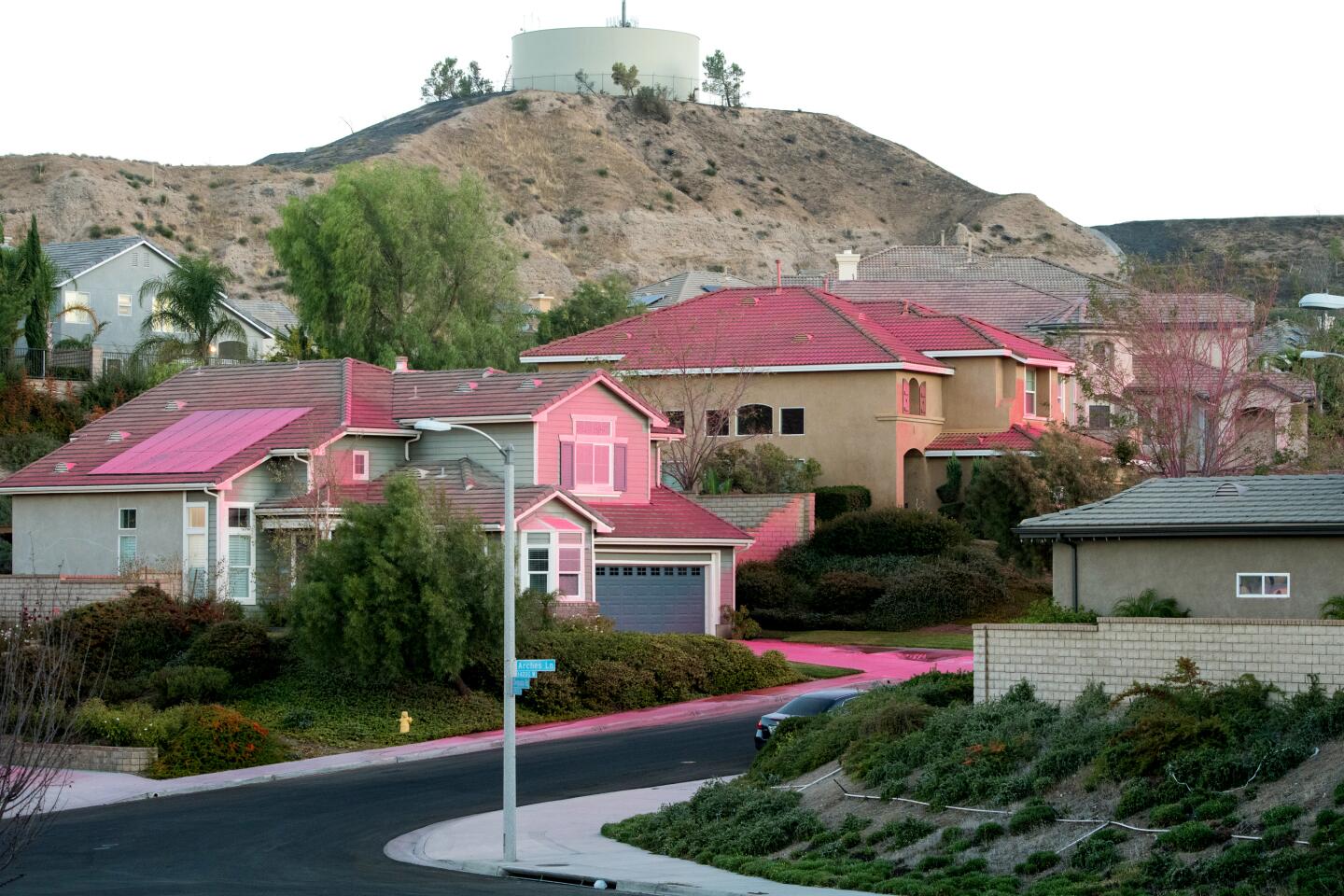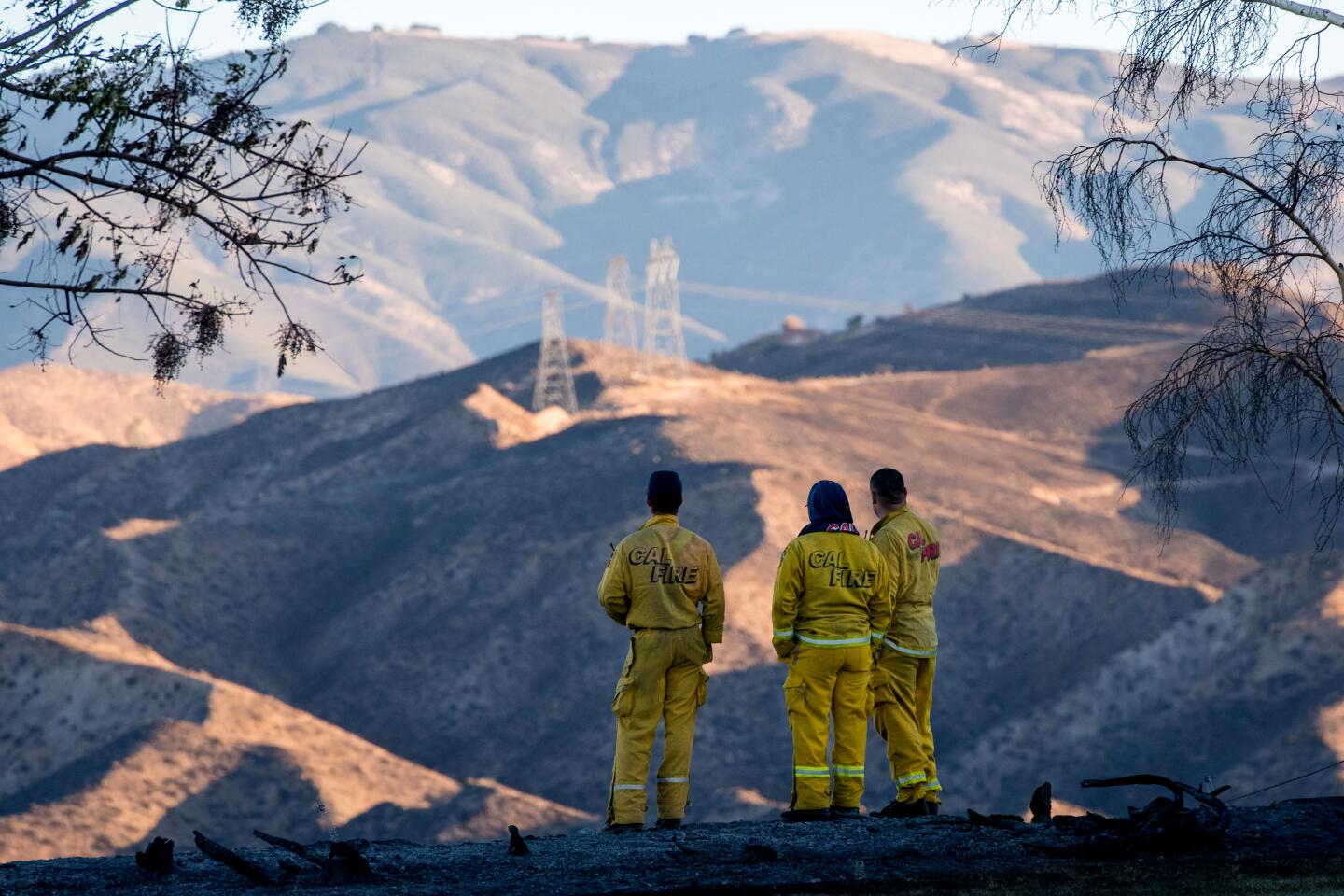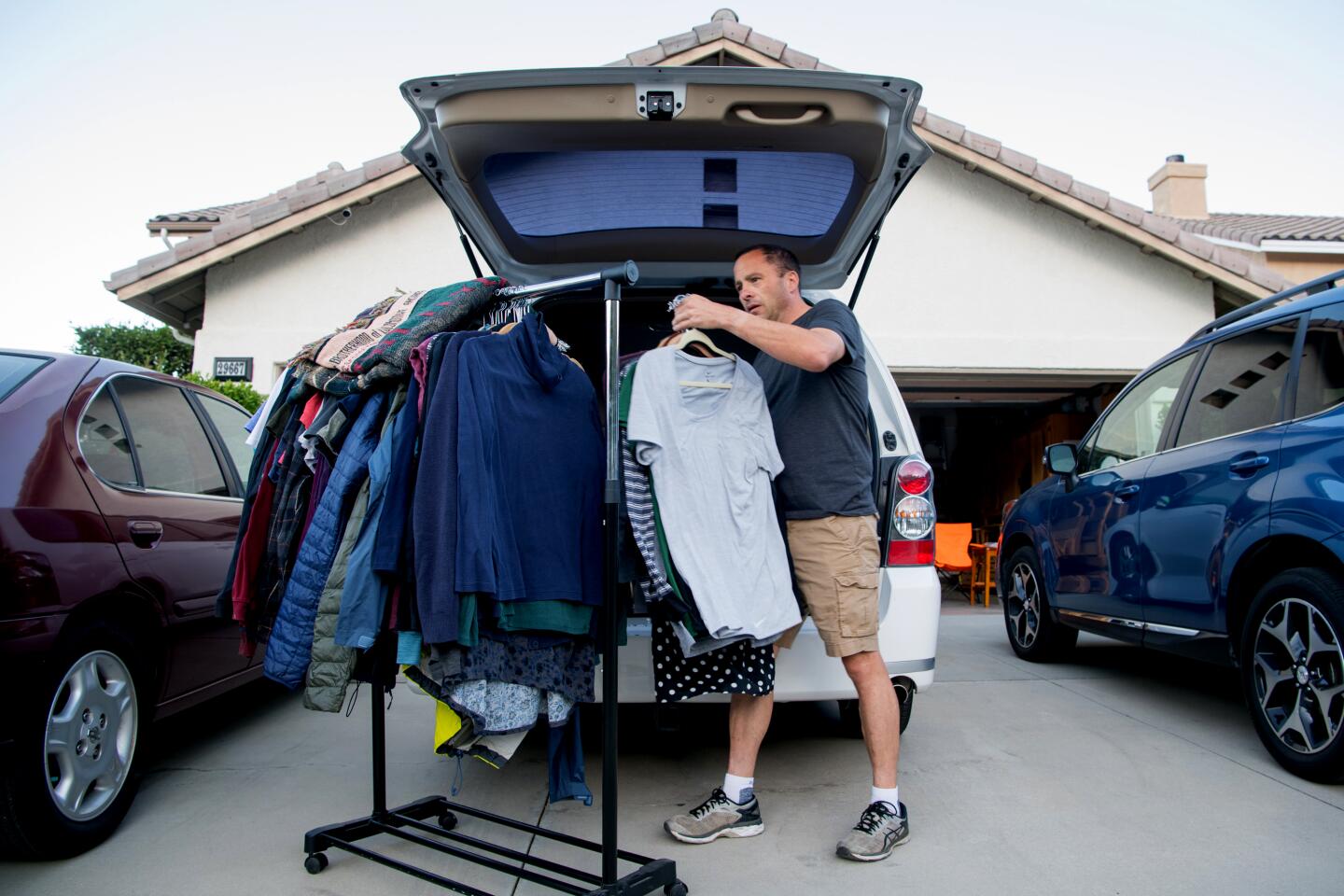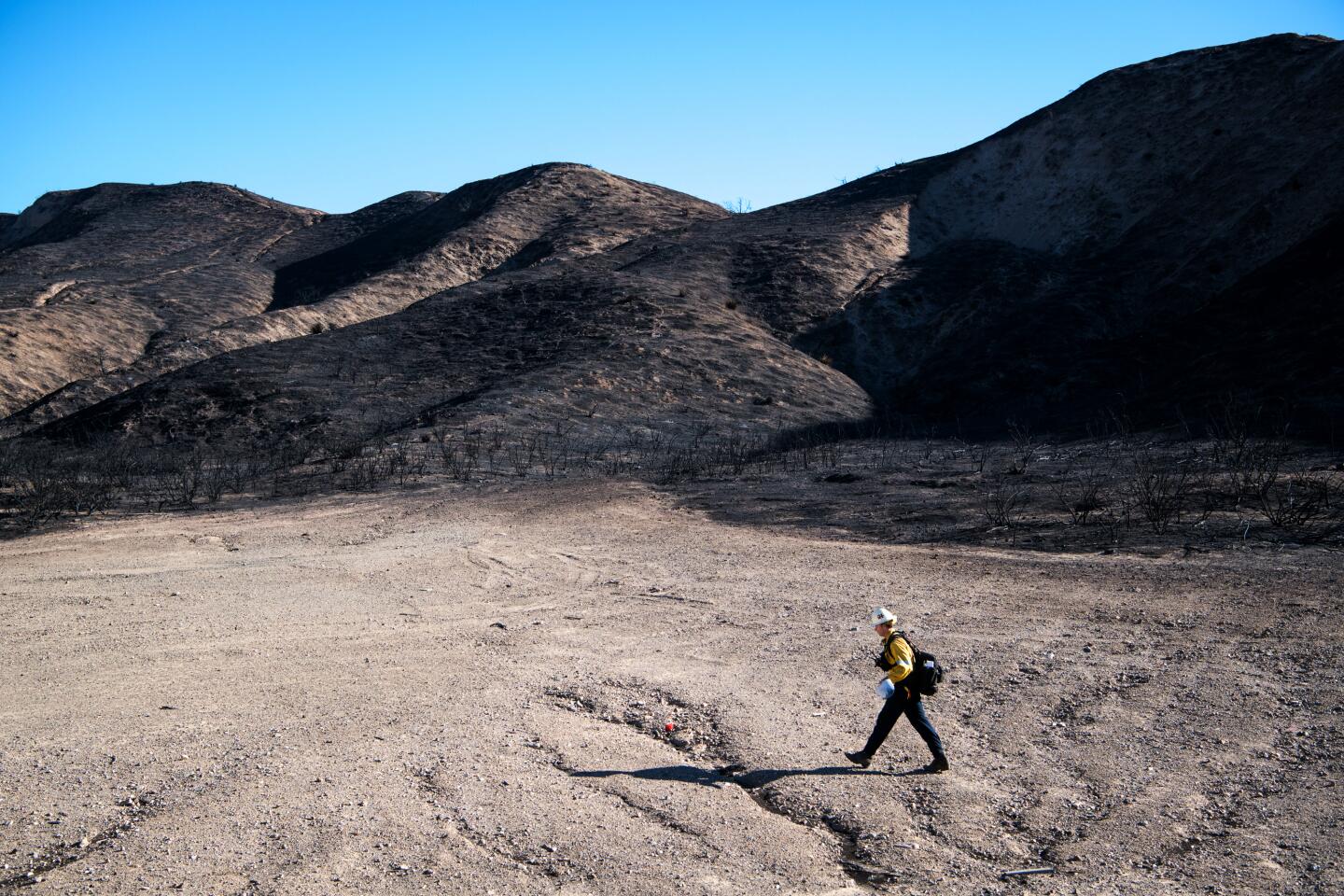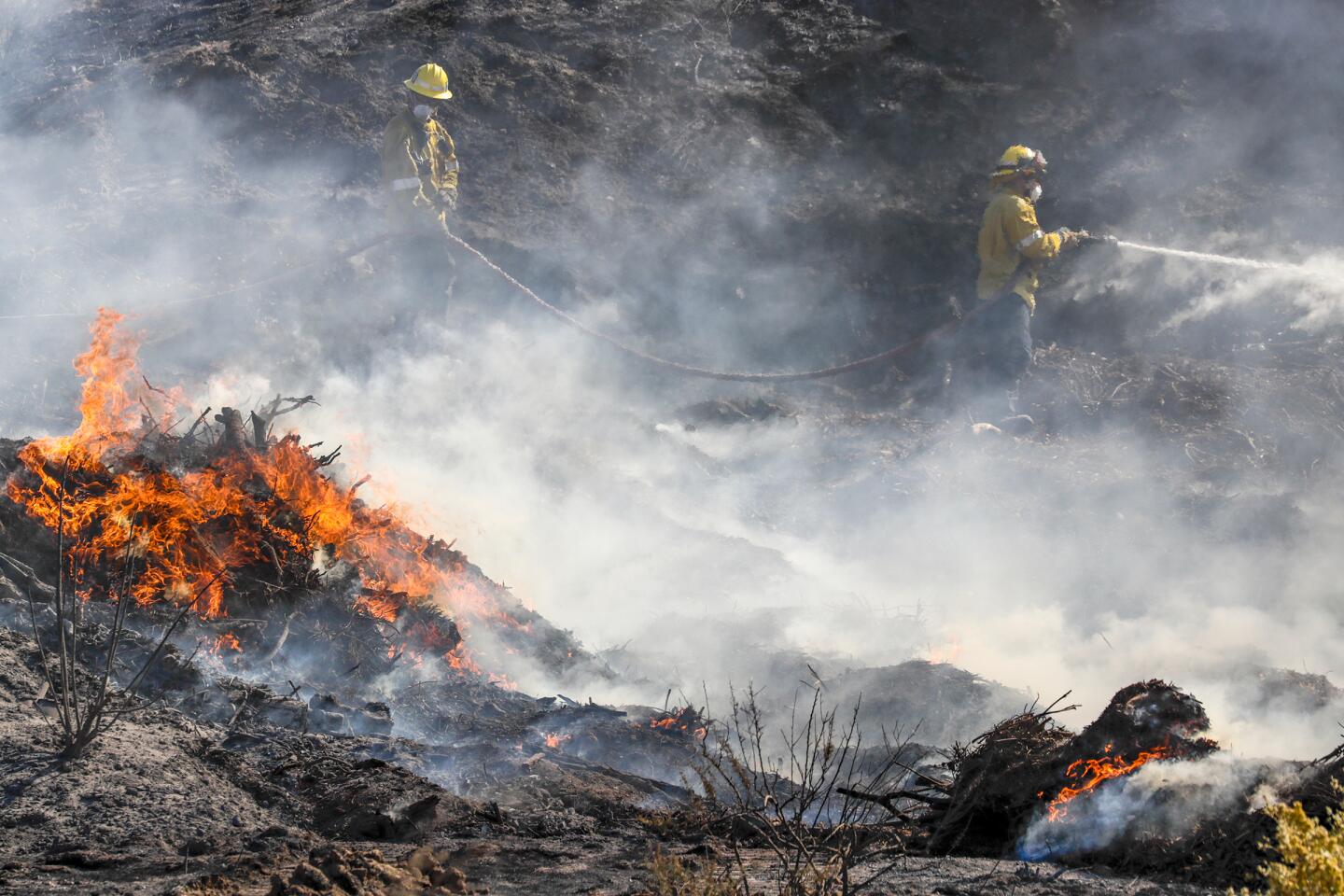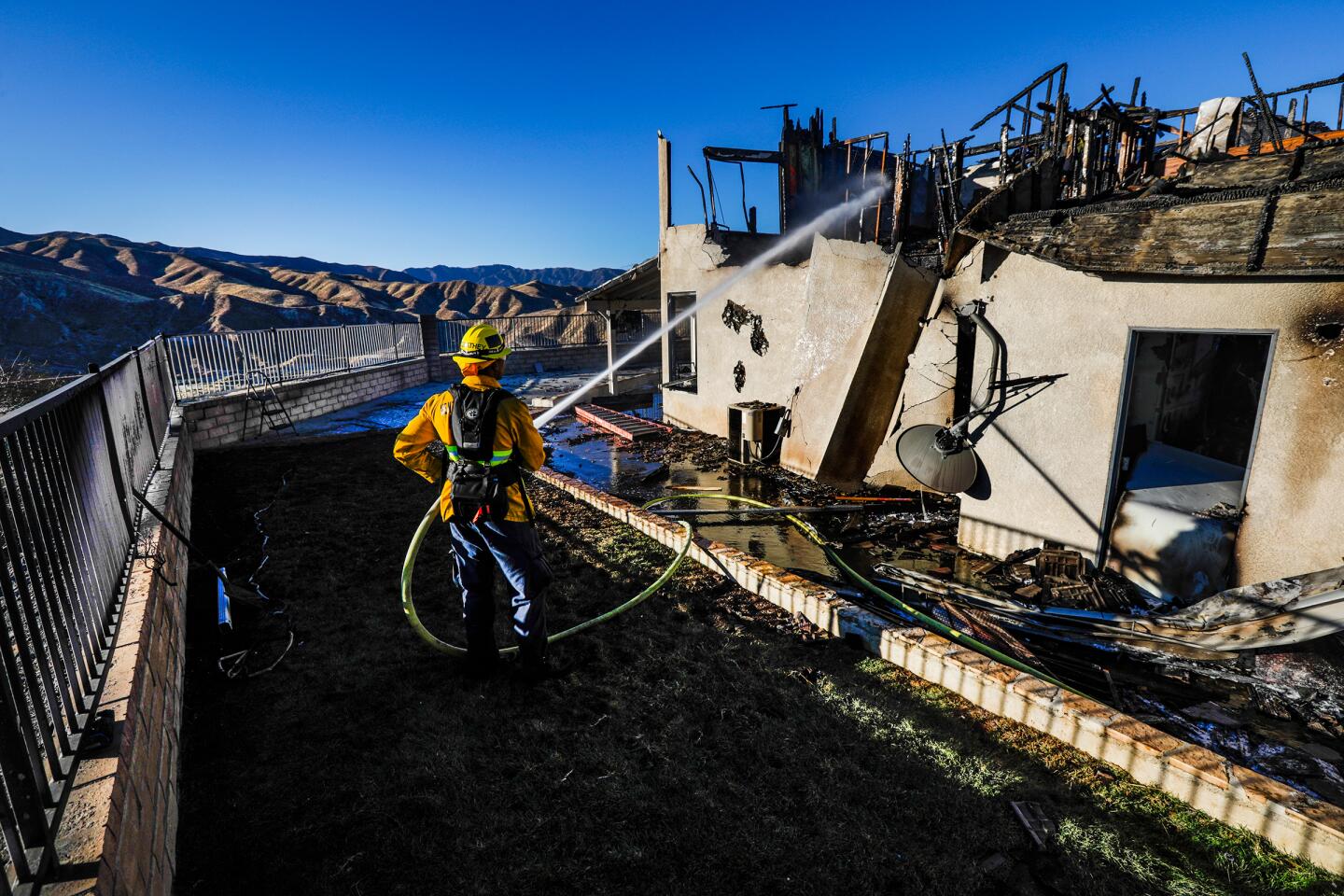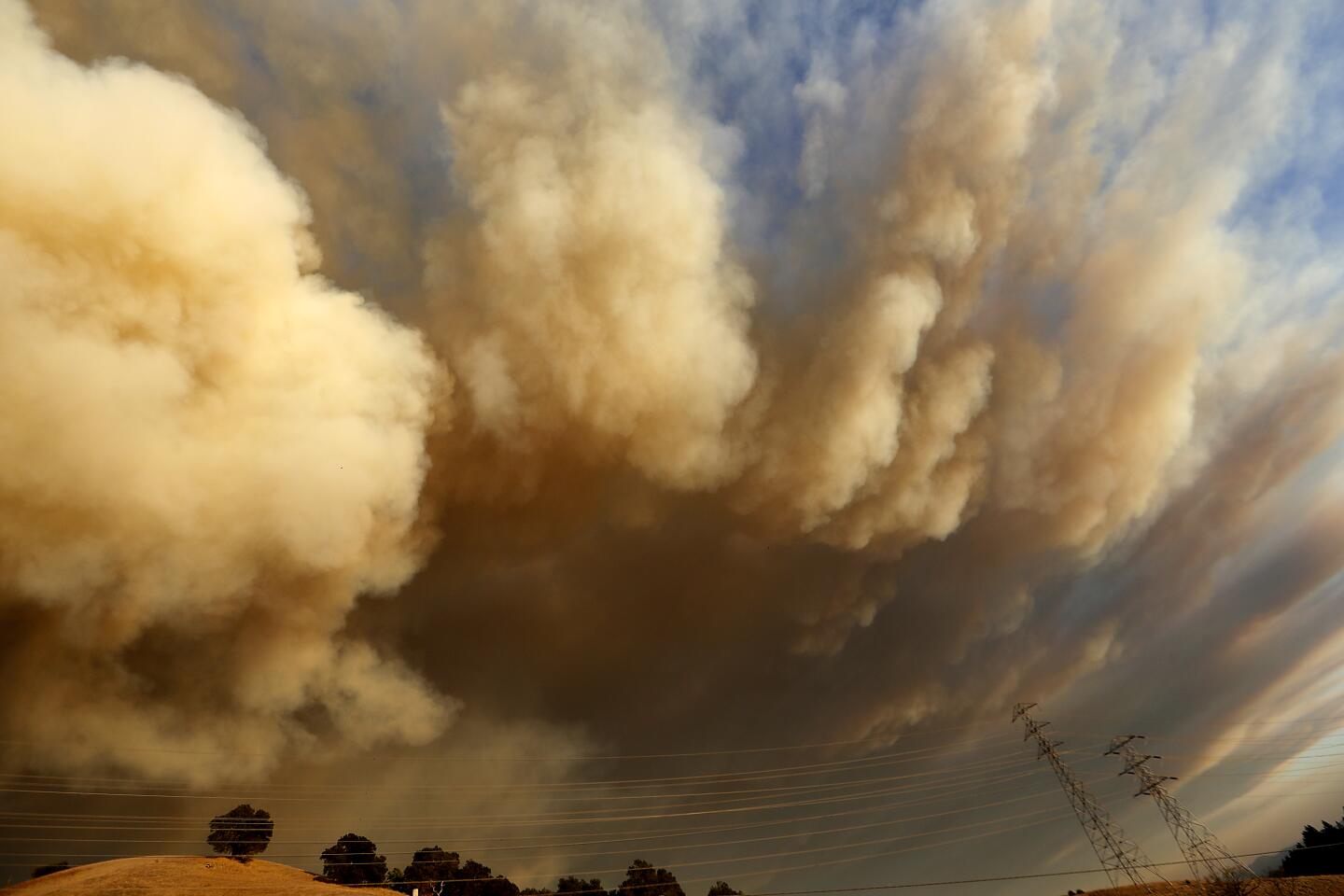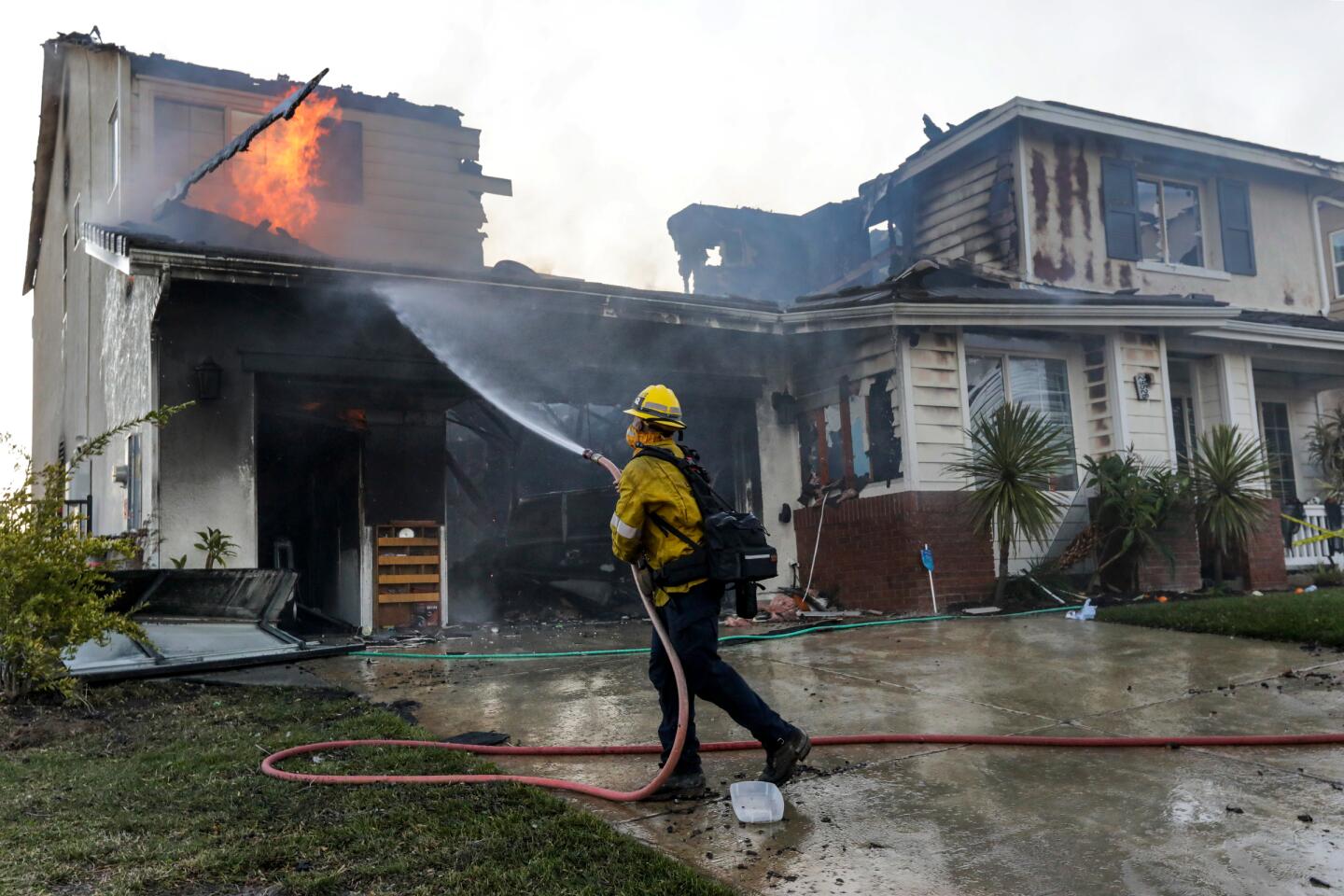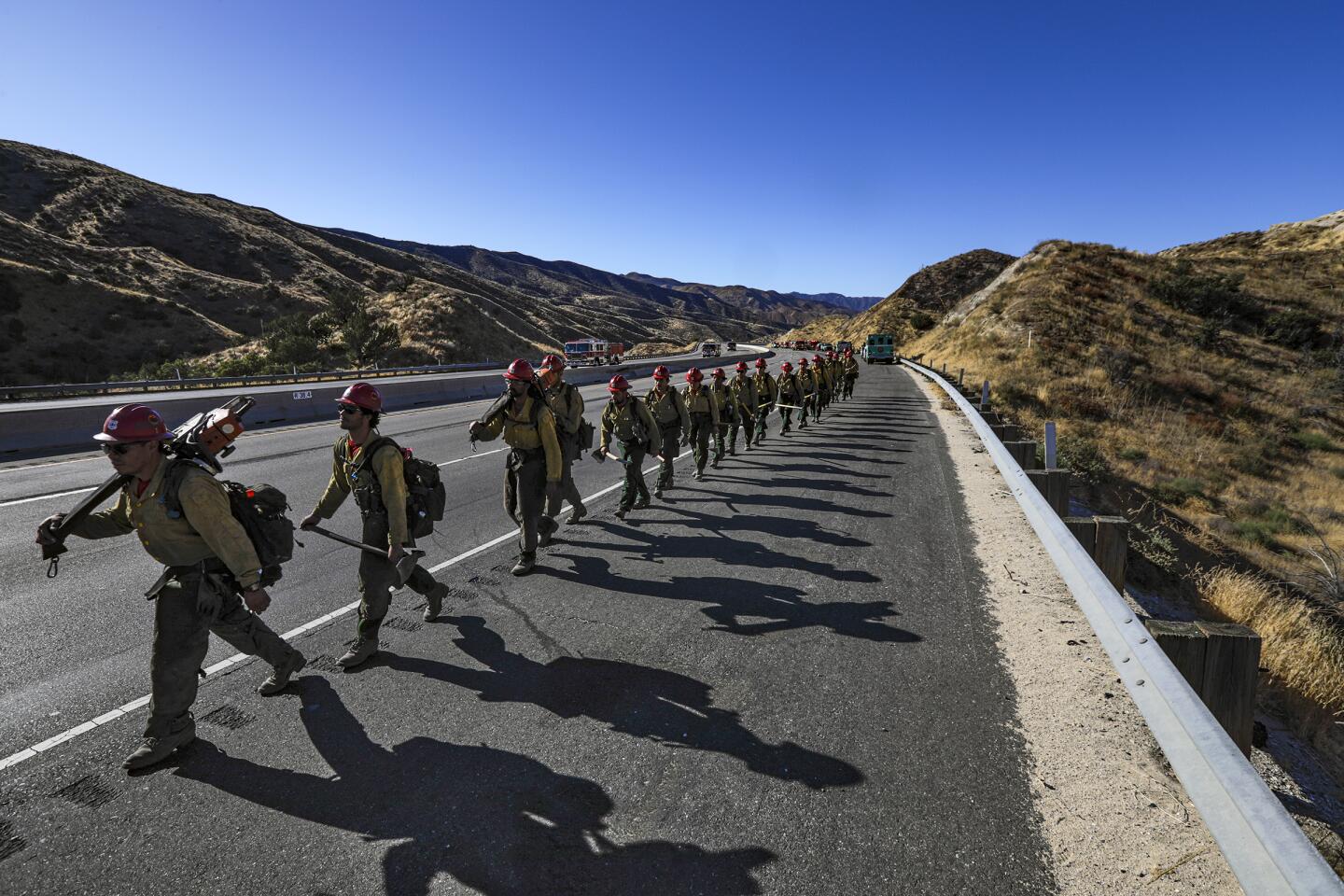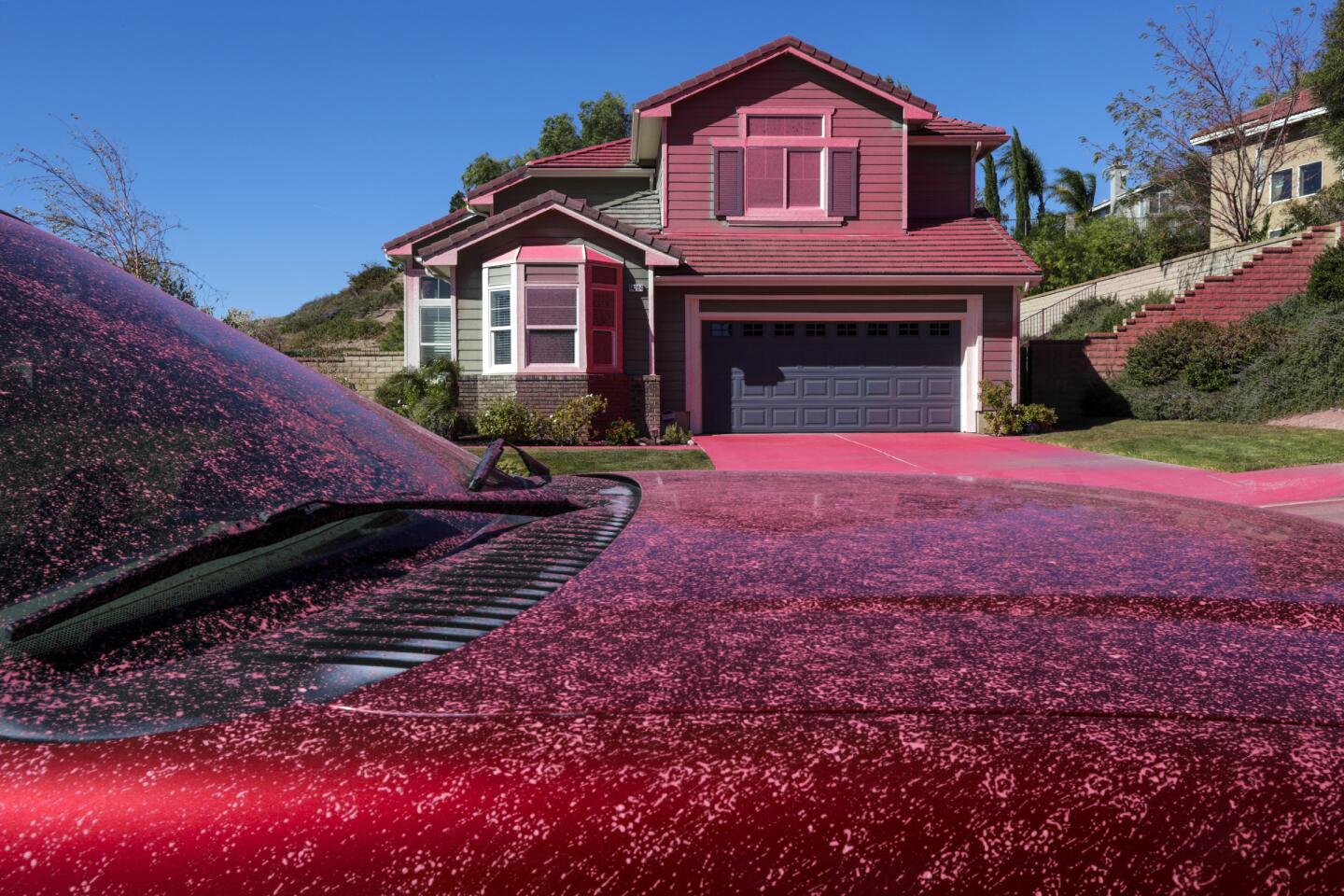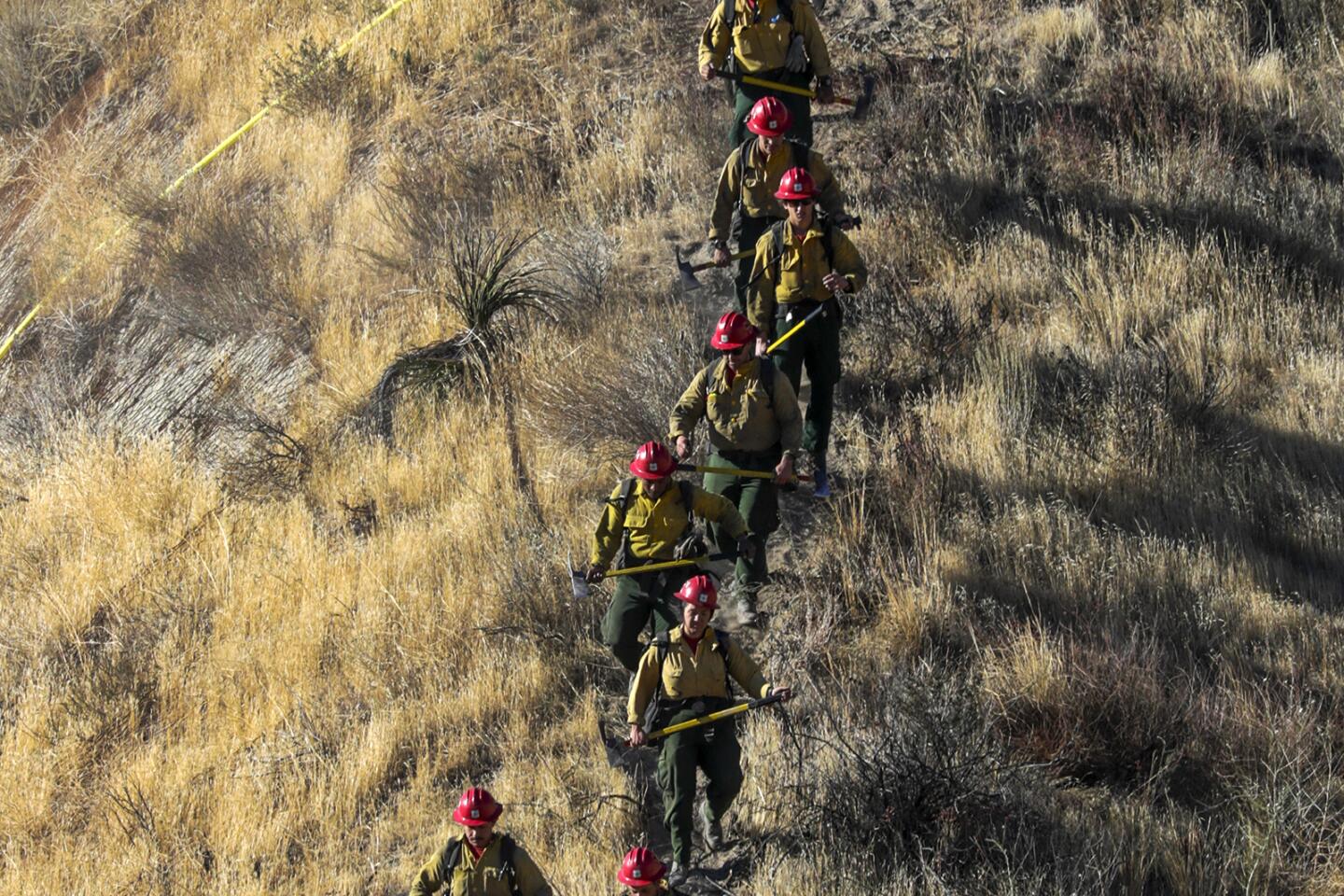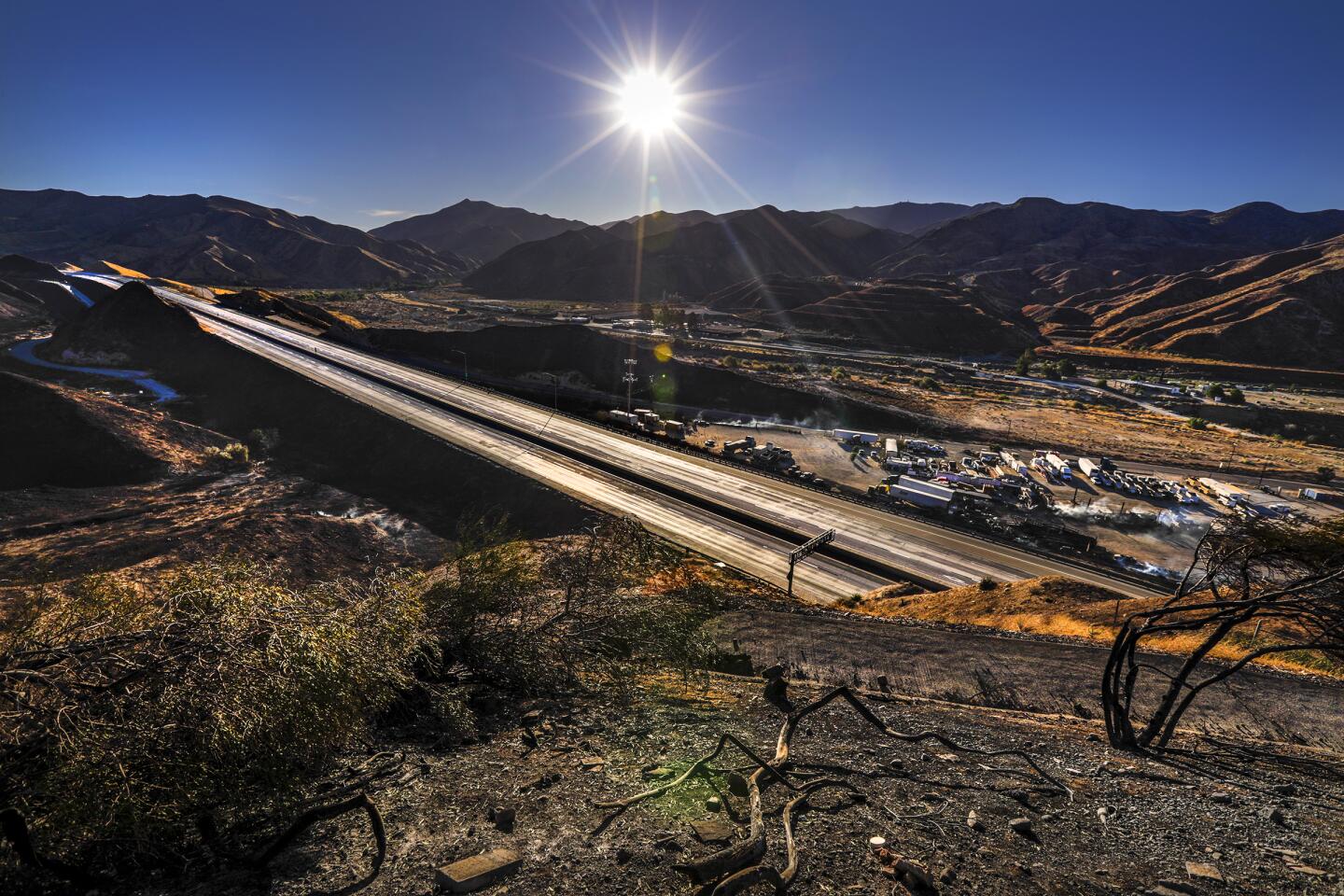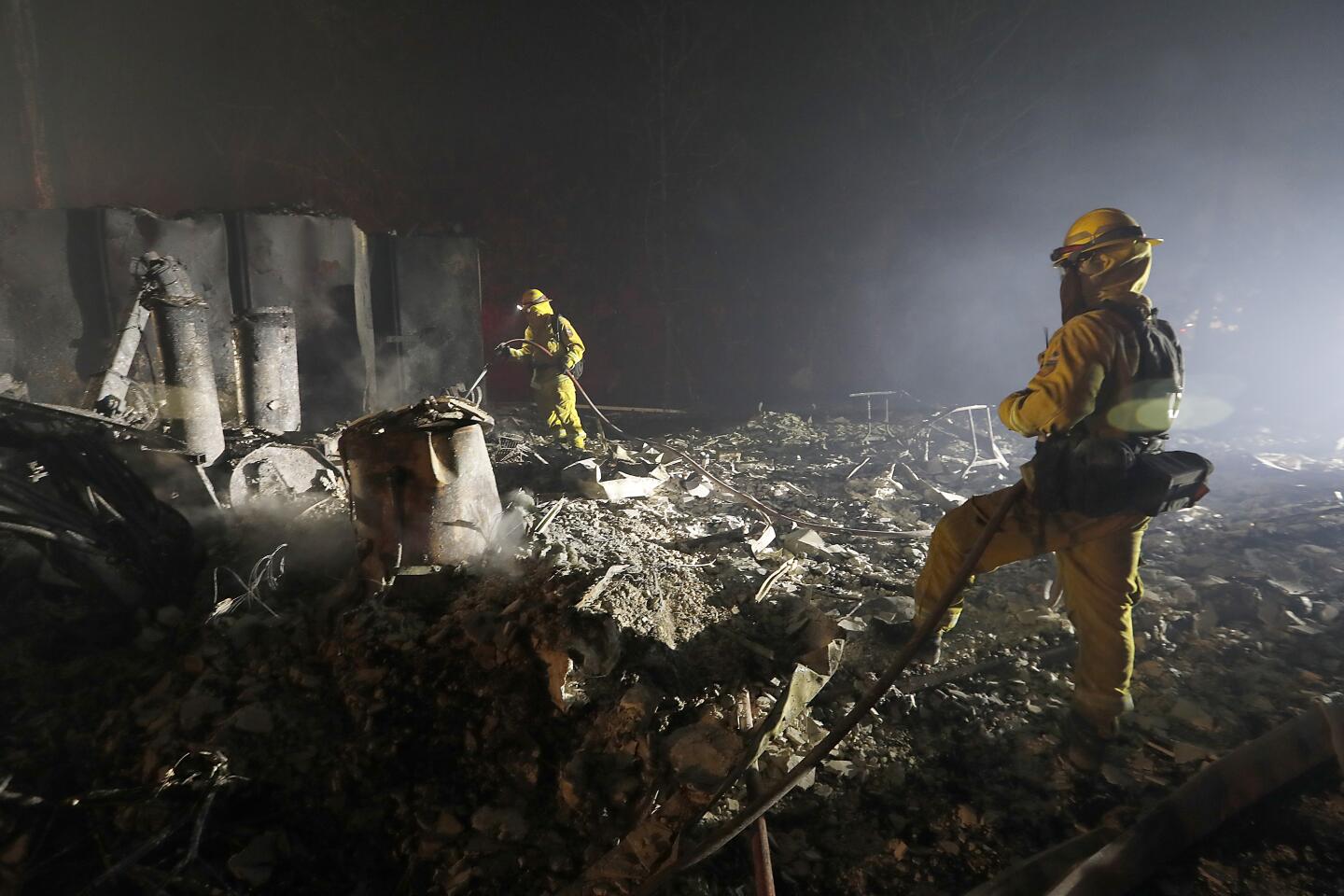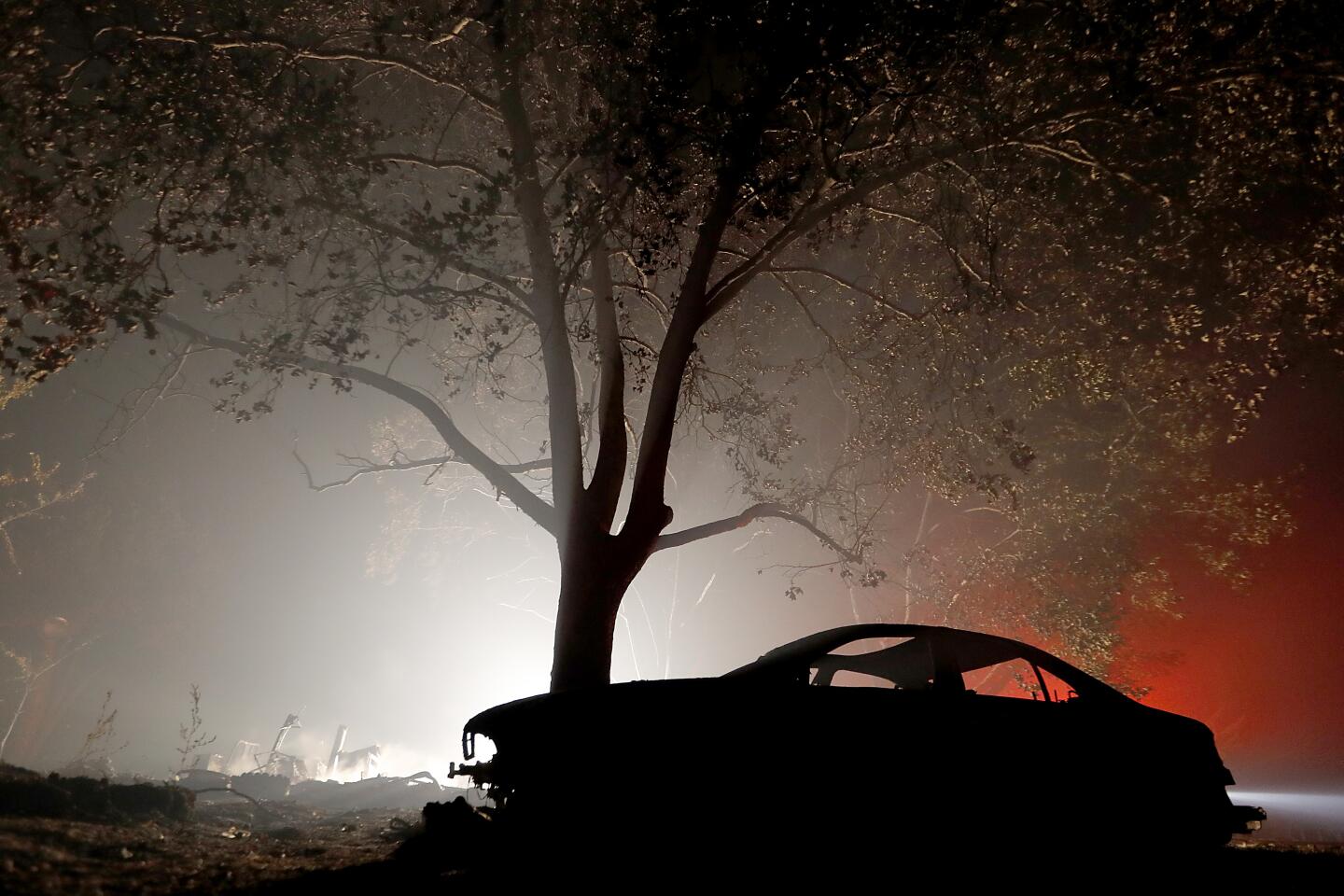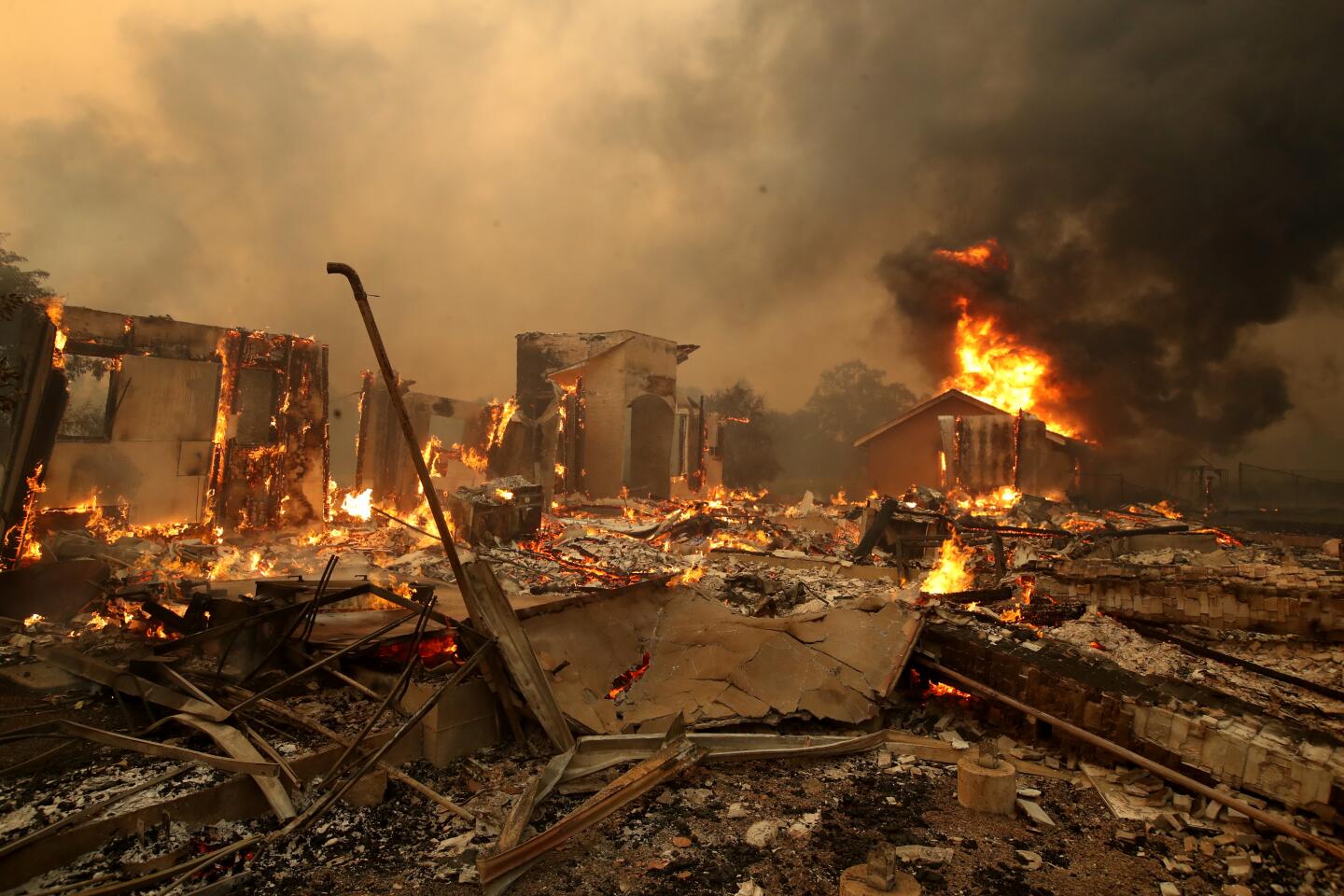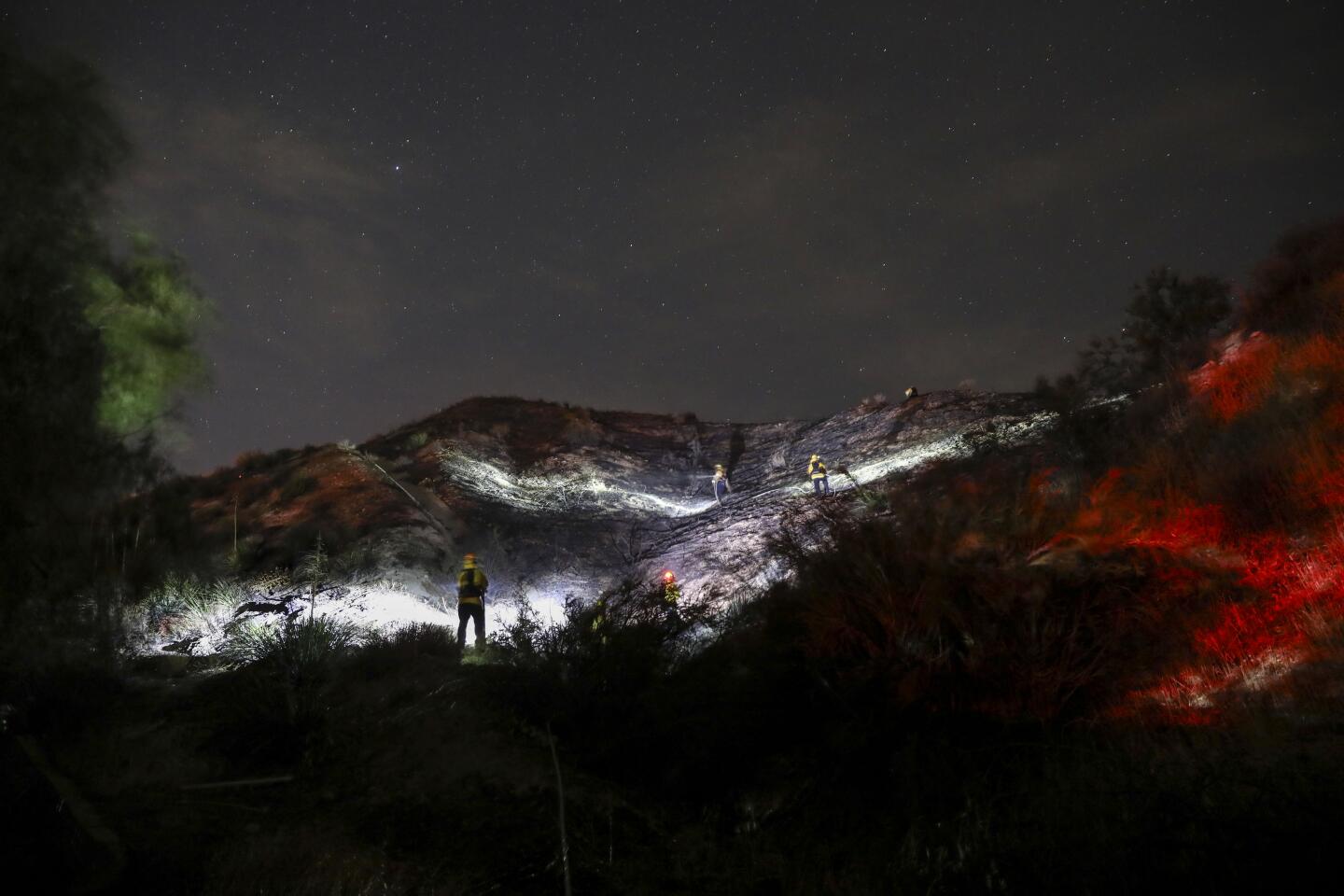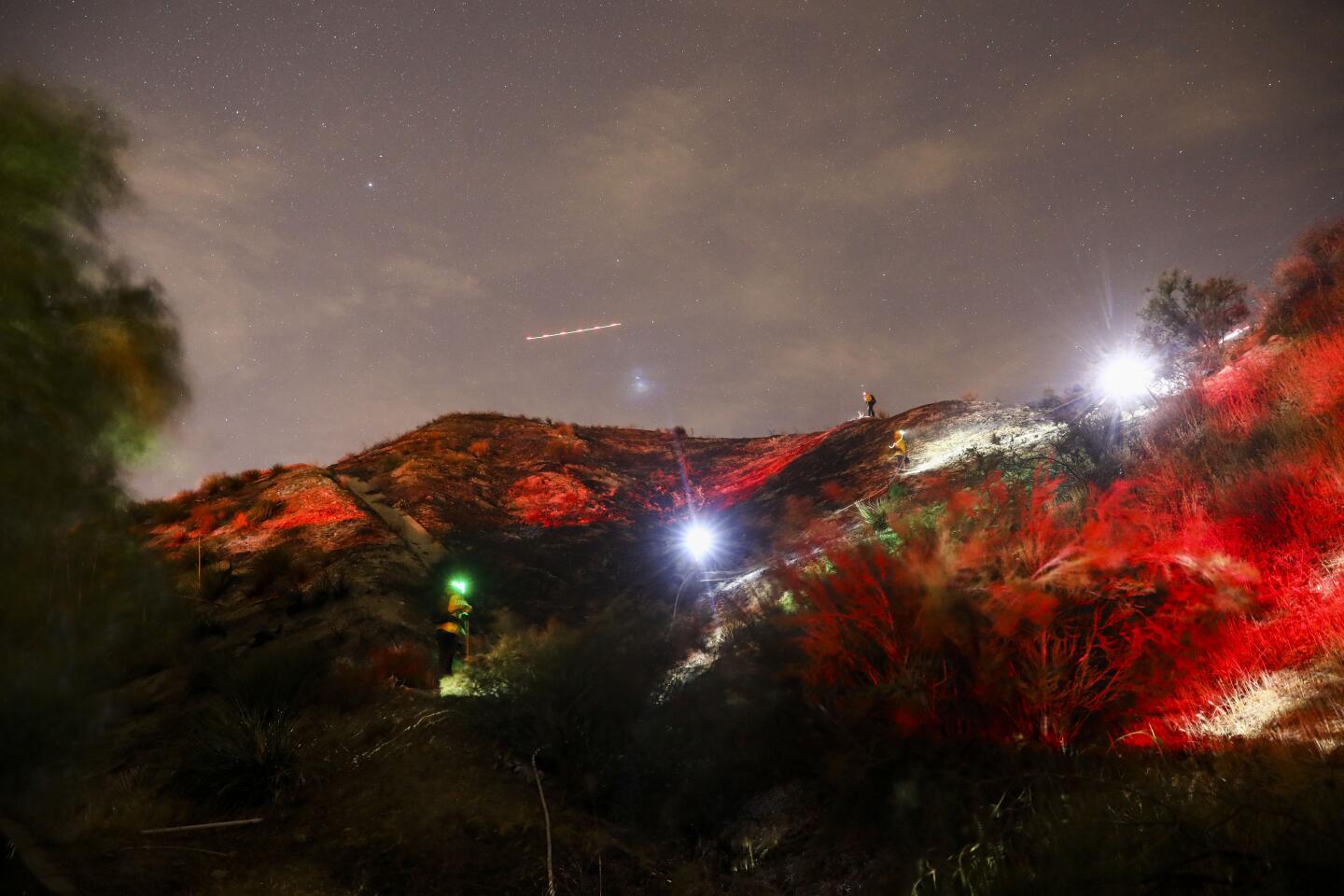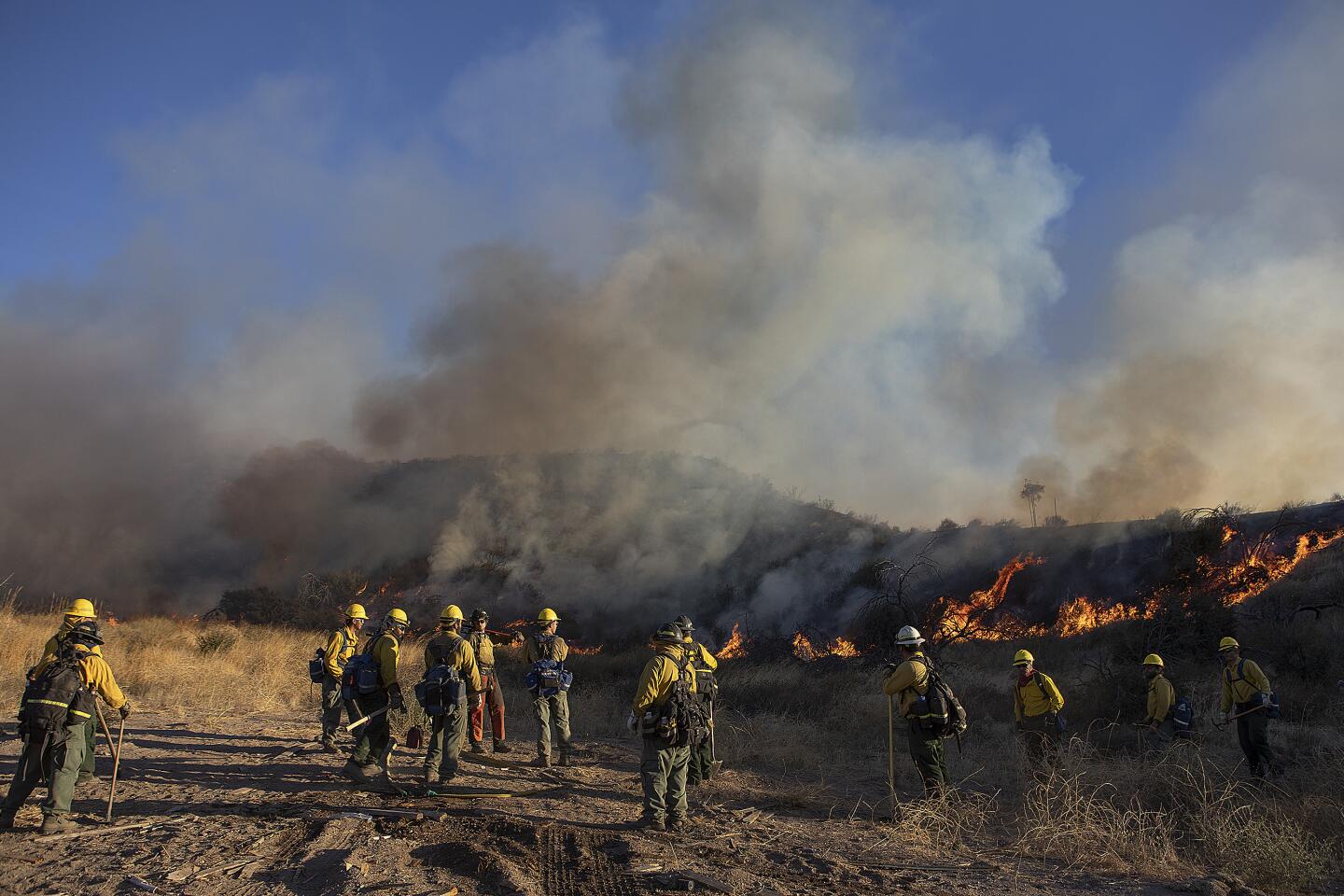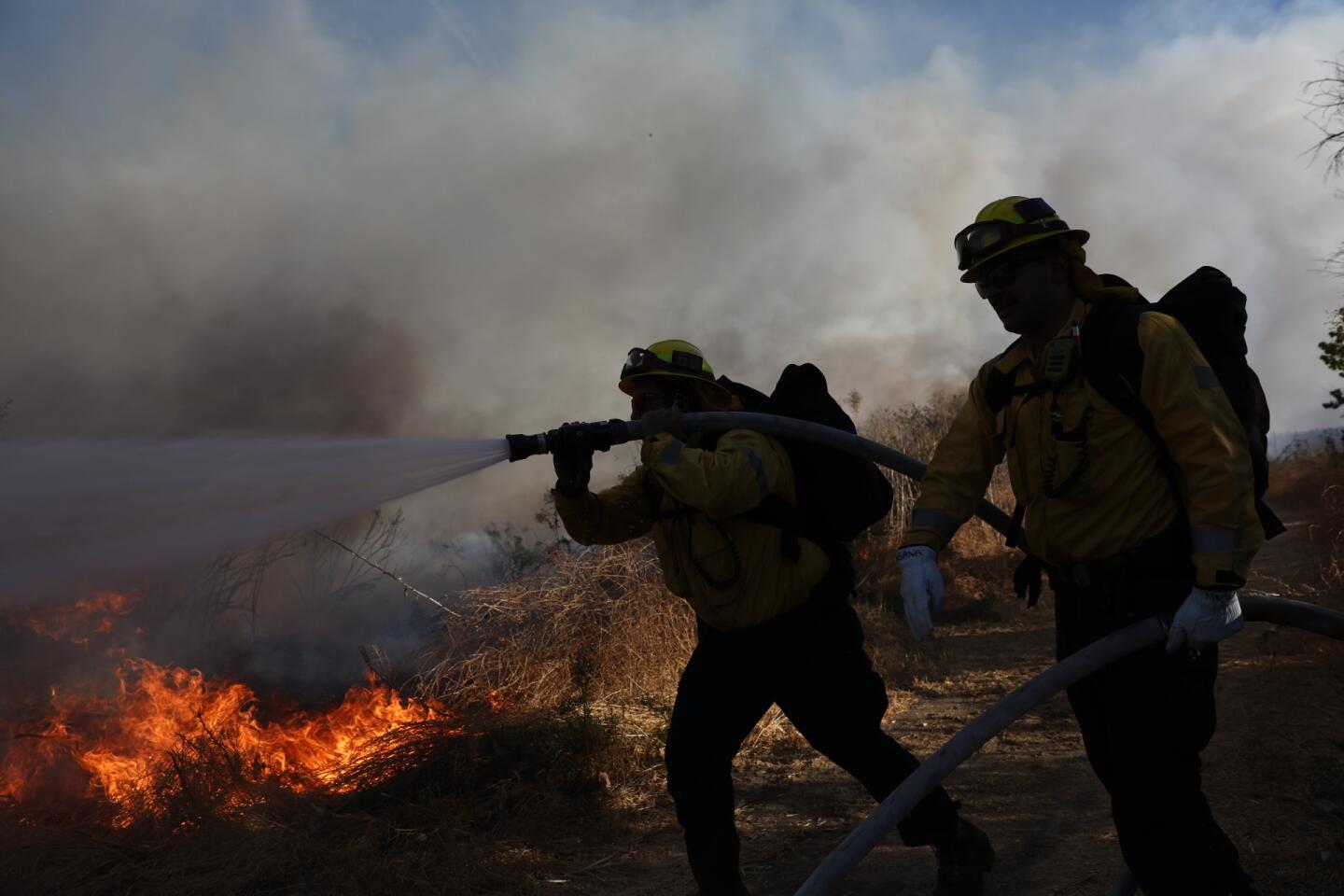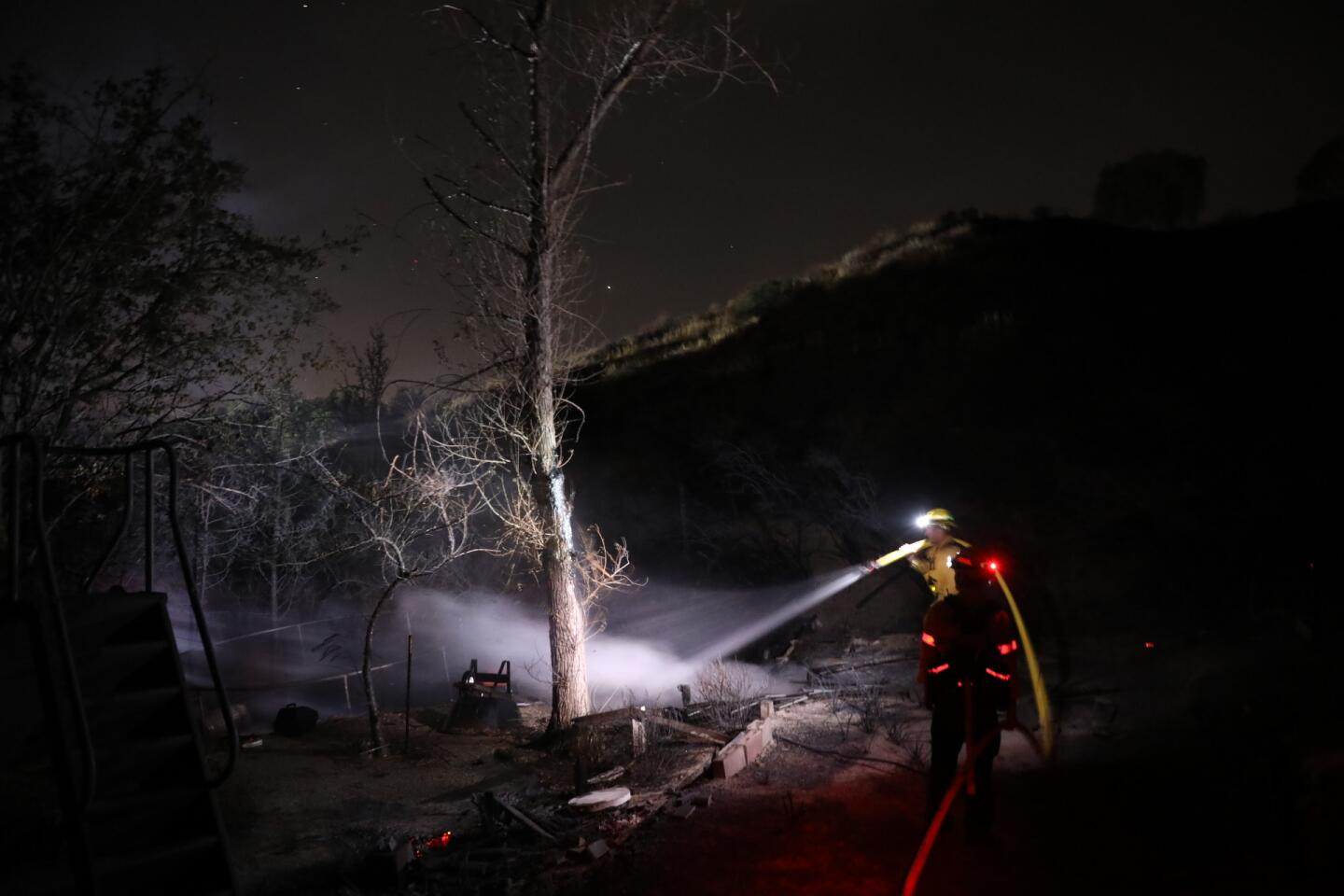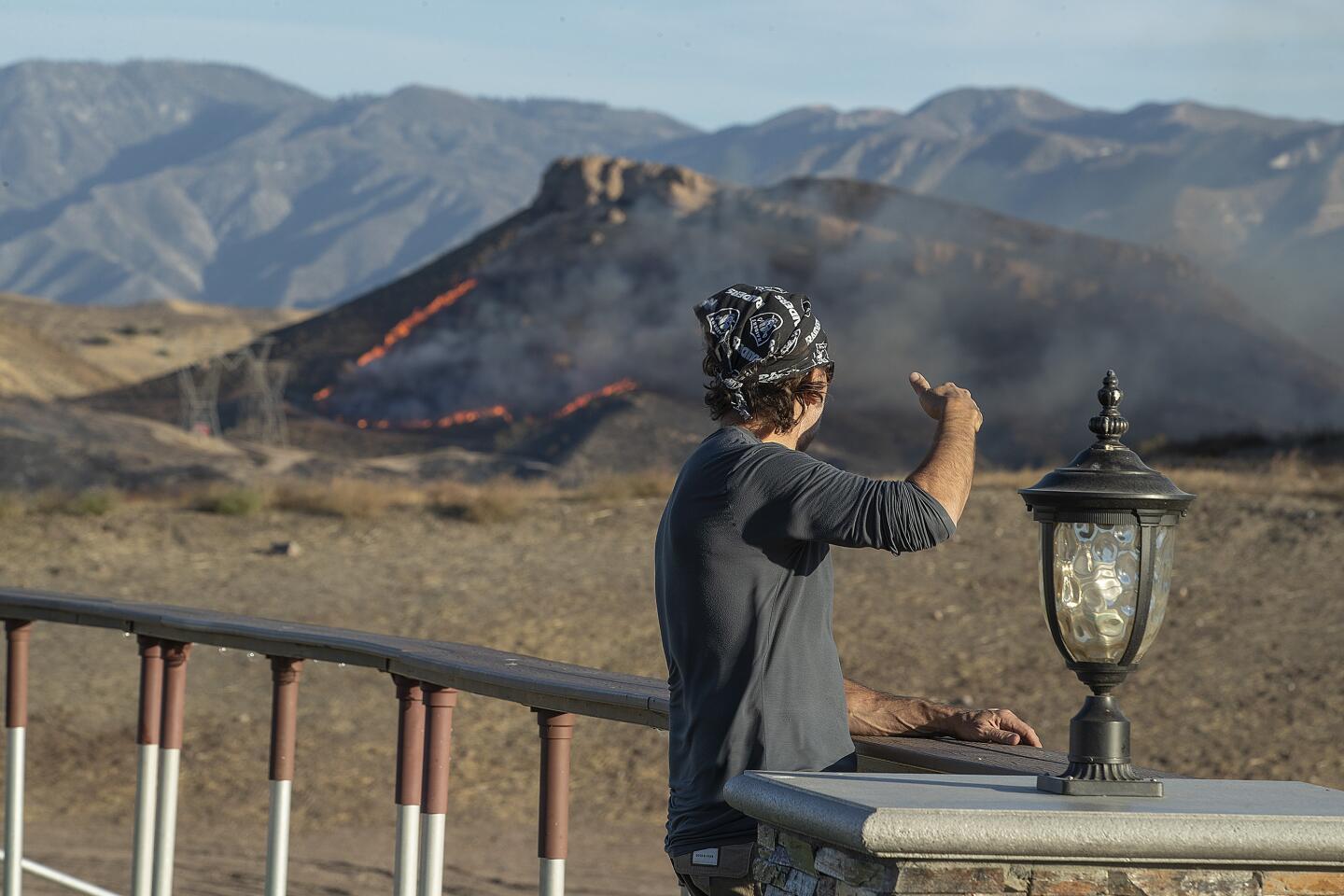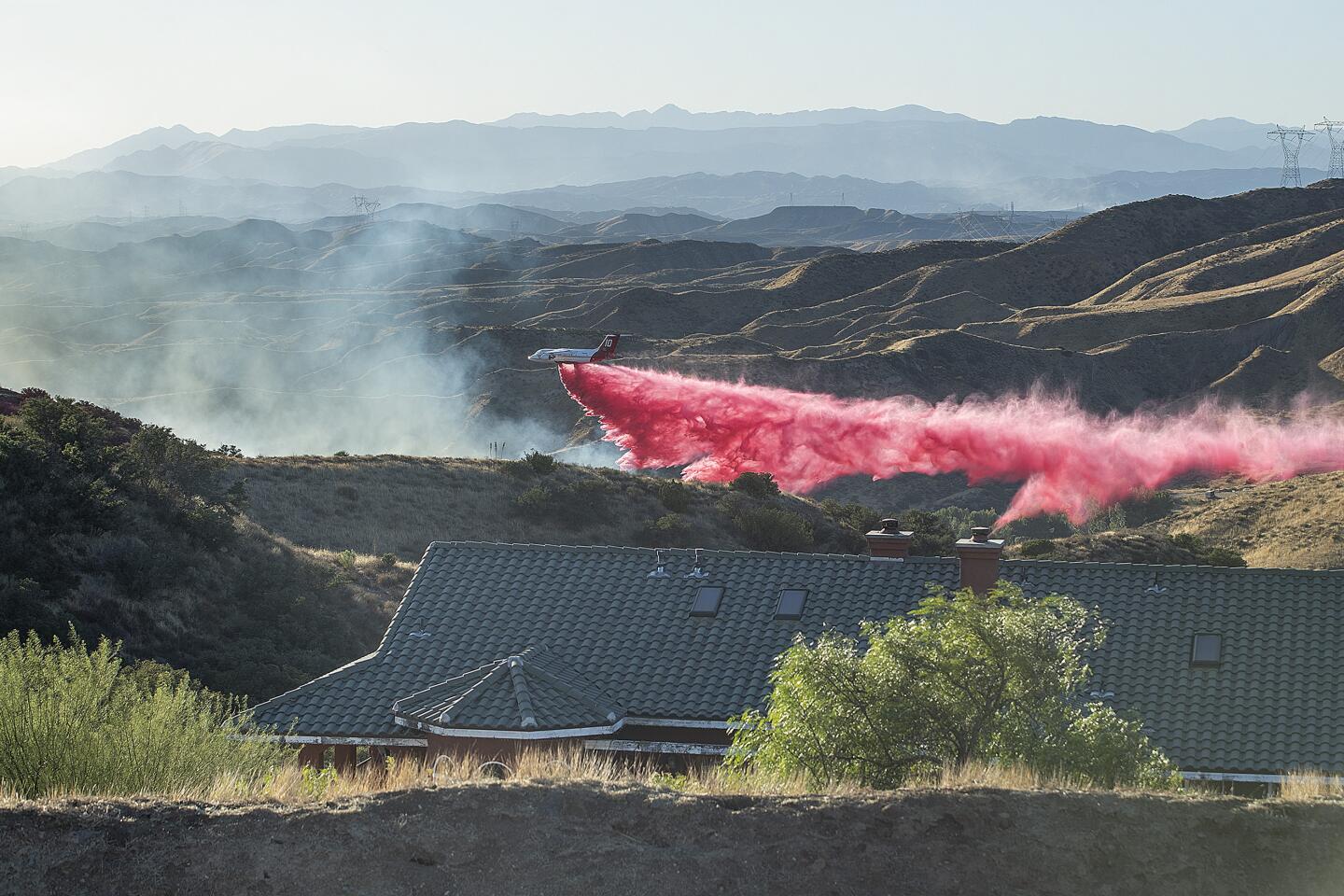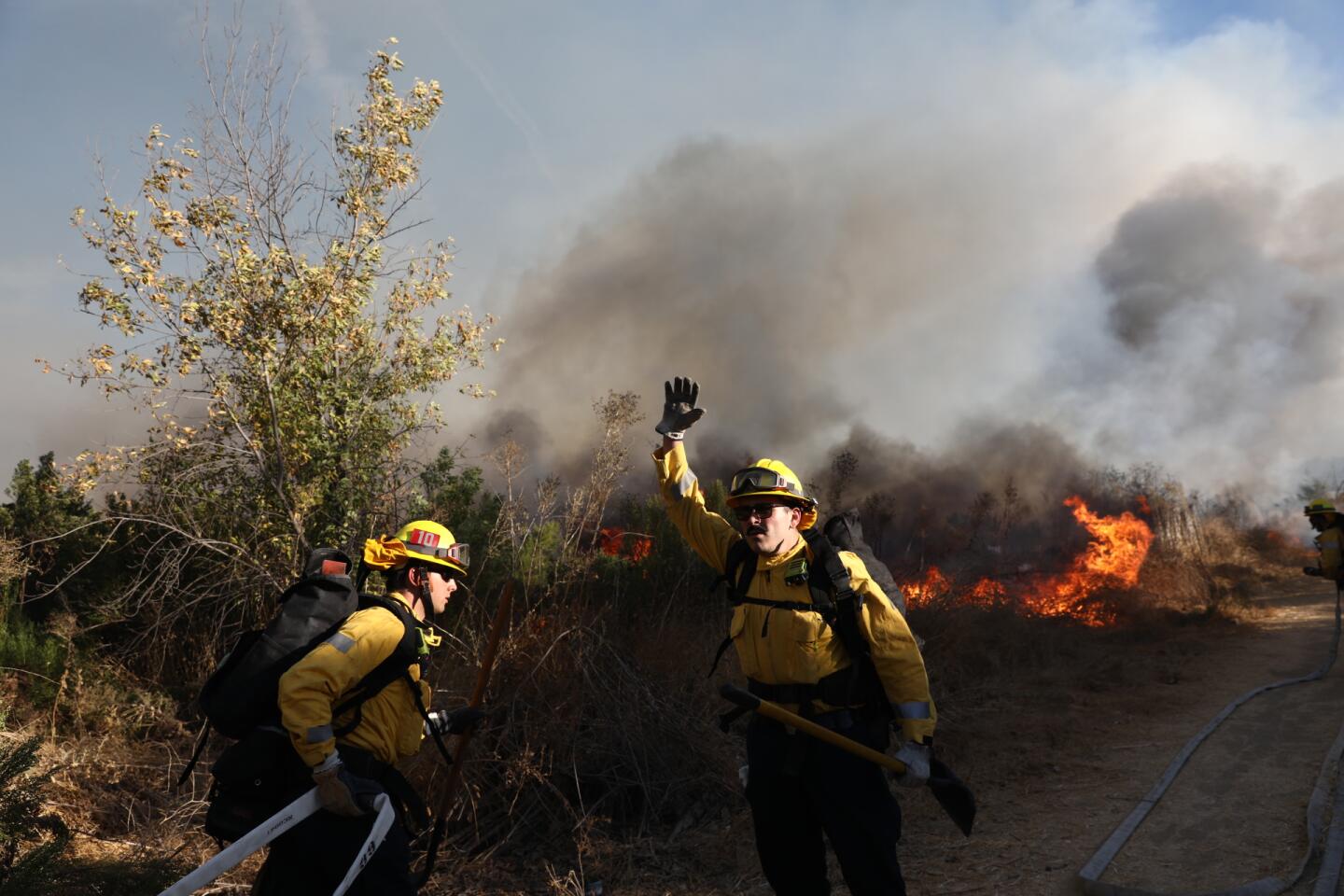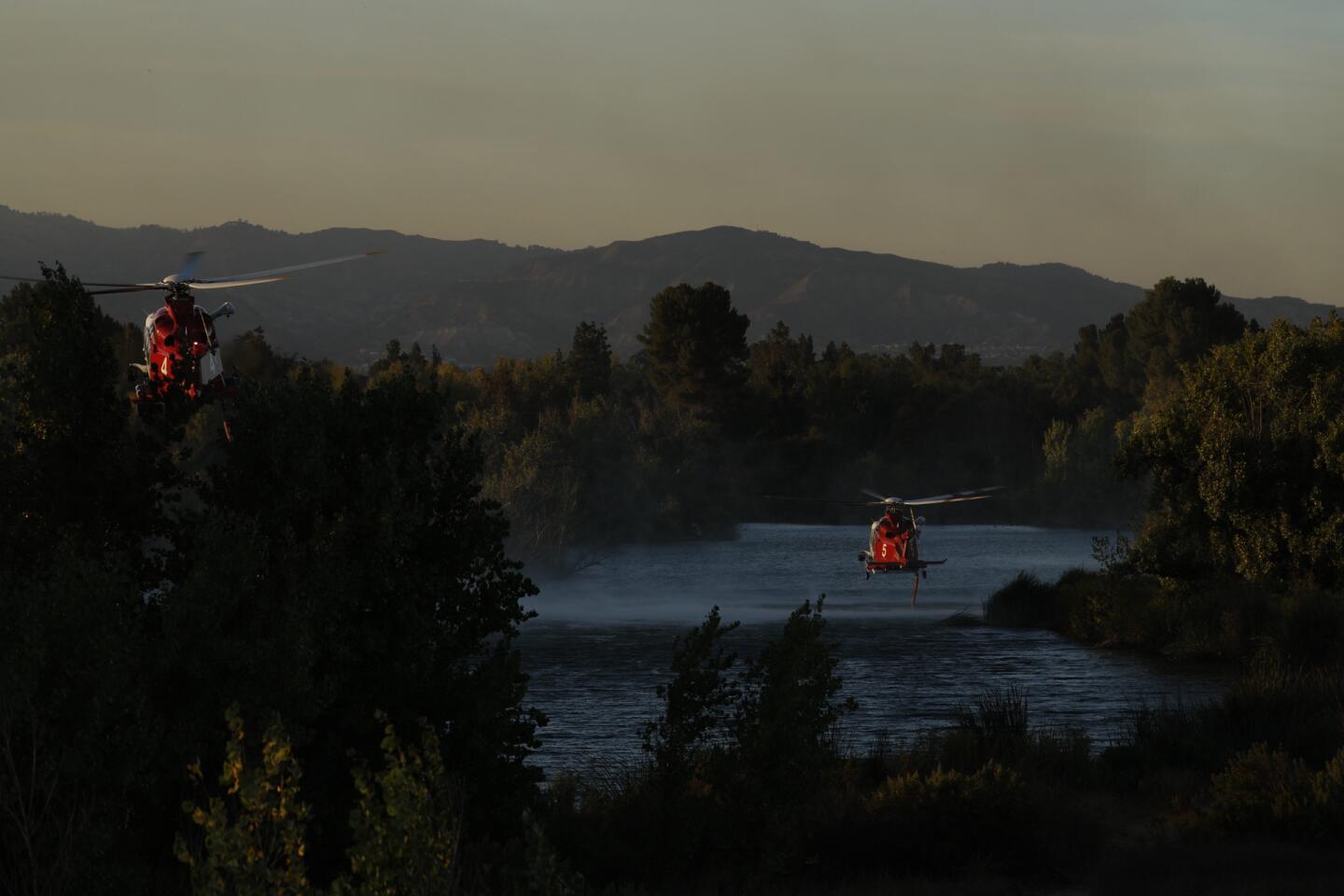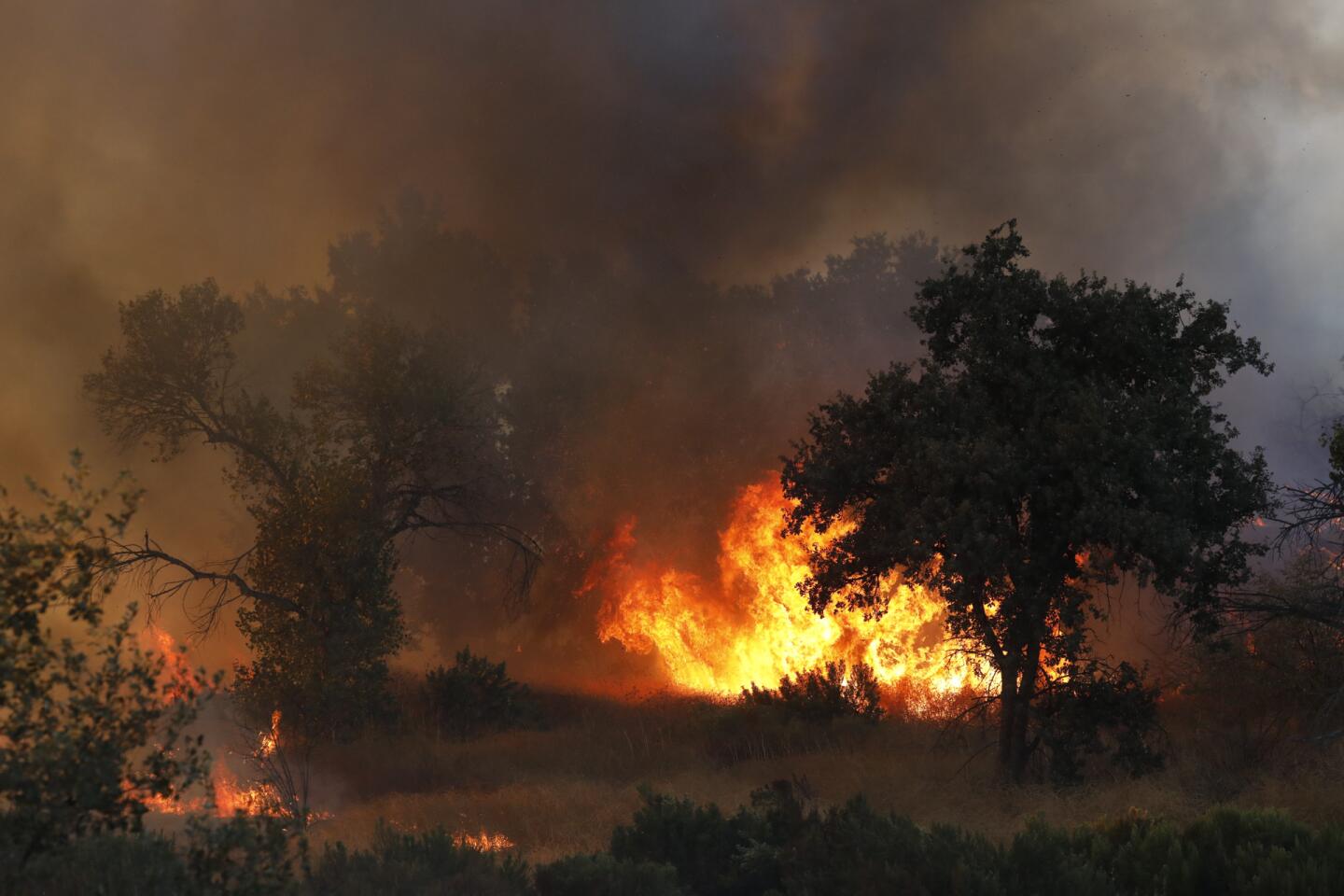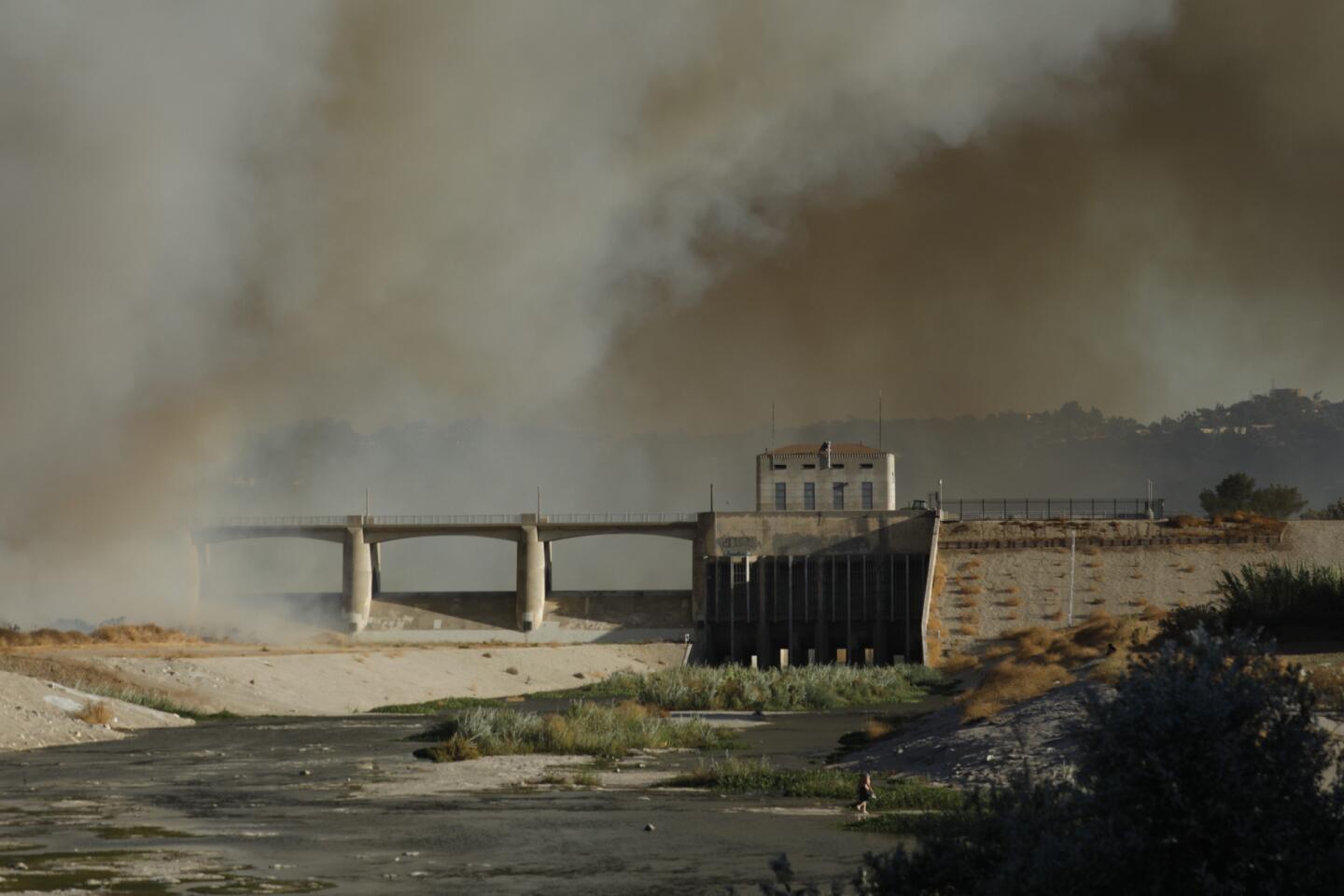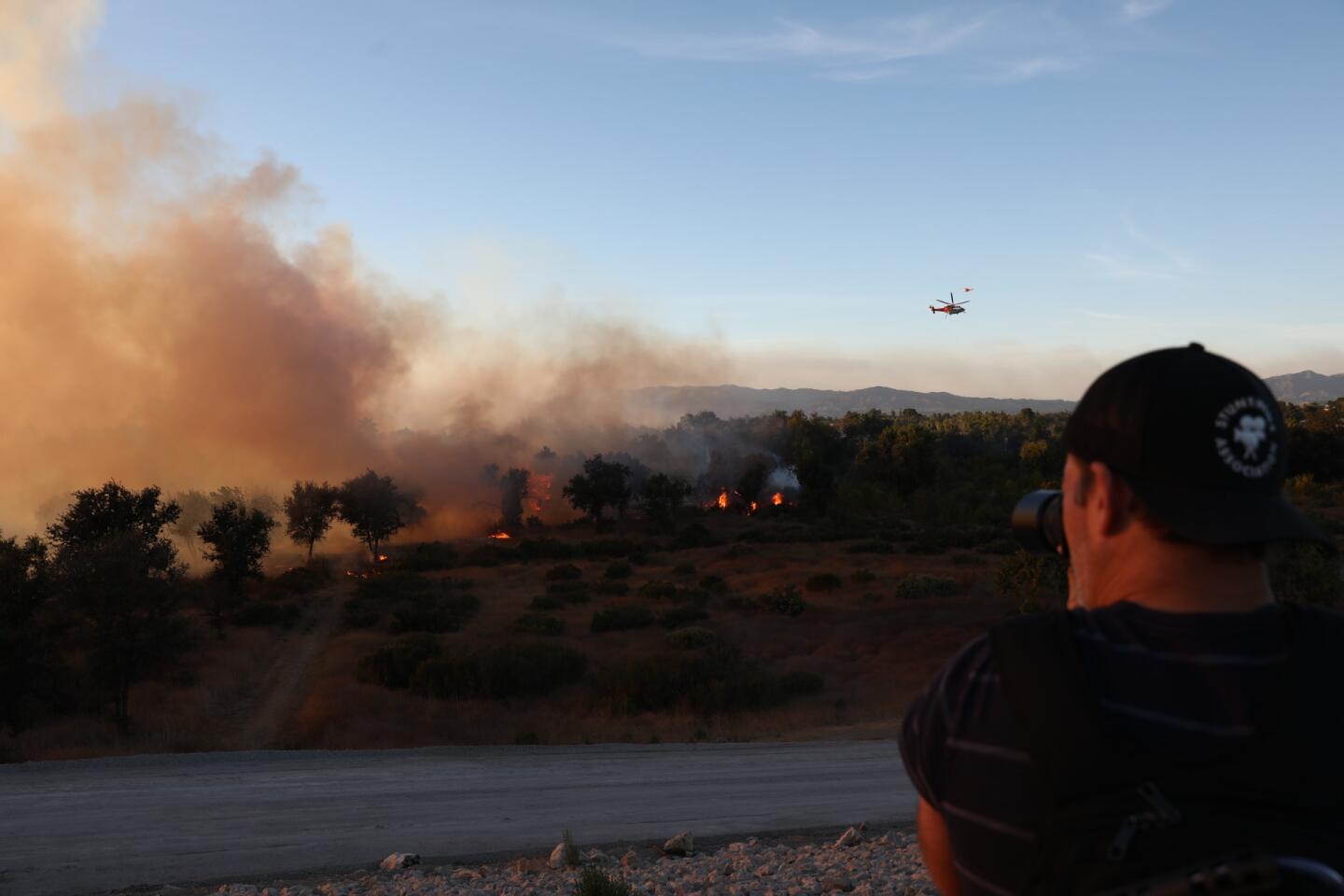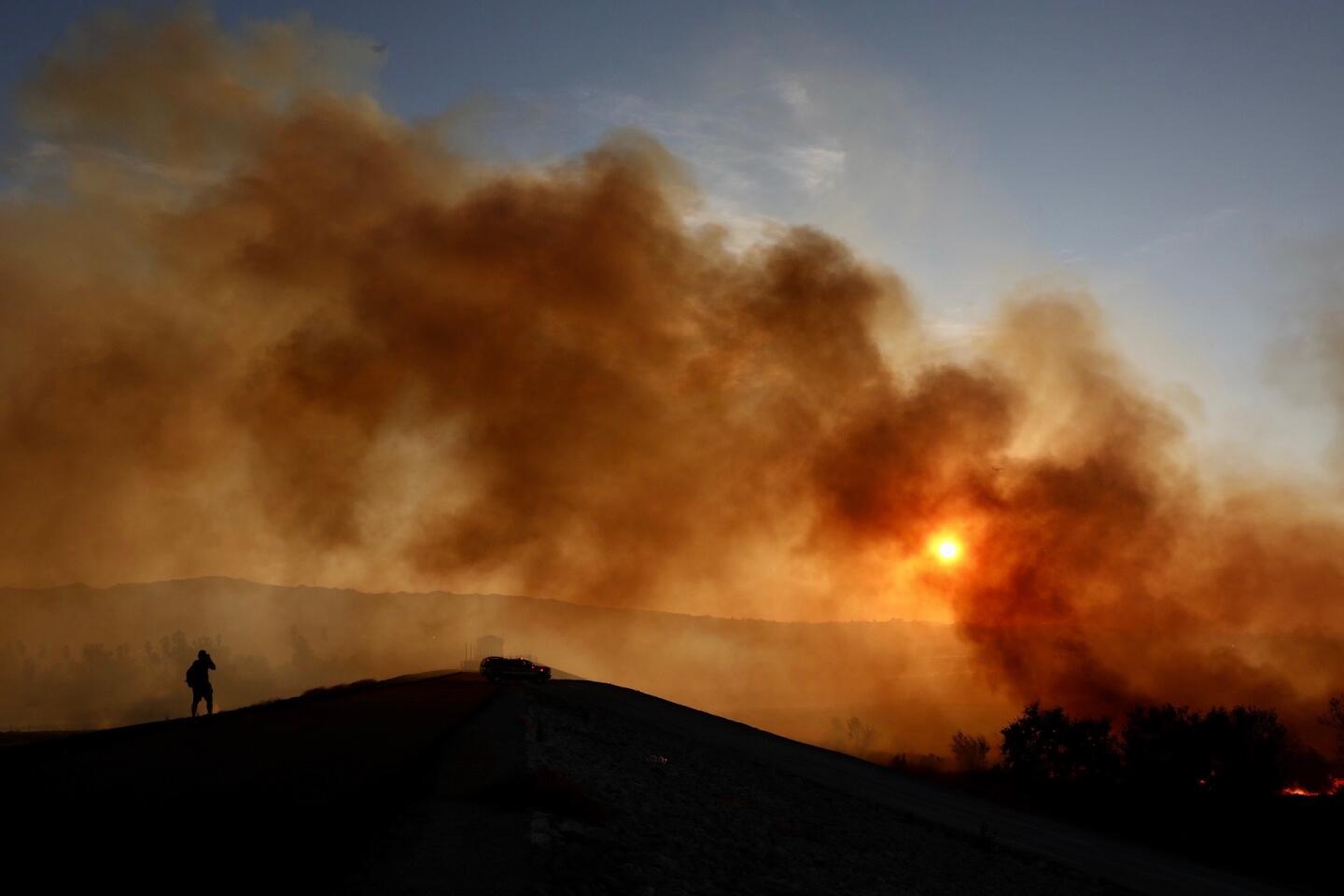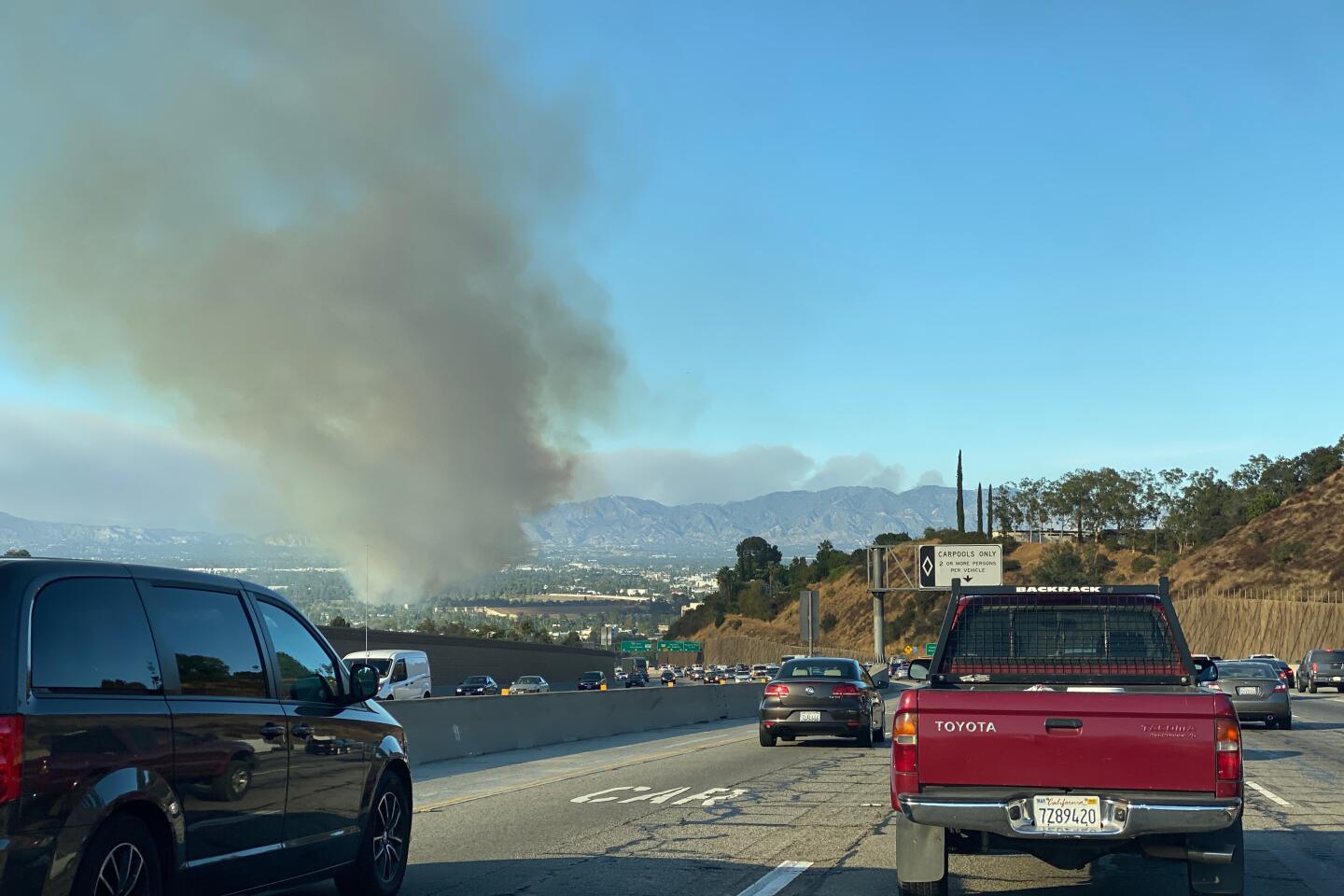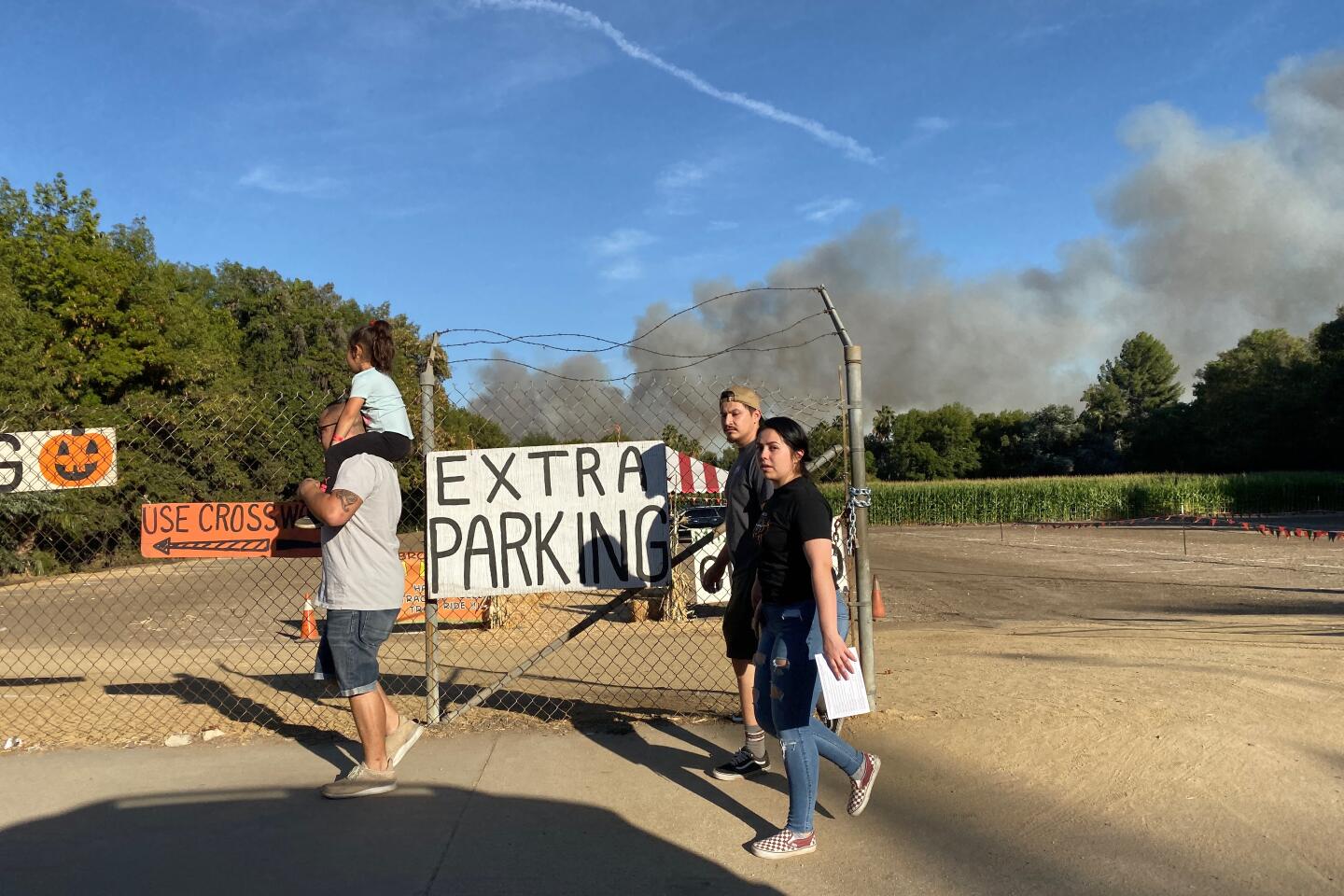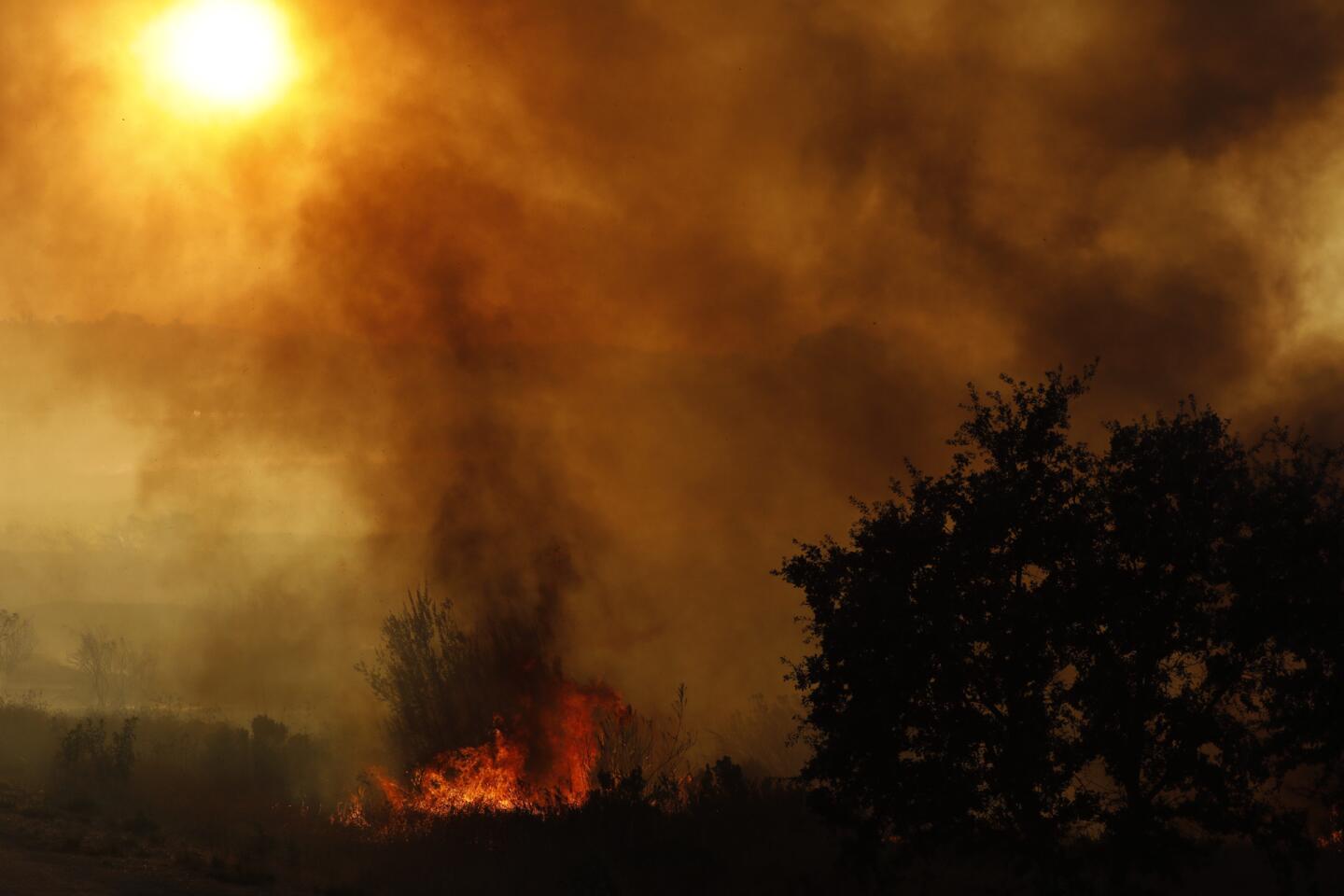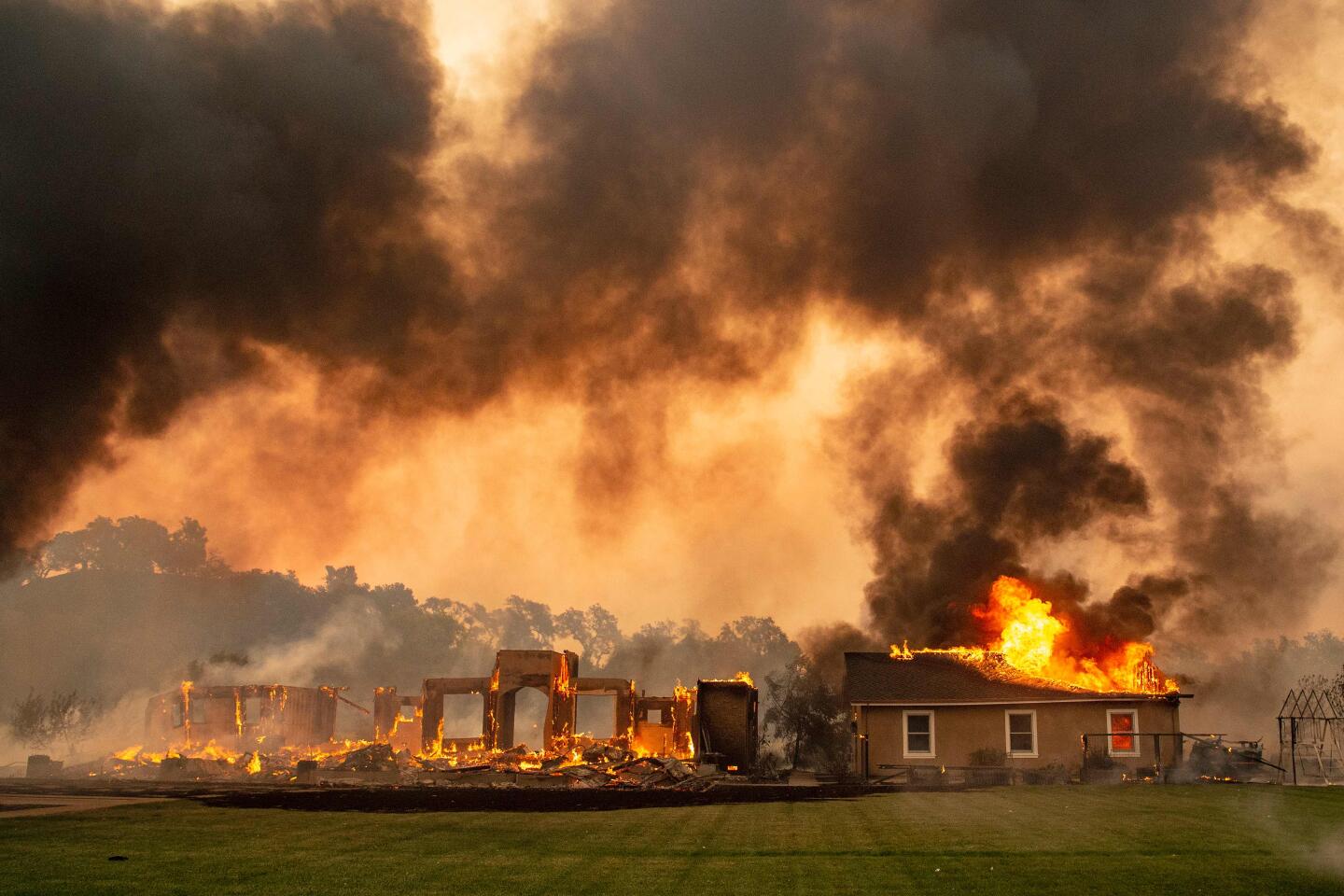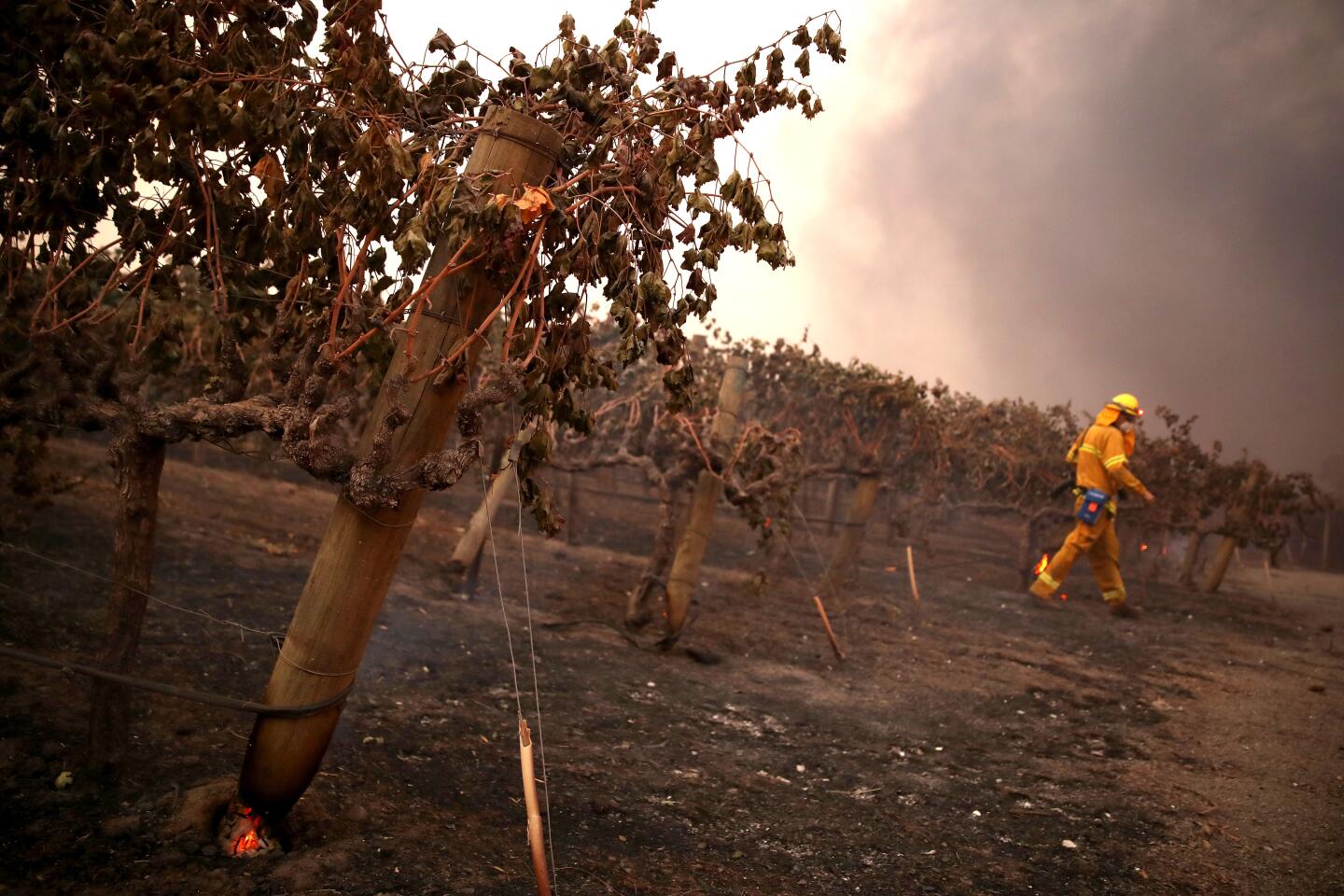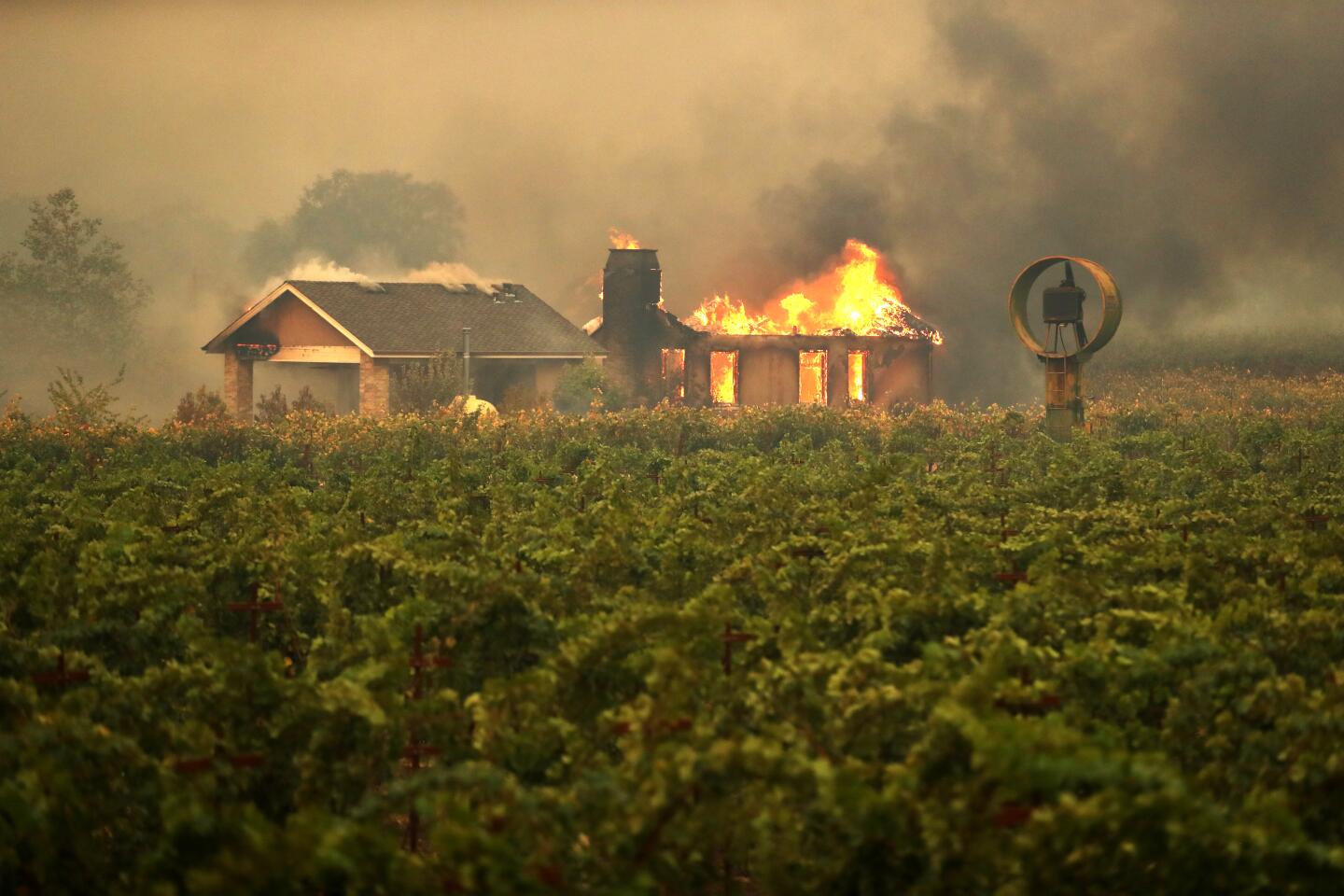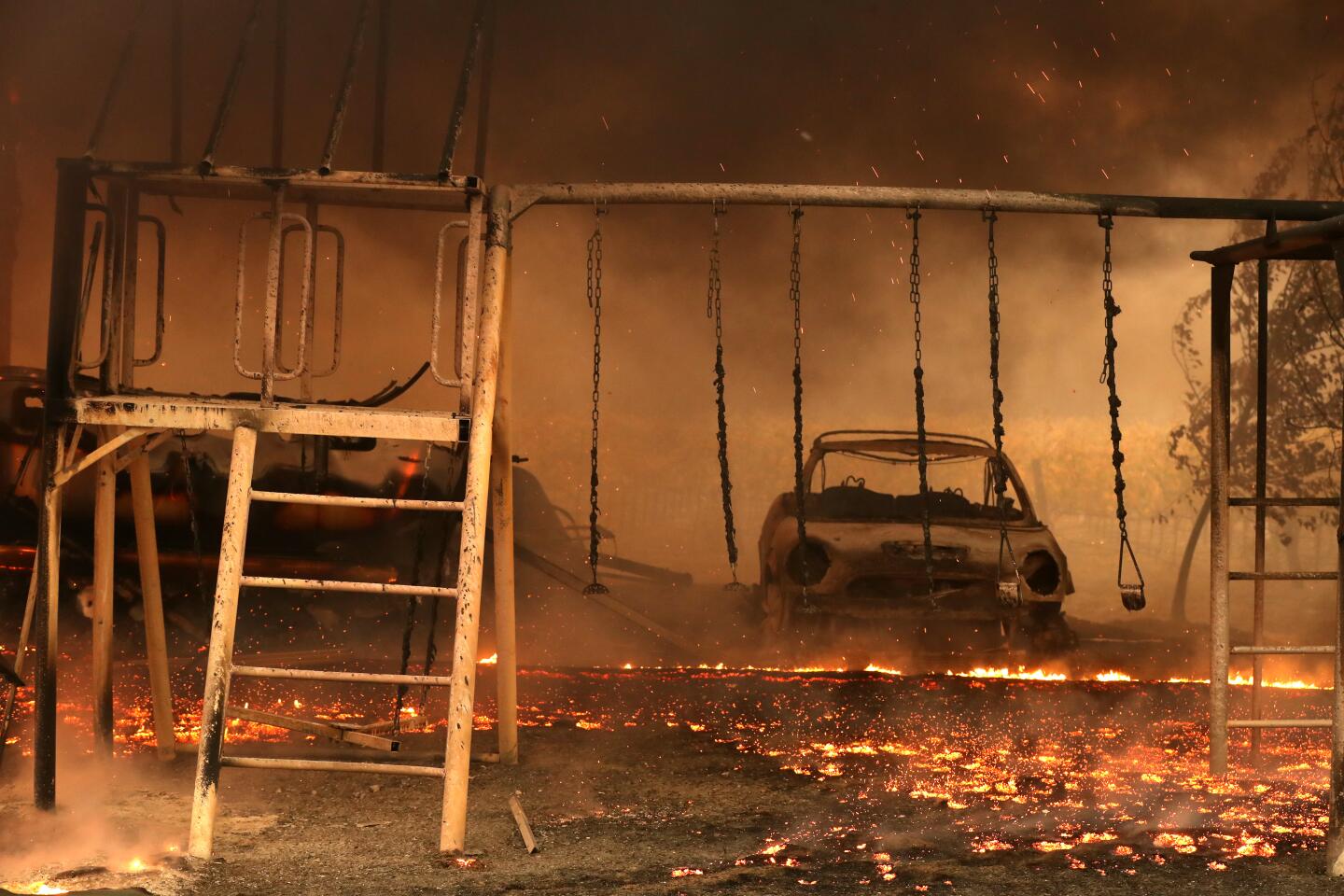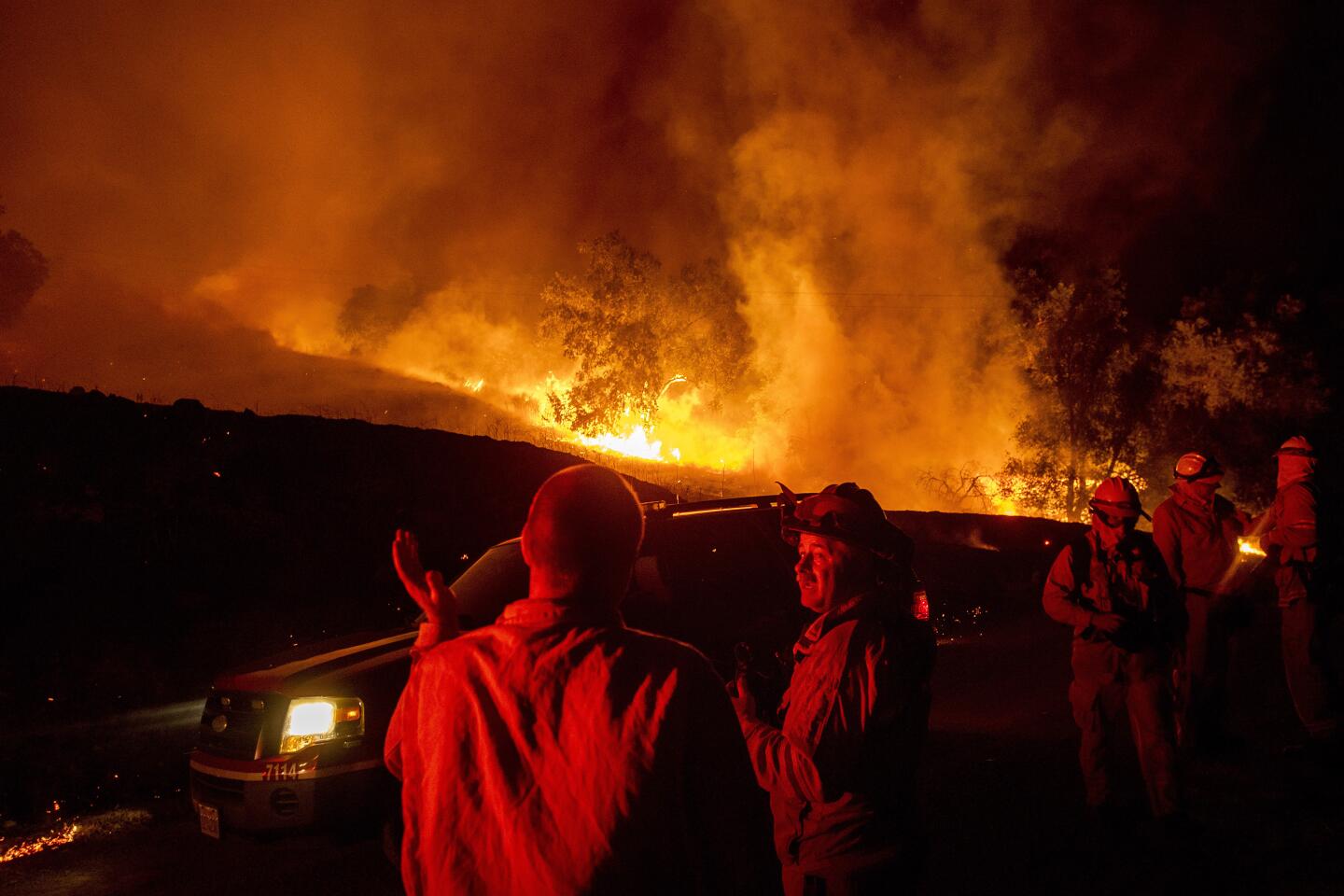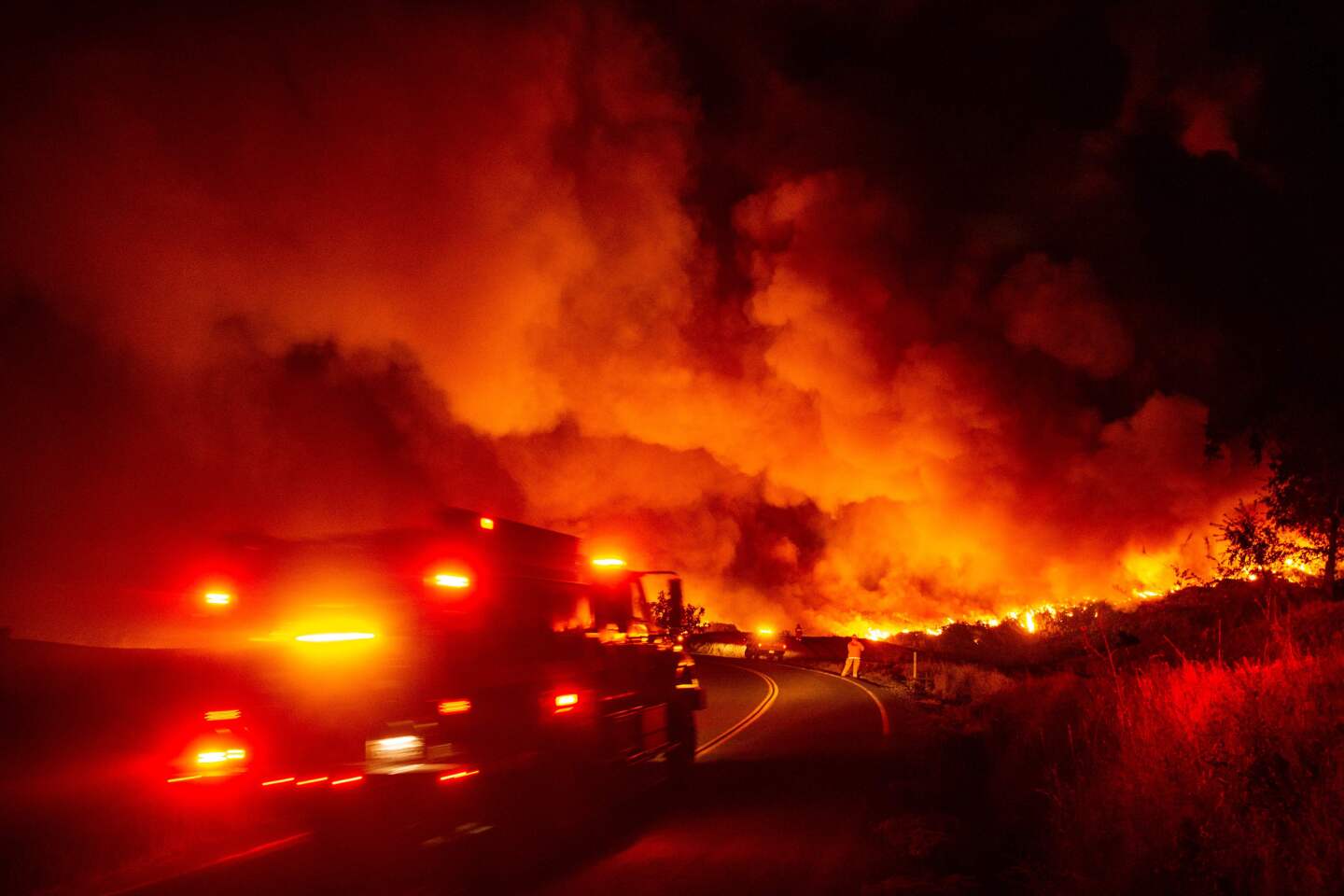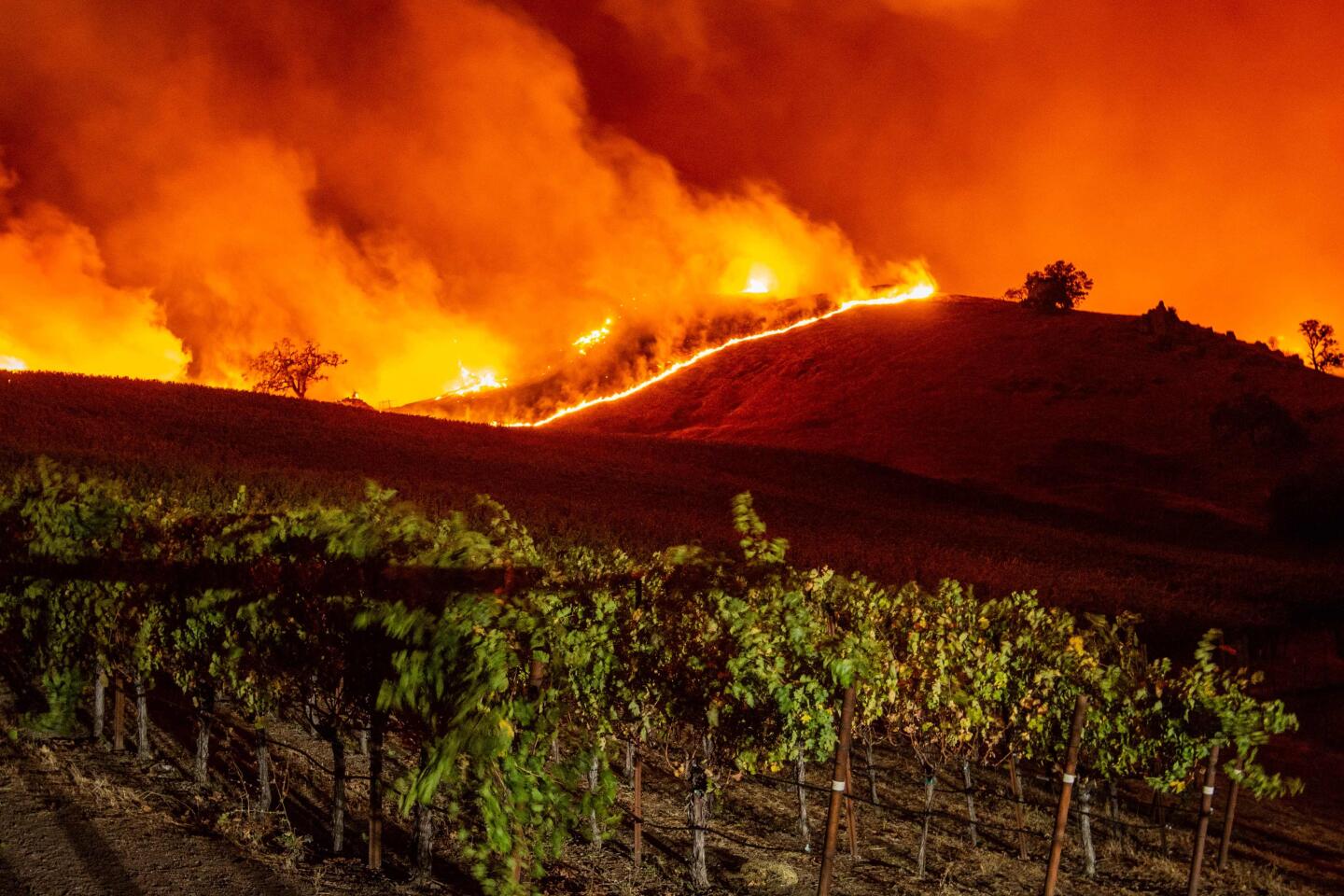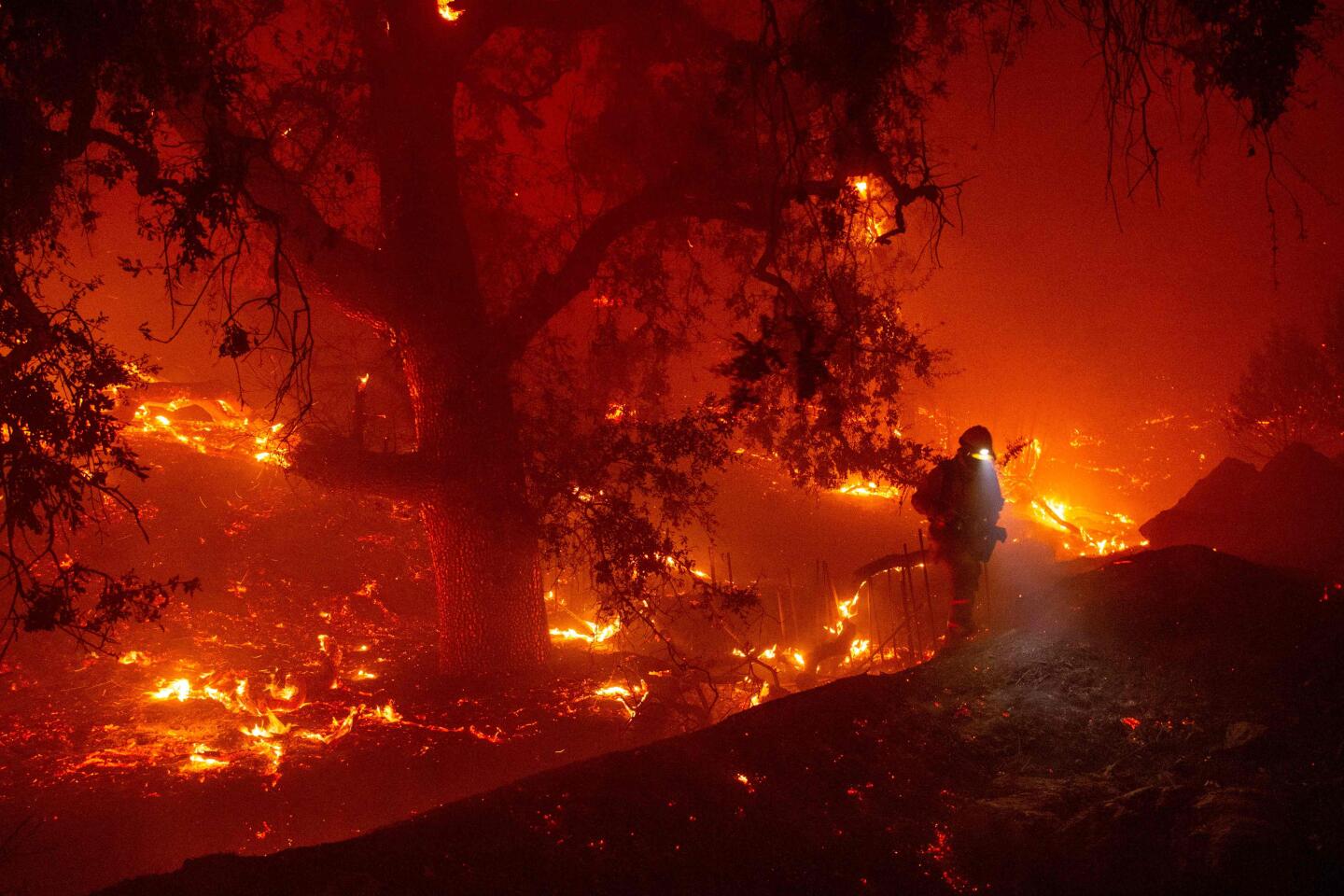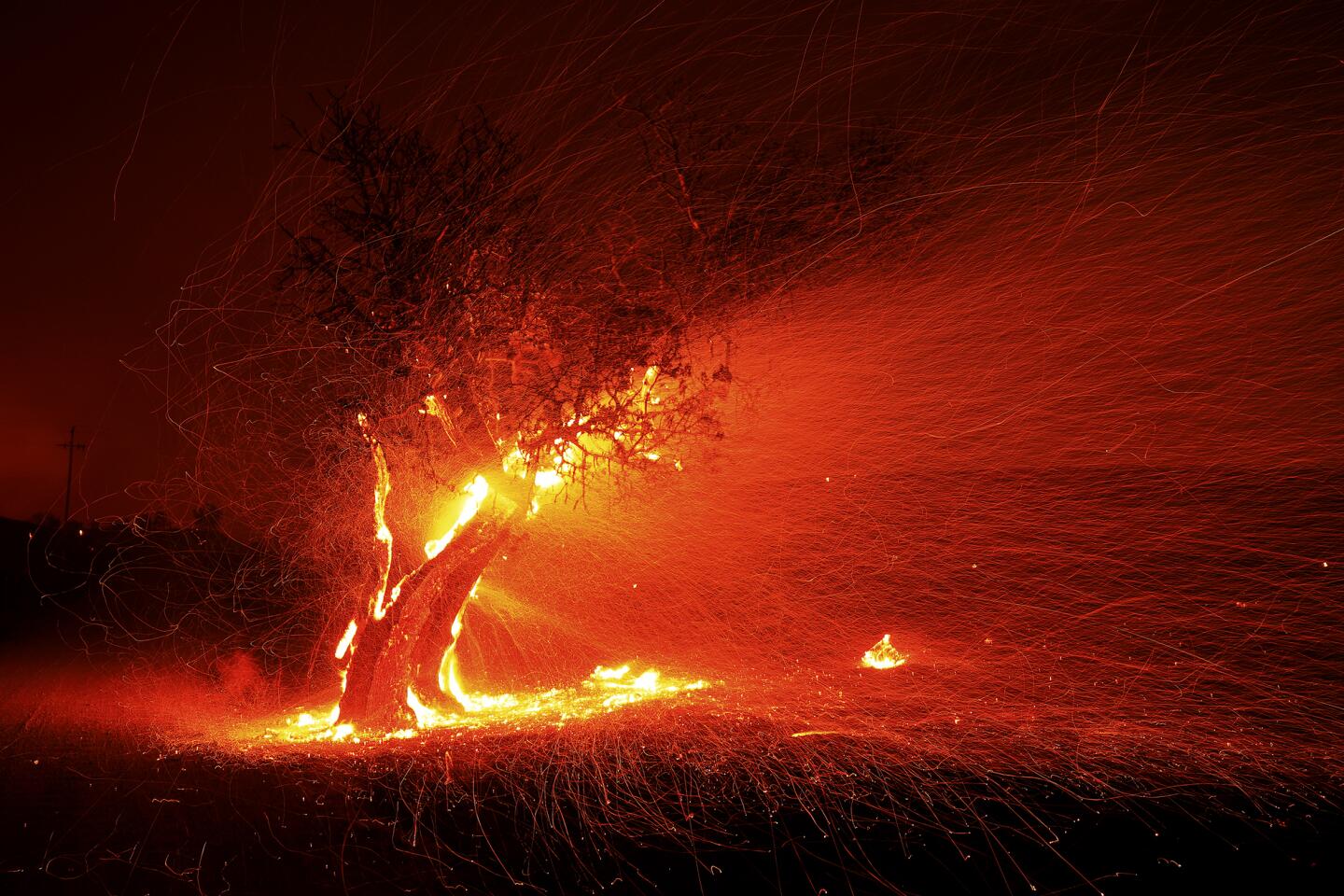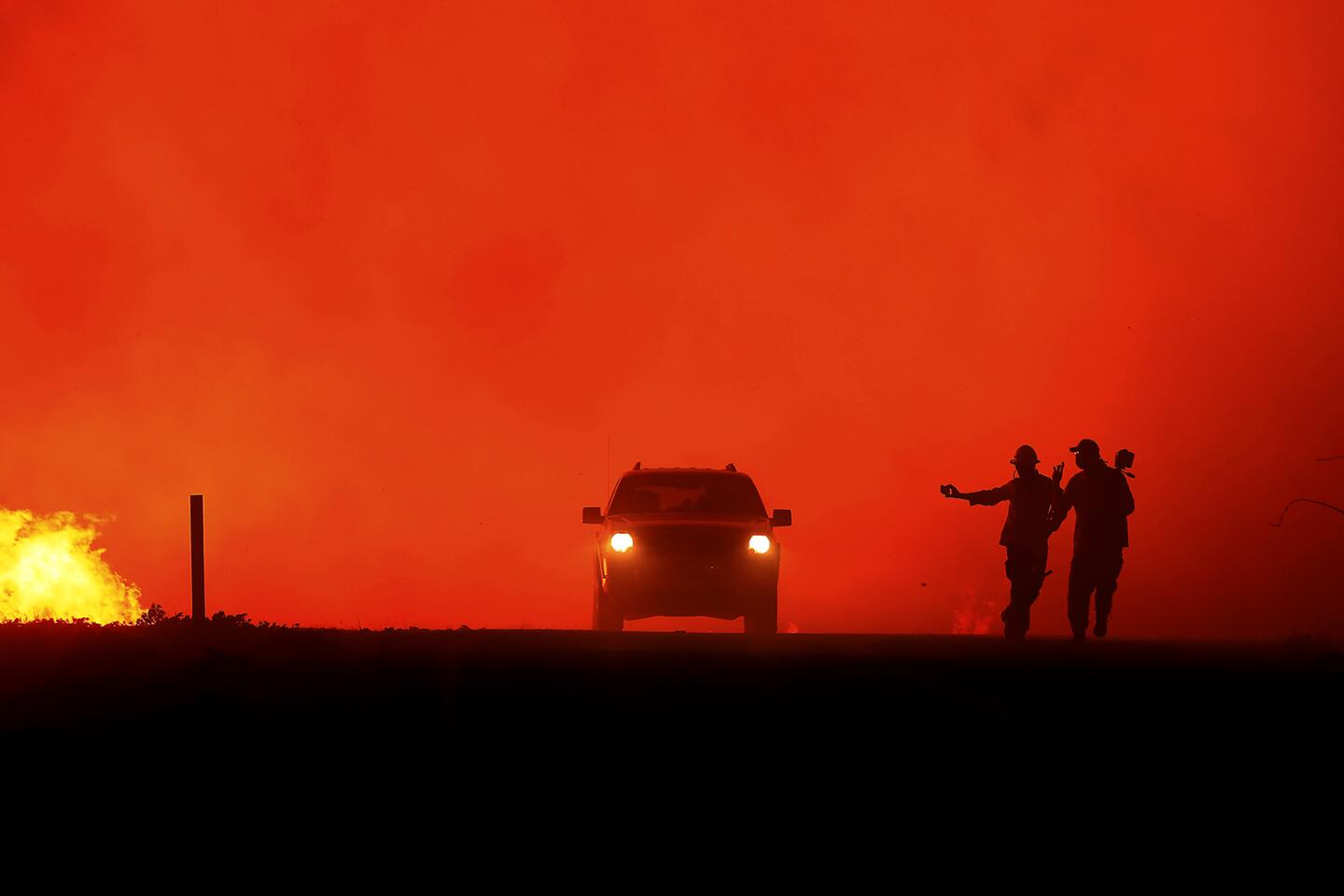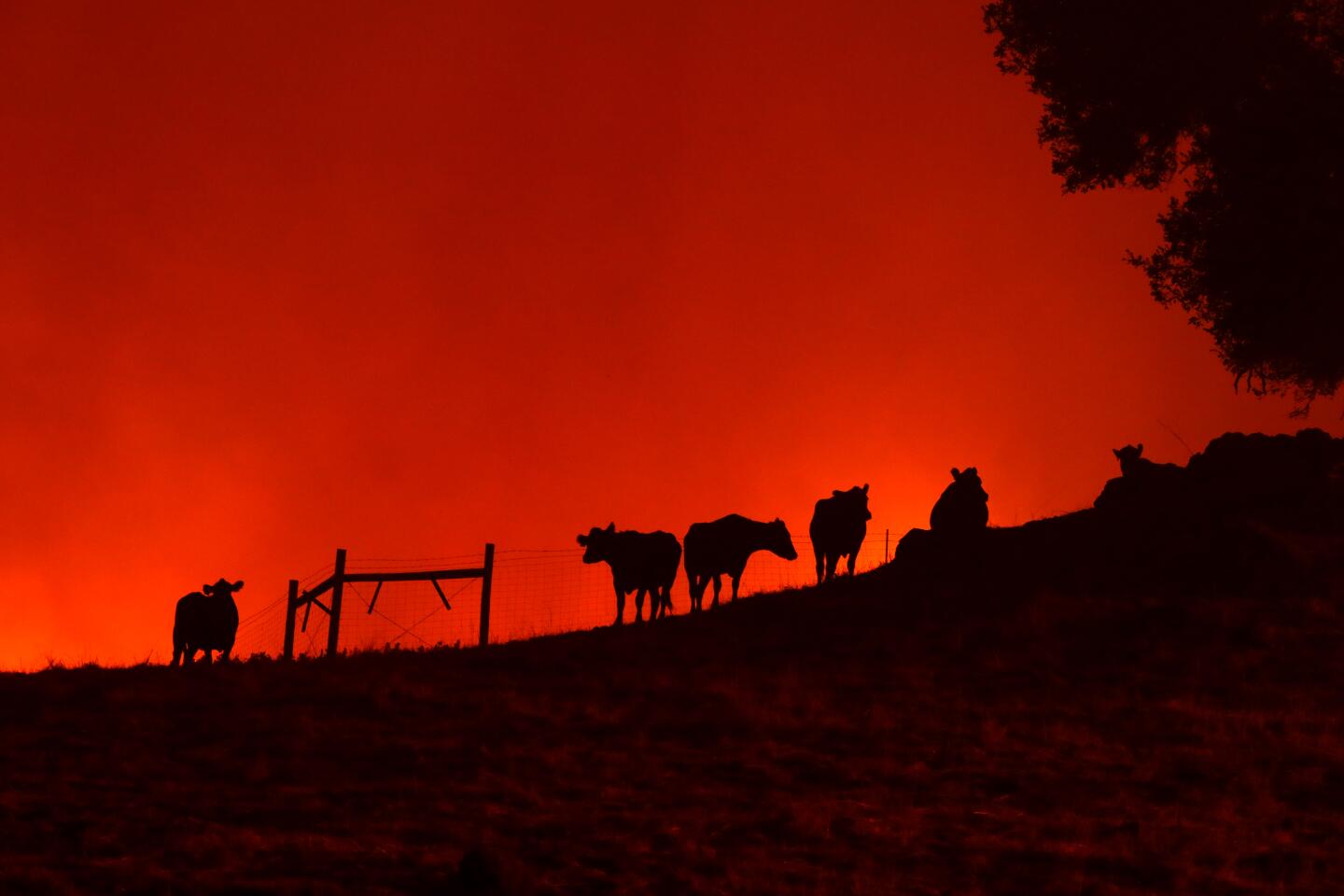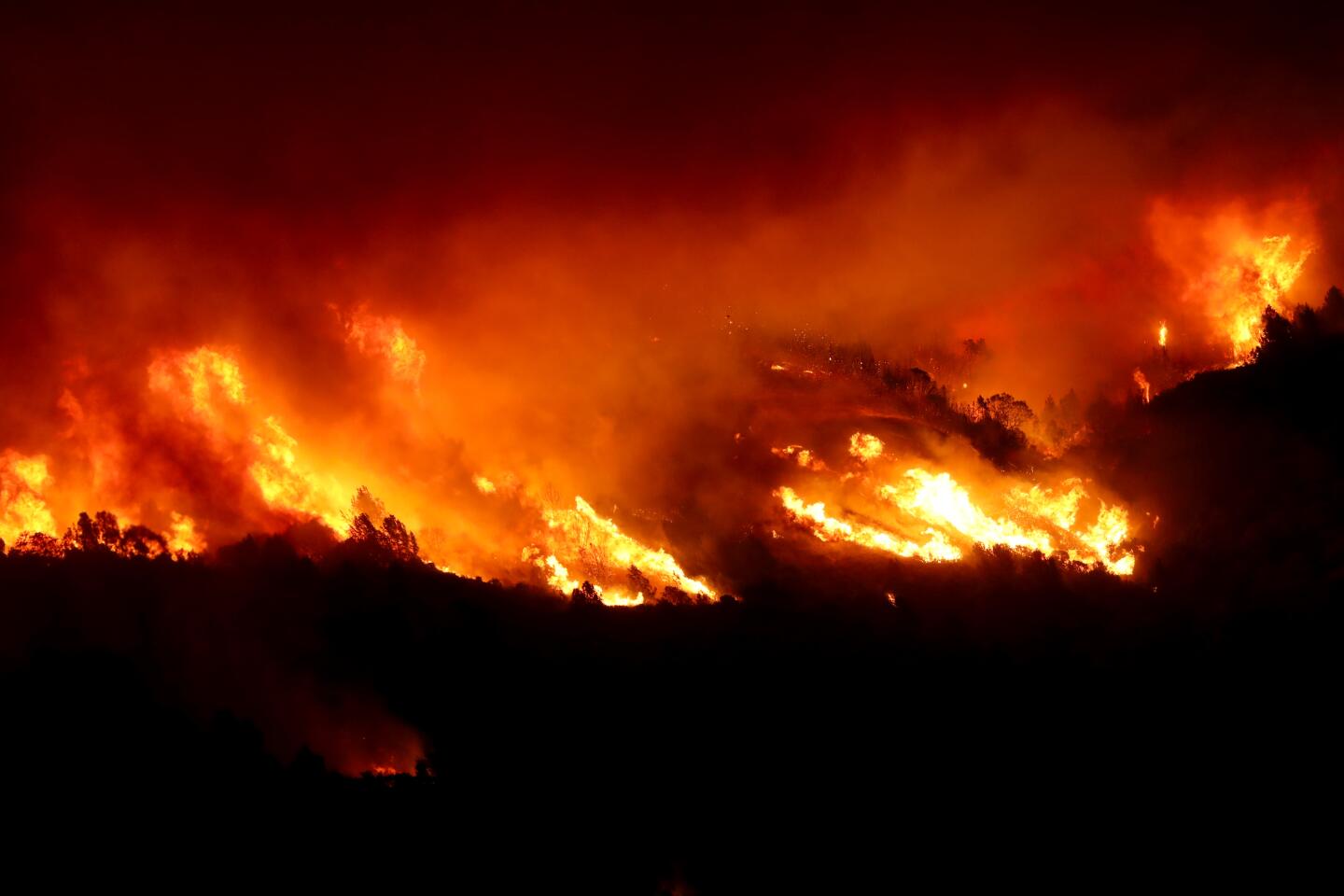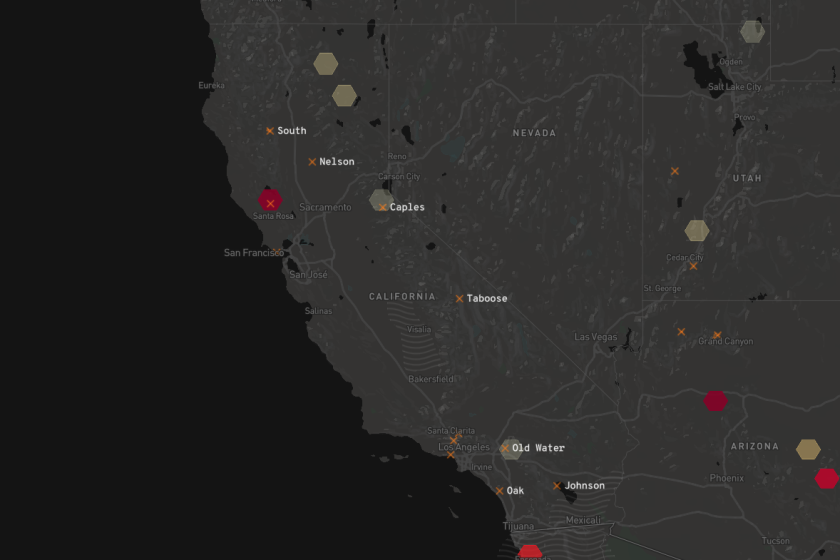Tick fire in Santa Clarita Valley is burning homes and threatening neighborhoods

A wind-driven brush fire forced thousands of residents in the Santa Clarita Valley to evacuate Thursday, leaving many wondering whether they had a house to come home to.
Firefighters desperately tried to stall the fast-moving Tick fire as it moved rapidly toward subdivisions in Agua Dulce. Authorities asked for more air support as the fire sped down hillsides, fed by 20 mph sustained winds and gusts of up to 40 mph.
By early Thursday evening, an estimated 50,000 residents had evacuated, and more than 500 firefighters were battling the blaze with the help of six helicopters and four fixed-wing air tankers.
L.A. County Fire Chief Daryl Osby cautioned residents in and near the evacuation zone not be lulled into a false sense of safety if they couldn’t see flames from their homes.
“There are plenty of hot spots out in the incident,” Osby said during a news conference. “We’ll have firefighters out all night trying to work on those hot spots and trying to work on increasing our containment line.”
Several structures have been damaged or destroyed, according to the county Fire Department.
Early in the fire’s progression, multiple lines of fire made runs at neighborhoods, racing through open space and to the backyards of homes. Some residents could be seen using garden hoses to try to keep the fire away from their homes. But in some cases, the homes went ablaze.
The fire moved parallel to the 14 Freeway and Sierra Highway toward Mint Canyon and Agua Dulce.
The Santa Clarita neighborhood of Canyon Country was one community in the fire’s path.
Canyon Country resident Marcia Armijo, 60, left her office at the Los Angeles County Sheriff’s Department early Thursday for a doctor’s appointment. The staff there told her to evacuate — and fast.
“I rushed home and started gathering all the important papers,” she said.
She packed an overnight bag and got her cat, Maxwell, and her dog, Hope, ready to leave.
“The fires have gotten close, but never like this,” said Armijo, who has lived in Canyon Country for 20 years. “I have no idea if my house is burning down right now.”
Late Thursday evening, firefighters from the Santa Monica Fire Department hosed down the garden of a home in the Sierra Hills neighborhood. Embers had flown into the neighborhood, burning down a greenhouse and playground area of the home near the hillside that surrounds the cul-de-sac on Kenroy Avenue. Residents on Kenroy kept a watchful eye for any flare-ups on the hillside and passed the time with cups of wine and beer.
On Shadyview Drive, a family was contemplating whether they should evacuate with their RV for the night or stay put, even though the flames were no longer immediately visible from their home.They were waiting for one more family member to return but had loaded the RV. Nearby, firefighters checked backyards and extinguished hot spots.
At 10:30 p.m., Sierra Highway was closed to the public and pitch black, save for clusters of firefighters resting along the shoulders of the road.
On Sand Canyon Road, which snakes up through the hills, small fires burned along the guardrails, and ash rained down on the roadway. Moderate winds gusted sporadically, sending tumbleweeds and embers flying across the road. Firetrucks raced up the hills and helicopters roared overhead.
At Sierra Heights Mobile Home Estate, many residents appeared to have evacuated. Decorative wind chimes and crackling fire nearby pierced the silence. Flames glowed on the hills to the east and in the canyons below.
Less than one-quarter mile southwest of that community, a hilltop was glowing. The remnants of one home were still burning early Friday morning. A white sign at the home’s entryway reading “La Granja,” or “The Farm,” had fallen from its post. It appeared the fire came quickly, forcing the home’s occupants to rush to safety. Two bags of clothing were left in the driveway, still in perfect condition.
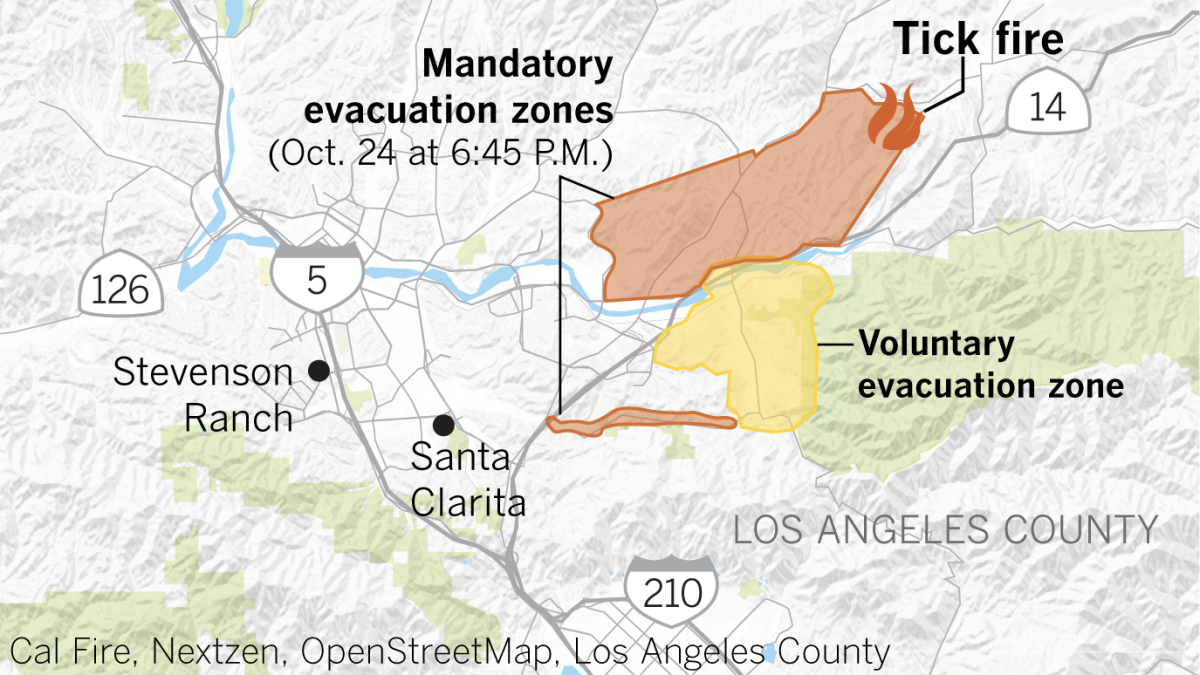
The number of homes destroyed is not yet known. Damage assessment teams will start evaluating the fire’s path and destruction Friday.
The fire was reported shortly before 1:45 p.m. along Tick Canyon Road and quickly grew to more than 850 acres, said Marvin Lim, a Los Angeles County Fire Department spokesman. By about 2:20 p.m., firefighters had called for more resources because the blaze was threatening homes.
By 4:40 p.m., the fire had grown to just under 4,000 acres, with no containment.
“We’re doing everything possible to reduce the spread,” said Sean Rios, a spokesman for the L.A. County Fire Department. “The wind is a major factor. All ground and aerial resources are being utilized to the best of their capabilities, but we’re going to be here for a while.”
Shortly before 3:30 p.m., firefighters reported a separate, three-acre blaze that was also threatening structures near the 5 Freeway and Lake Hughes Road in the Castaic area, several miles west of the Tick fire. About half an hour later, authorities declared that the blaze was being managed as a branch of the Tick fire. A third fire broke out near Val Verde off the 5 Freeway.
Firefighters were trying to protect homes in the area of Fitch Avenue and Sierra Highway, but the blaze was “outpacing the evacuation efforts,” the L.A. County Fire Department said in an alert. There were no immediate reports of injuries, though some residents ran for their lives as the fire approached their homes.
Evacuations were being ordered from east of Sierra Highway all the way to Soledad Canyon Road after the fire jumped Sand Canyon Road.
Those included mandatory evacuation orders for homes between Soledad Canyon Road and Shadow Pines Boulevard along the 14 Freeway and along Davenport Road east of Sierra Highway.
Mandatory evacuation orders also were issued for homes south of Vasquez Canyon Road, north and east of Plum Canyon Road, north and east of Whites Canyon Road, north and east of Soledad Canyon Road, and in the Sand Canyon area.
Despite living less than three miles from where the Tick fire erupted, neighbors David Diaz, 78, and Cathy Trope, 52, decided to stay put.
Support our journalism
While cars passed his home on Davenport Road in Agua Dulce, heading away from the fire, Diaz explained that he didn’t think his house was under threat yet.
“I’m planning on staying,” he said, putting a finger in the air to demonstrate how the wind was blowing in the opposite direction.
Trope, who runs a pony rescue at her home, said she had received a text earlier saying that everyone on their street needed to evacuate. But she said she wasn’t worried. She has seven horses on her property and said that if the fire got close, she could pack them up in no time.
“I can leave at any point,” she said. “I could put the horses in the trailer and leave in five minutes.”

The Red Cross set up an evacuation center at College of the Canyons in Valencia.
In the campus gym, dozens of cots were erected; packages of Huggies diapers and Cheez-Its lined the walls.
Outside, Alice and Anthony Mercado sat on the curb. The two had been packing up their truck, just in case, when ash and embers began to settle on the lawn of their two-acre ranch. A sheriff’s deputy told them to leave.
“The fires were coming from all directions,” Alice Mercado, 56, said. “It’s not so much the flames, it’s the smoke — and the stress on these little guys,” she said, gesturing to the three shepherd dogs in the hatch of their pickup truck.
“I think the house will be OK; don’t you think, Anthony?” she asked.
“Hoping and praying,” he said.
In Santa Clarita, Steve Silveri, 63, was working out at home around 2 p.m. when the sound of helicopters led him to pull up the window blind. A fire raged on a hillside about five houses away.
“You couldn’t breathe,” he said, standing at an intersection a short walk from his home. “It was all black — gray, black smoke.”
After receiving two automated phone messages with mandatory evacuation orders, Silveri and his wife, Robin, packed their car with clothes and left. On the way out, they changed their minds. Seeing police, they feared it would be hard to return home, so they turned around.
Wearing a paper mask around her mouth to protect against the smoke, Robin Silveri said, “I’m ready to leave my home but I’m hoping I won’t have to.”
The blaze forced the closure of all northbound lanes of the 5 Freeway at Hasley Canyon, the California Highway Patrol said. By 6:40 p.m., all lanes were reopened, according to the California Department of Transportation.
Because of concerns over air quality and safety, thousands of students across the region will stay home Friday.
All schools in the William S. Hart Union High School District, Newhall School District and Saugus Union School District will be closed Friday. Additionally, all public schools in the San Fernando Valley and Malibu will be closed.
The Los Angeles Unified School District announced the decision to close the Valley’s 200-plus schools just after 8 p.m. Thursday. Community Elementary, Roscomare Road Elementary, Topanga Elementary Charter, Valley View Elementary, Wonderland Avenue Elementary and Elementary Day School will also be closed. The district urged those who attend independent charter schools to check directly with their schools for information on potential closures.
The Los Angeles district’s decision earlier this month to keep as many Valley campuses open as possible during the Saddleridge fire posed a major problem for teachers and staffers who could not make it to work because of road and freeway closures.
All L.A. Unified athletic activities scheduled for Friday will be canceled or postponed, including City Section football games. Games could be rescheduled for Saturday or Monday.
In Malibu, after school activities, including a middle school dance, will be canceled, the Malibu Times reported.
Weather conditions near the fire were helping to foster its growth Thursday with a combination of warm temperatures, humidity hovering around 6% and wind gusts of up to 29 mph, said Keily Delerme, a meteorologist with the National Weather Service in Oxnard.
The warmth, in particular, was causing the blaze to send up a large plume of smoke, she said.
“That’s why the plume looks so impressive, because it’s very warm near the fire,” she said.
Forecasters expected the winds to pick up through the evening and overnight, with gusts of 40 mph to 60 mph in the area of the blaze.
Temperatures were also expected to be a bit warmer Friday, and humidity was expected to stay low.
“We’re not going to see that much humidity recovery overnight, which is what normally happens,” Delerme said.
The National Weather Service had issued a red-flag warning for the area that was in effect through Friday evening. The weather conditions were expected to peak overnight Thursday and continue through Friday.
It wasn’t immediately clear what caused the blaze, which was burning in an area where power companies preemptively turned off electricity in an attempt to avoid sparking a fire.
Southern California Edison de-energized its power lines in the Tick Canyon Road area about 8:50 a.m. Thursday, said Lois Pitter Bruce, a company spokeswoman.
The fire came on a day of dry, hot, windy weather across California. Fires also hit San Bernardino, Orange County and Eagle Rock.
In Northern California, the entire town of Geyserville and vineyards across wine country were forced to evacuate as a monster fire, pushed by wind gusts topping 70 mph, burned out of control in a rural section of Sonoma County.
Some Geyserville residents evacuated in the darkness after Pacific Gas & Electric Co. shut power off to areas in Sonoma County and the Kincade fire crossed California 128, moving west toward homes in the town of 929 people. More than 16,000 acres burned there.
Times staff writer Julia Wick and freelance photojournalist Patrick Fallon contributed to this report.
More to Read
Sign up for Essential California
The most important California stories and recommendations in your inbox every morning.
You may occasionally receive promotional content from the Los Angeles Times.
